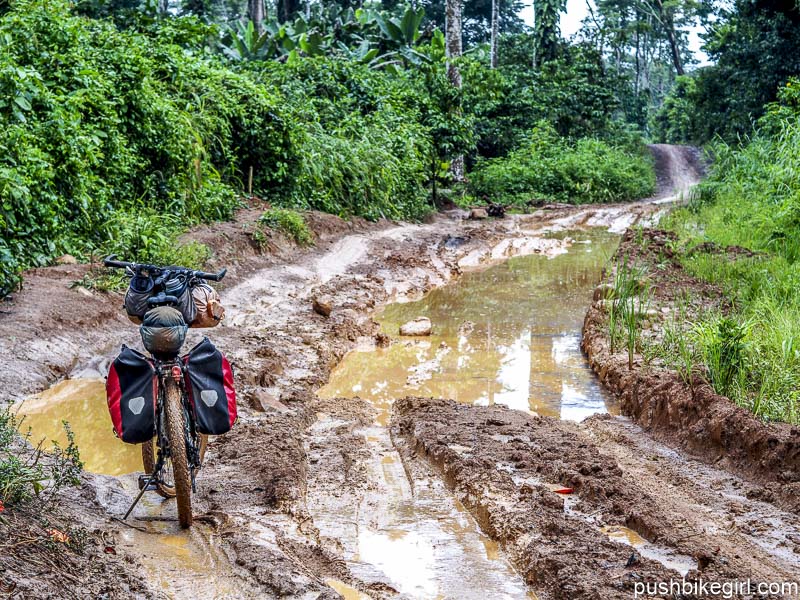
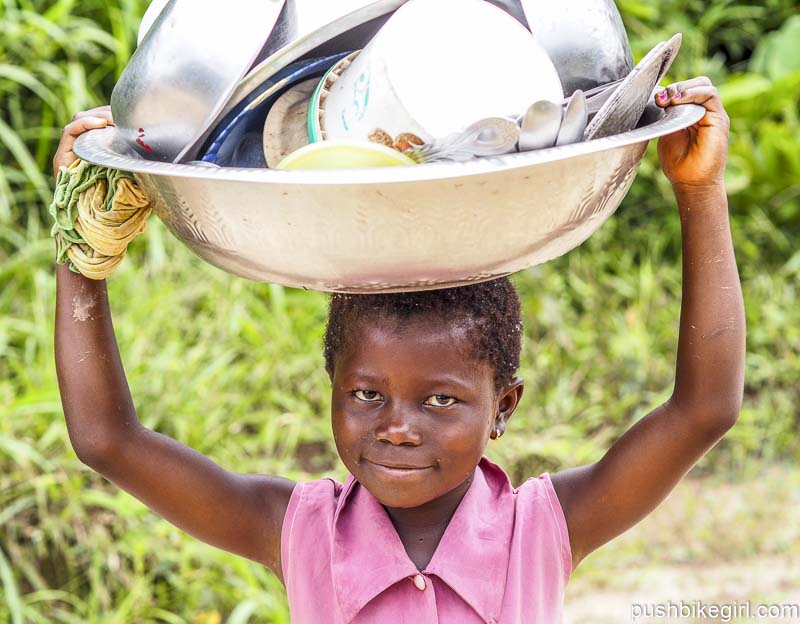
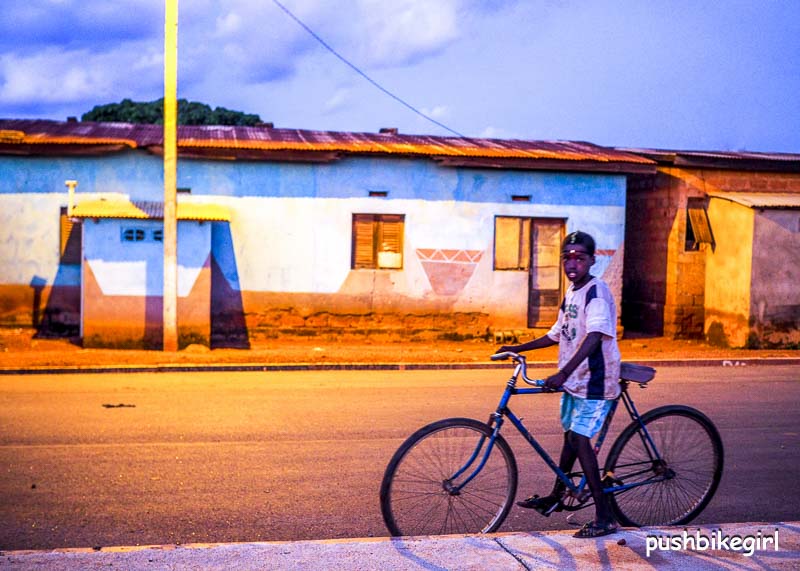
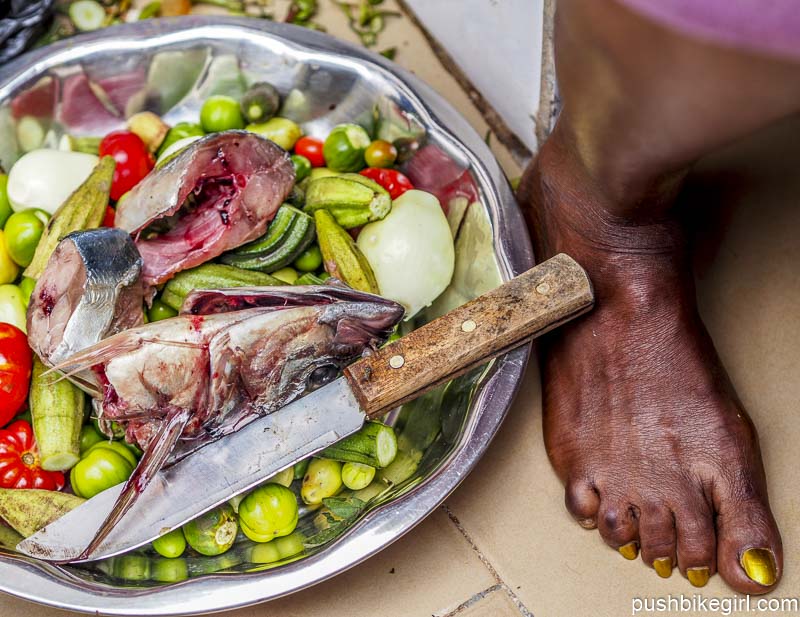
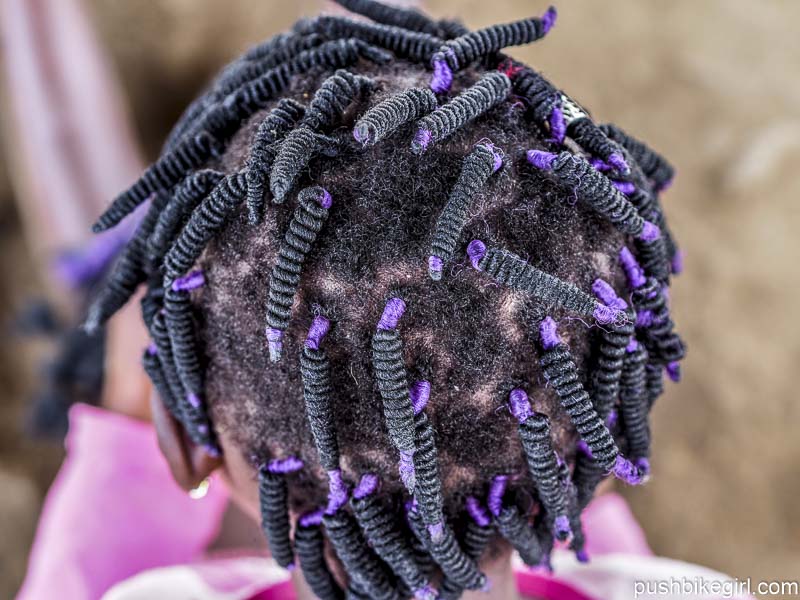
“Bonjour Madame, please wash your hands here,” were the first words I heard in the new country. Wow, these are completely new methods, which gave me some hope to find better hygienic conditions. As you know, hope dies last.
The border policeman took pictures of me from all angles, checked my vaccination card for a recent yellow fever vaccination, stamped my visa, played being important, but after all, he wished me a good time and I was quickly on my way again.
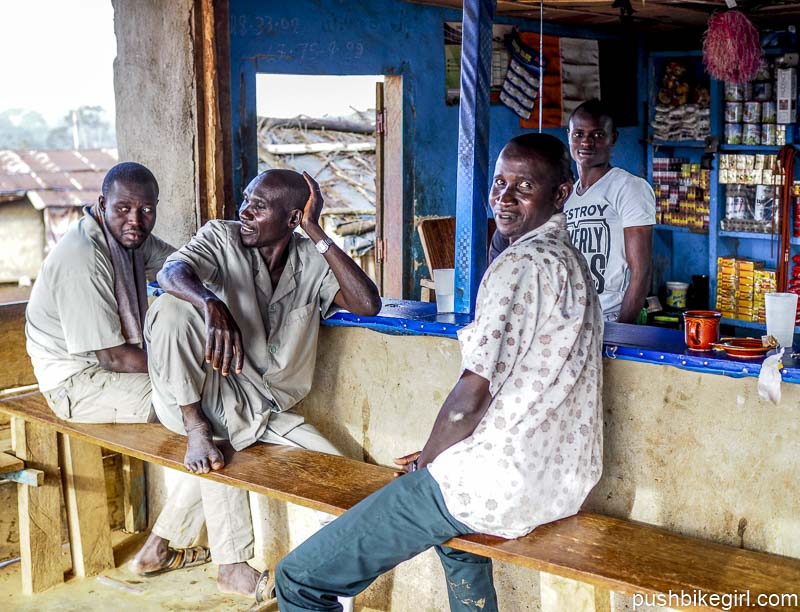

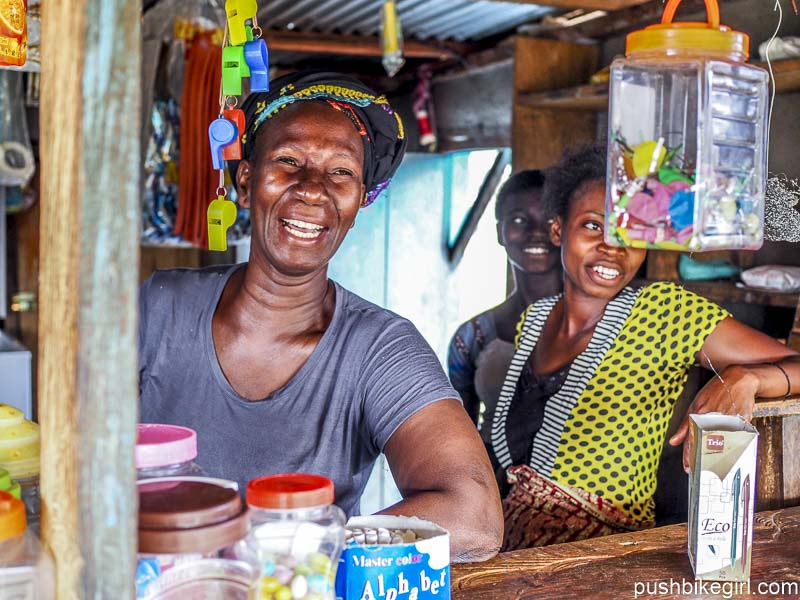
I celebrated entering into the hundredth country of my life with a tea, milk powder, some sugar, and some rattling African hip-hop music, which one of the boys sitting around the coffee-tea-spaghetti stand played from his little jukebox.
What was striking from the beginning was that people were consuming something, because they weren’t just sitting around the tea shop for entertainment and meeting, like before in Liberia or Sierra Leone, no, they also had some money to drink and eat.
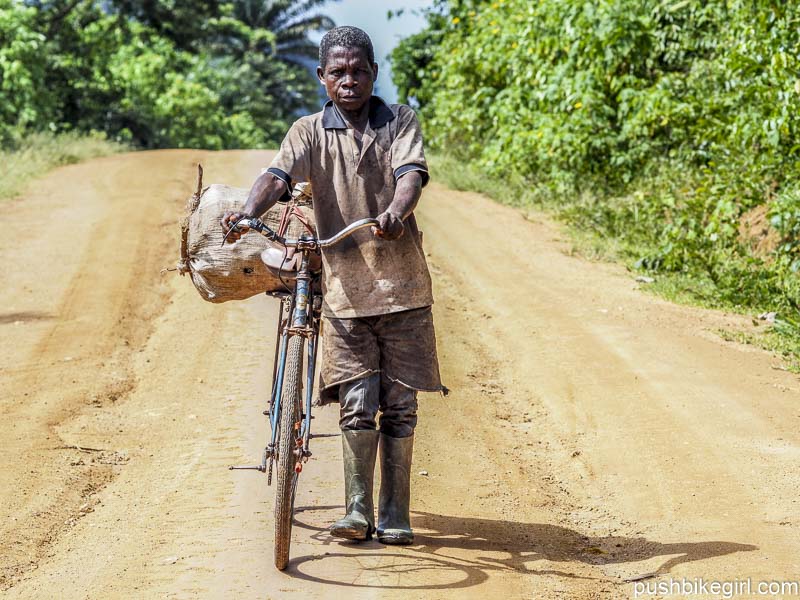
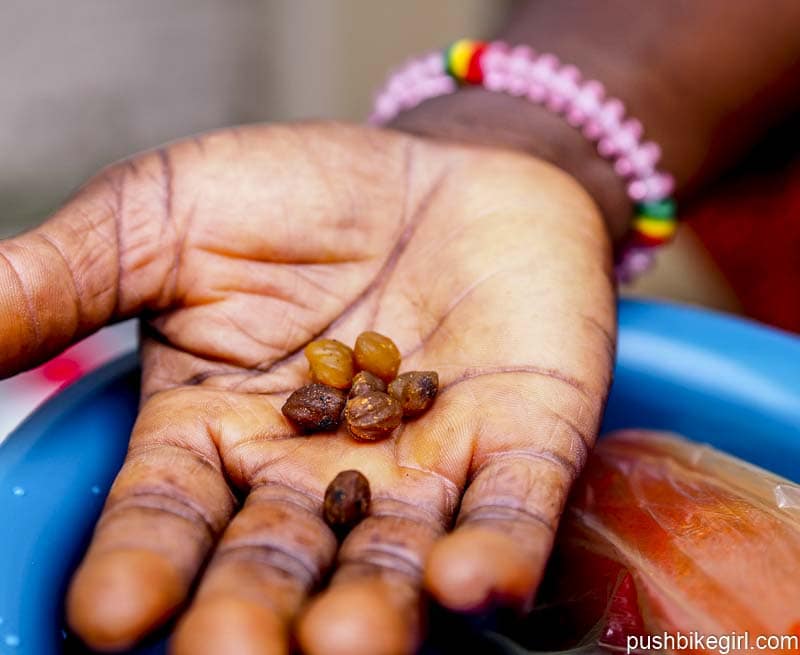
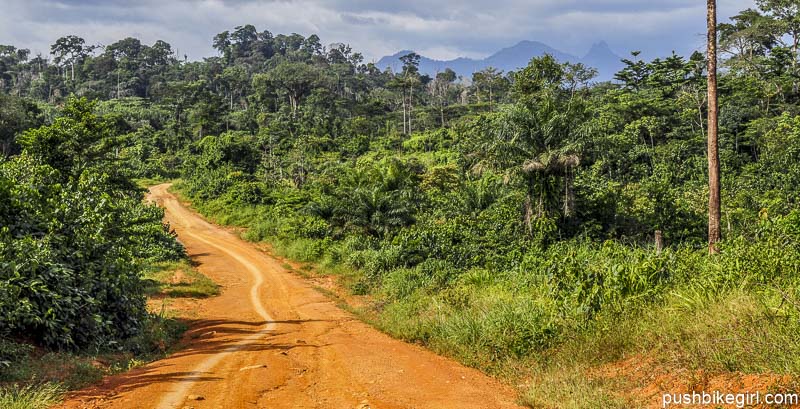
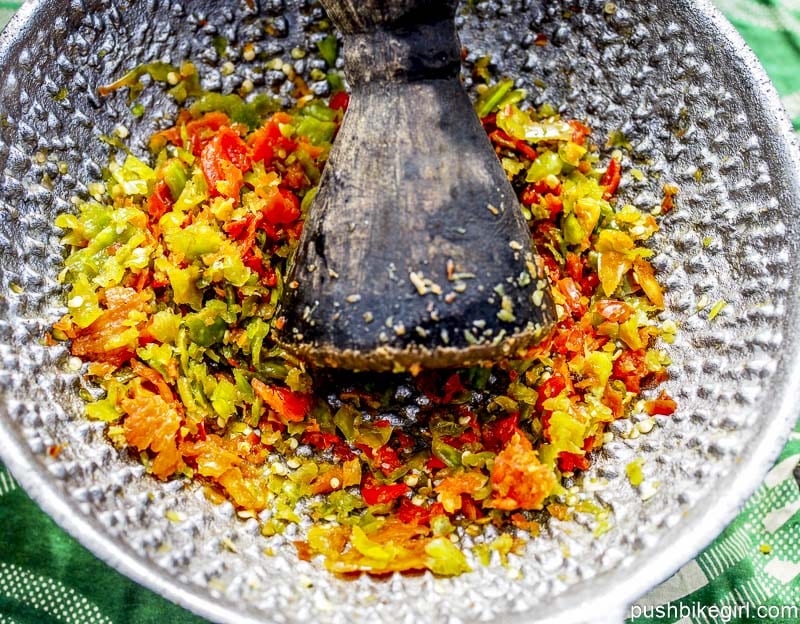
It wasn’t far to Danane, the first bigger town just behind the border. (MAP)
In Danane, I wanted to meet Chi, a Chinese motorcyclist who had brought me some things from Europe. Facebook made it possible.
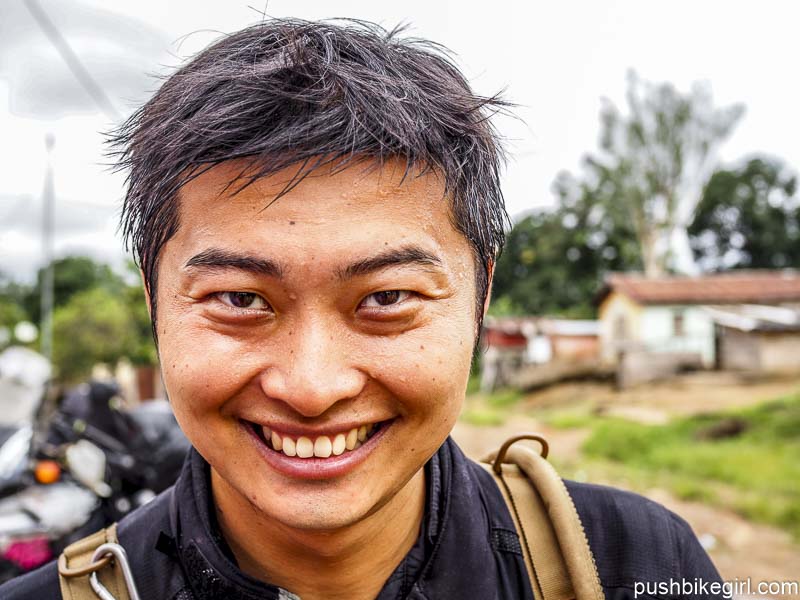
A super nice lady invited us to her hotel and I was immediately thrilled I had something else on my plate than just rice and sauce.
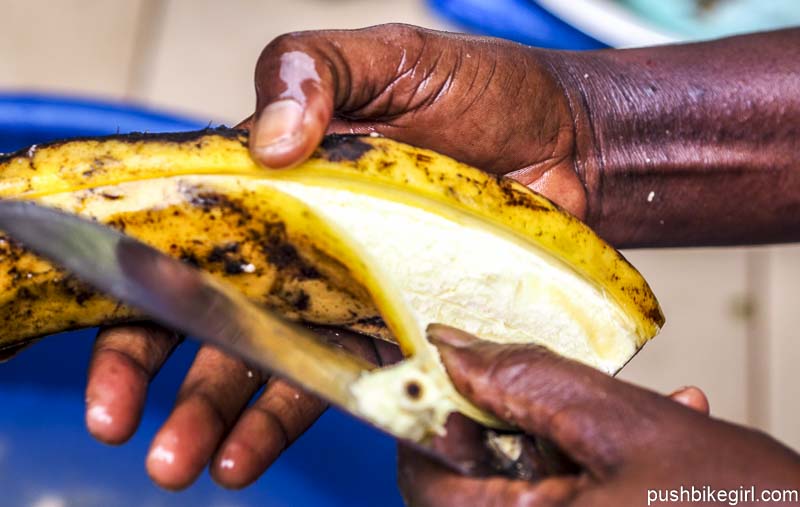

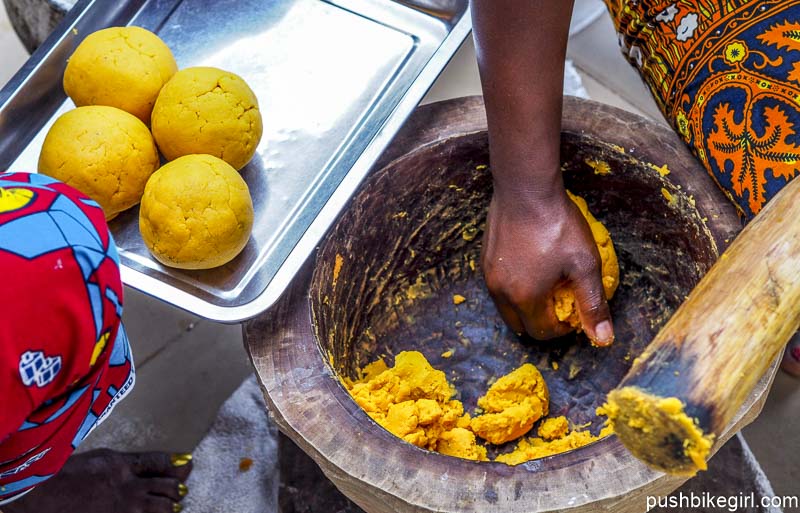
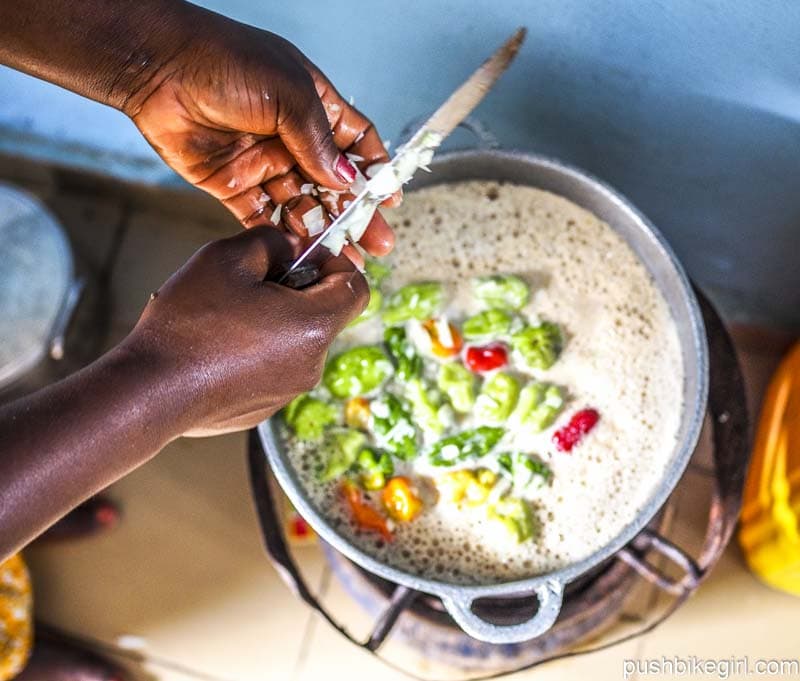
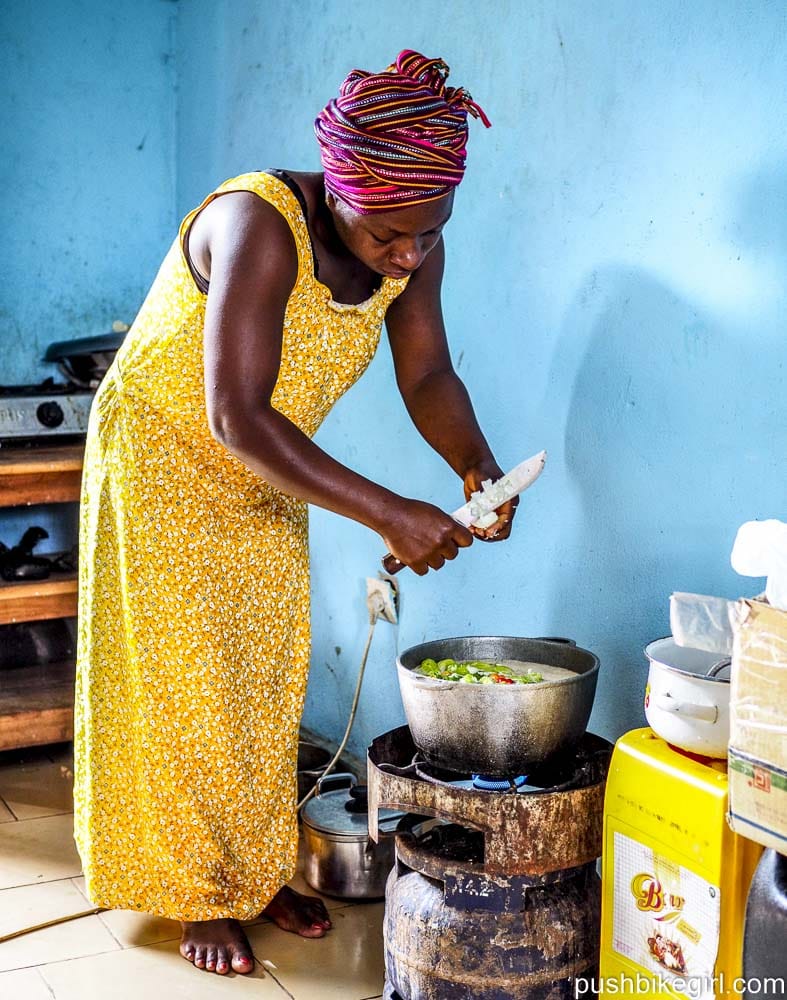
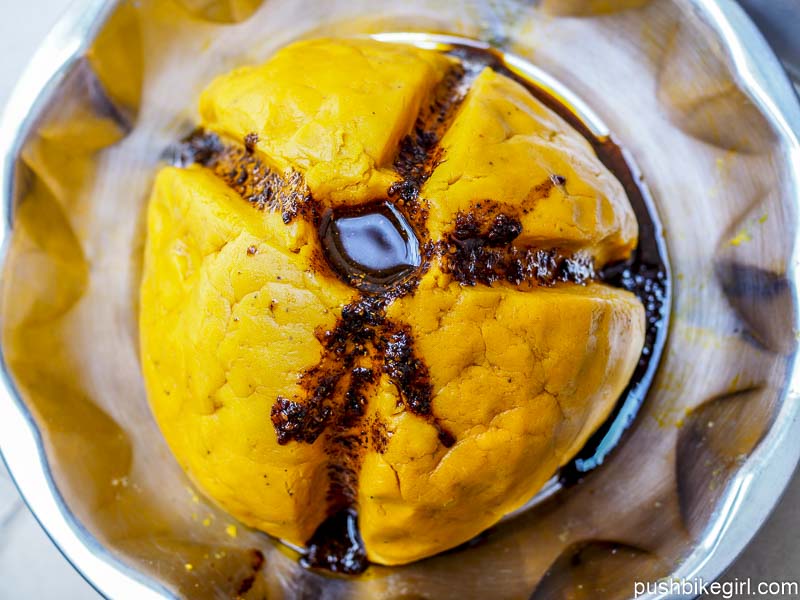
Fufu is the name for the pounded plantain dumplings — Futu when manioc and plantains are mashed together. Also, there is a spicy sauce – often served with peanuts, lots of chilly and bitter tomatoes. As always served with fish.
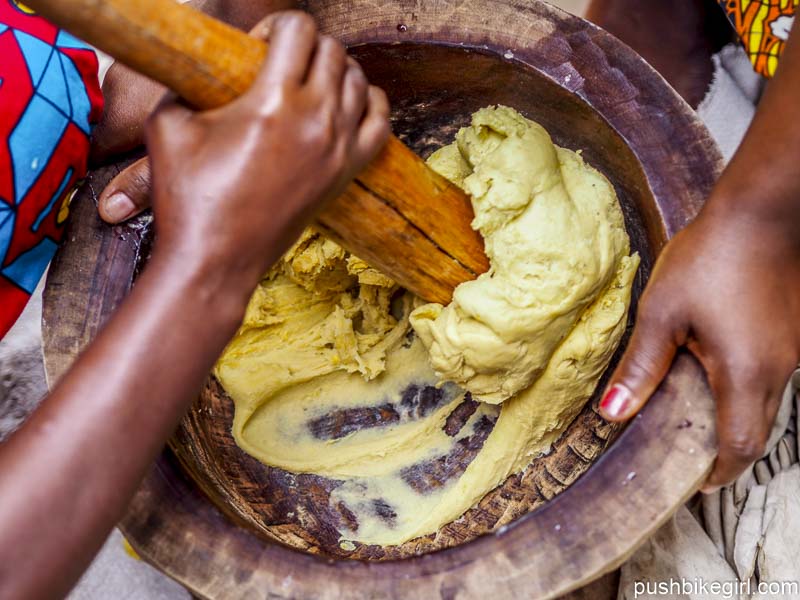
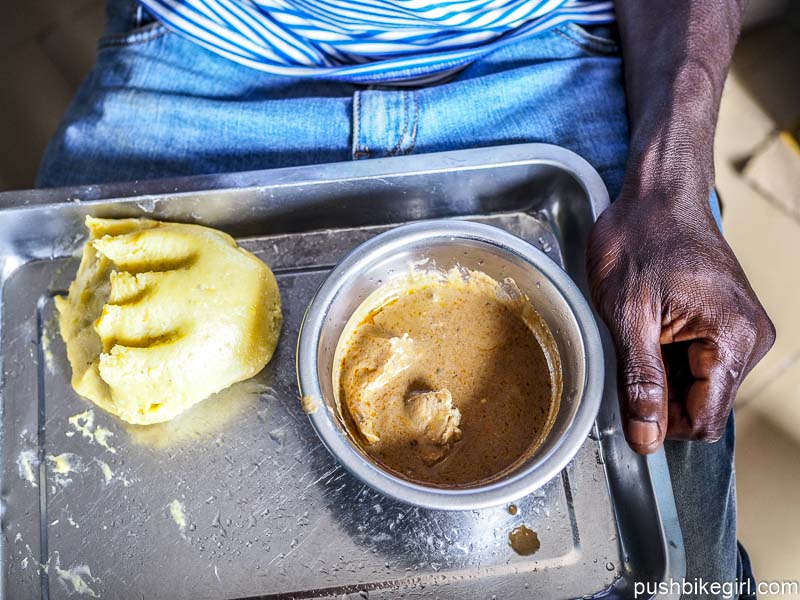
Just coming from the Lassa fever outbreak region in Liberia, a hemorrhagic fever transmitted by rats, I heard something rustling in the corner. Well, I wasn’t the only one – the hotel security guy heard the rustling too and guess what? Yup, he had rat on the BBQ for supper.
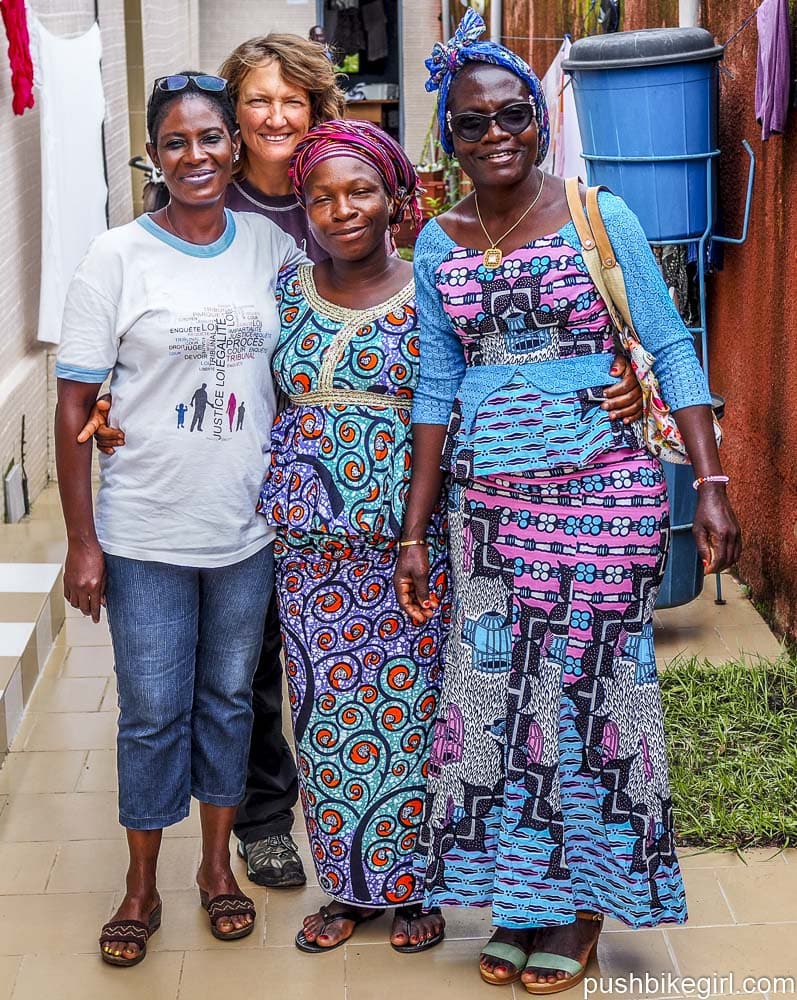
Ivory Coast has electricity. No more darkness in the towns after sunset – a new world. The country is unfortunately once again French-influenced – I think we both, the language and I, will probably never become big friends ?
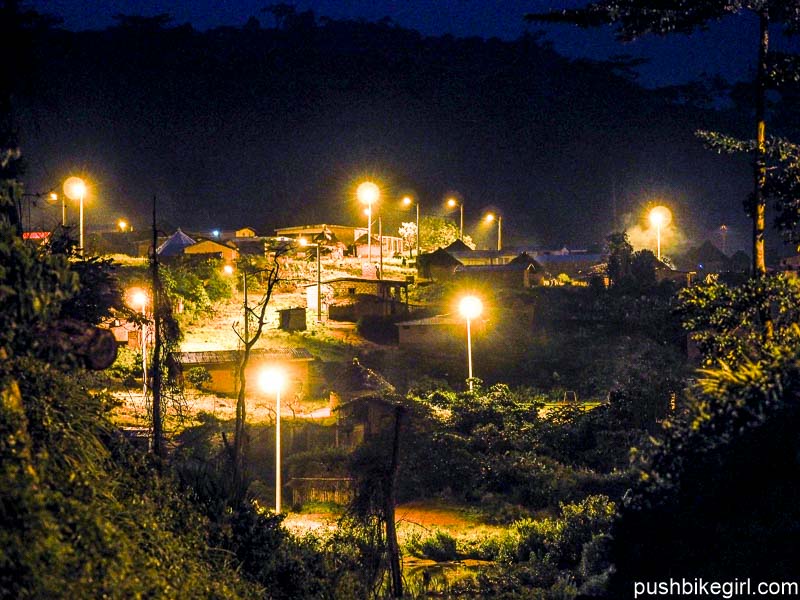
My pedal broke off, but to my total surprise, I was able to replace it quickly. There is a bike shop in Abidjan that carries parts from Europe and can send them within the country by bus transfer.
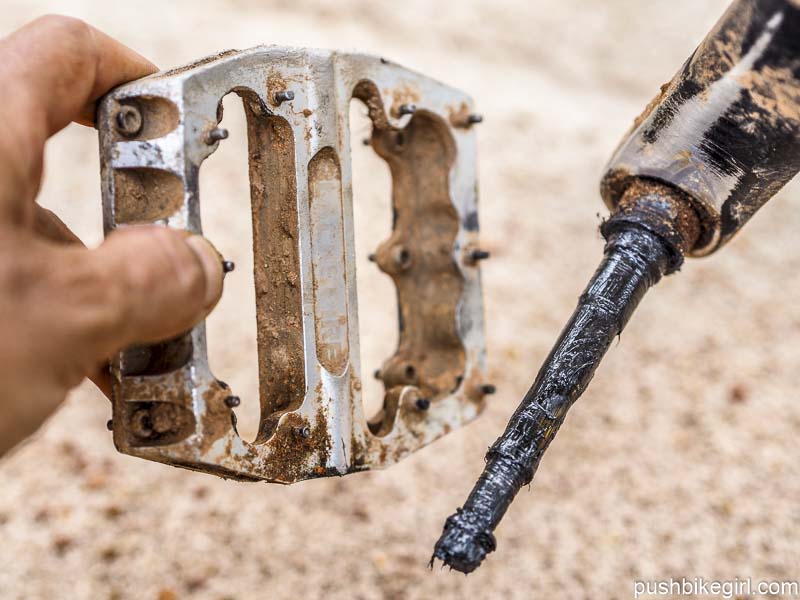
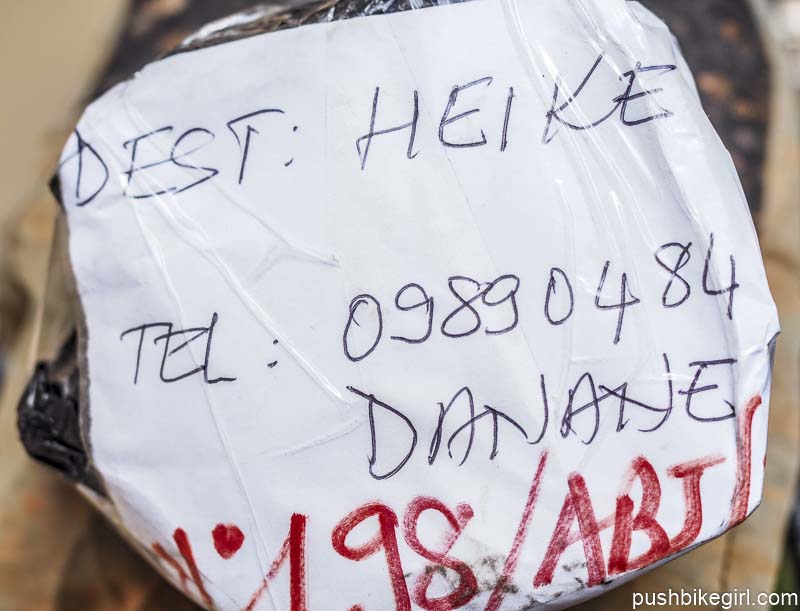
I was able to give the hotel owner the money for the pedals, and she transferred the money by telephone and three days later the new pedals arrived in Danane. Very impressive!
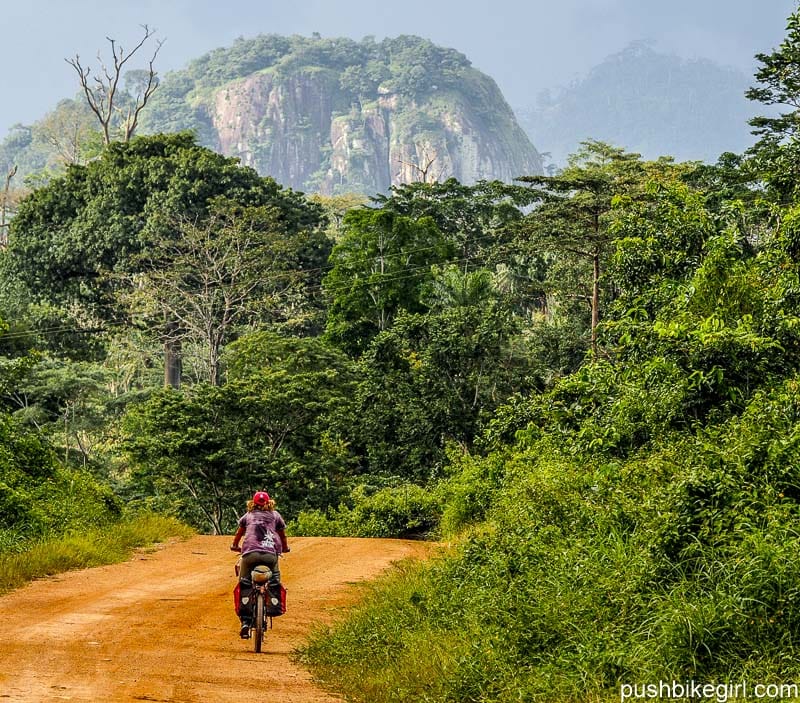
The landscape finally became more varied and beautiful. It was still raining, but much less than before–short torrential downpours, instead of continuous torrential downpours.
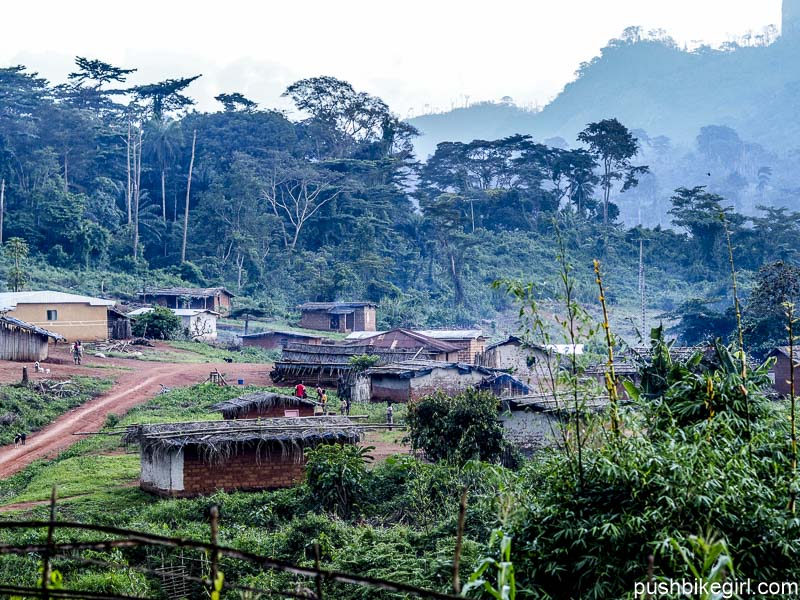

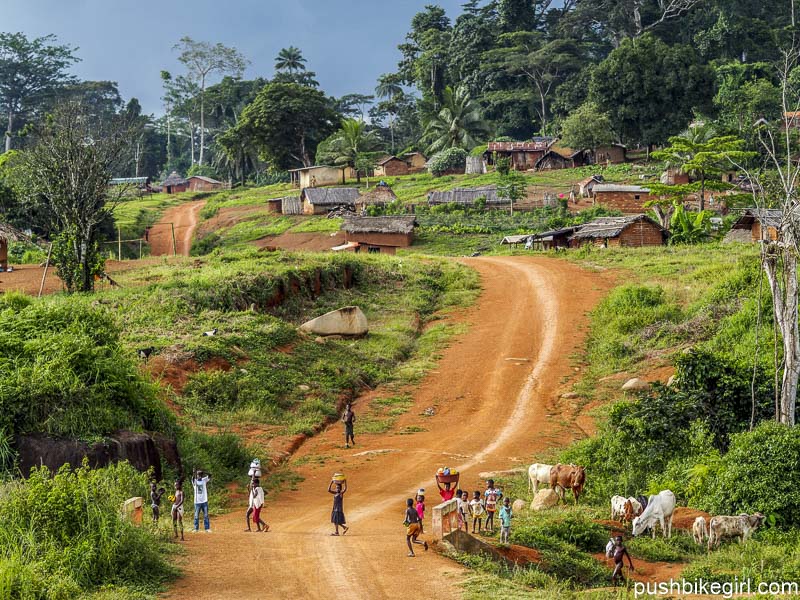
The villages were spaced a little further apart than before, so I had some time to breathe between the many encounters and the many “Ca va” calls.
Even after many months of village life, in the remotest corners of West Africa, I still enjoyed being welcomed by the clusters of extremely friendly, curious, but sometimes shy children.
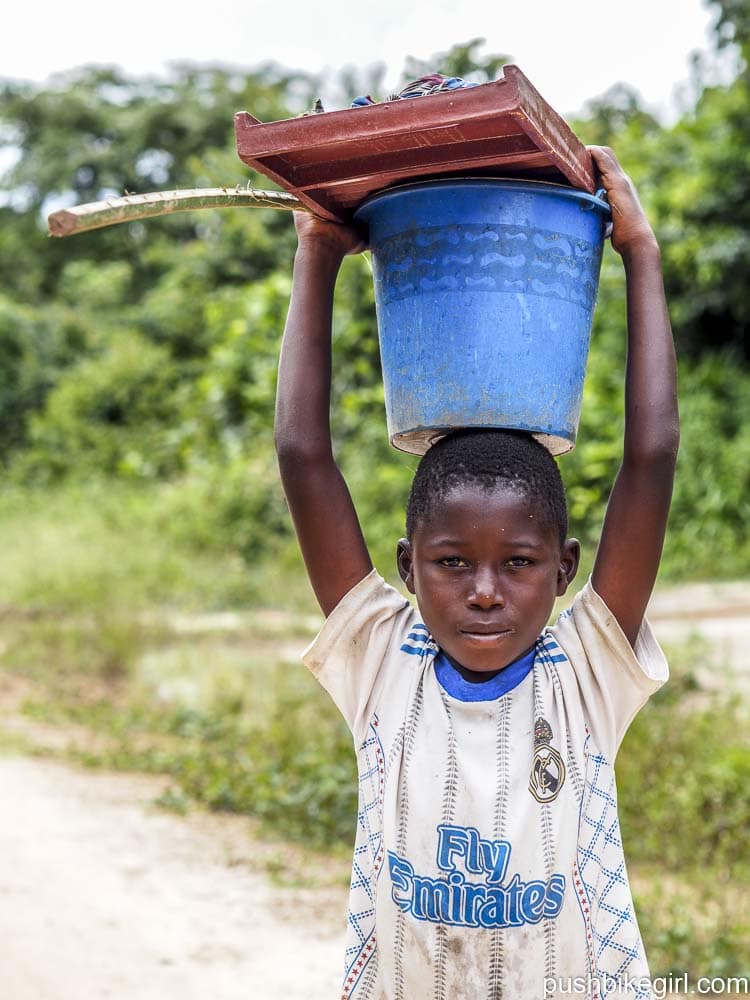
It is still something special to be the woman from the other universe. Of course, it can be annoying to always be the center of attention, but mostly it is very pleasant. I like laughing children too much to get tired of them.
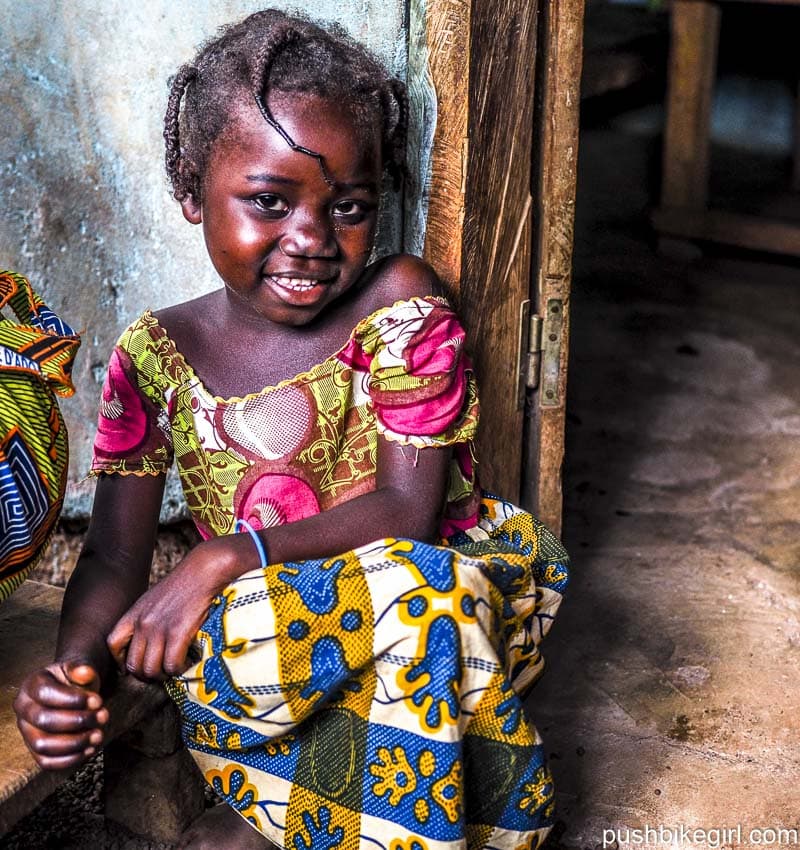
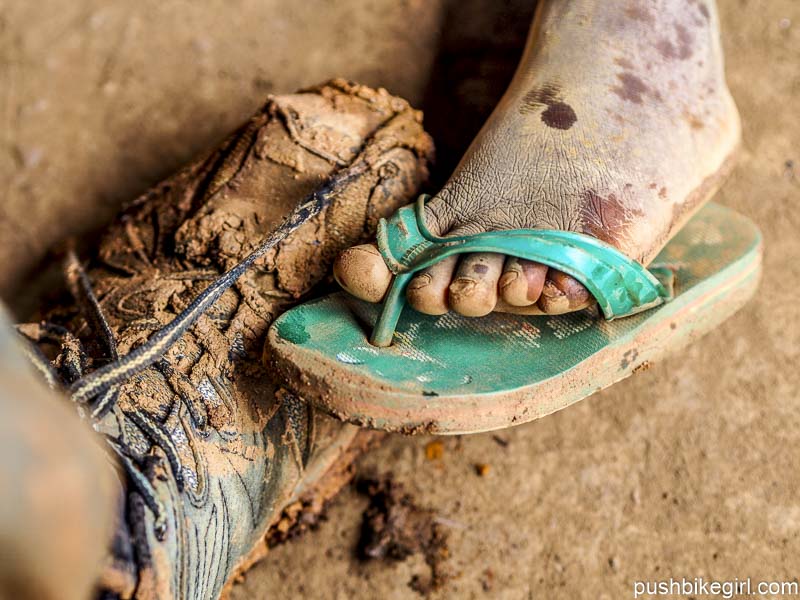
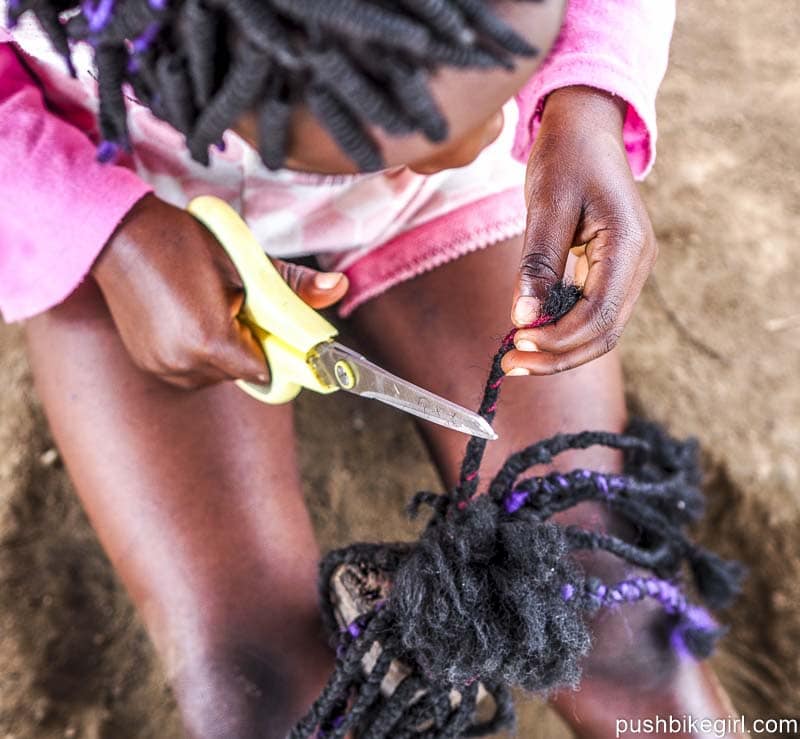
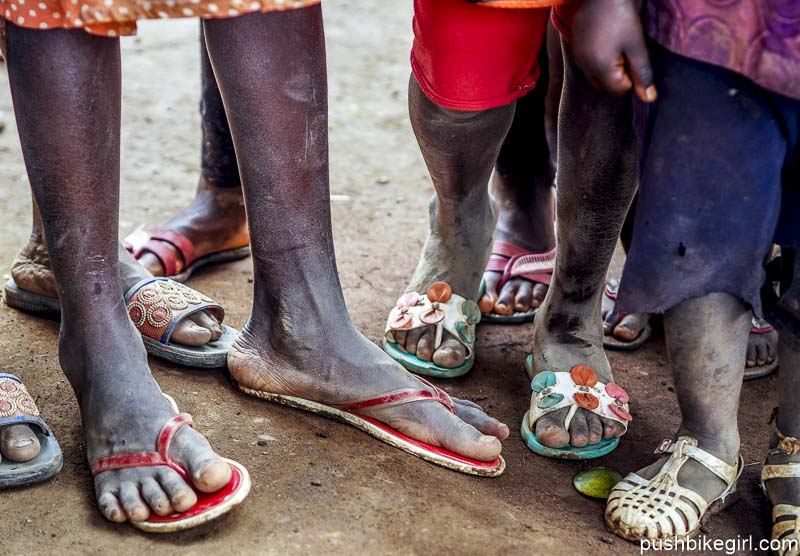
I sat in a small shop and ate Fufu and wanted to share a little bit of it with the children around me. Surprisingly, nobody wanted to eat anything. The first time that children didn’t seem to be hungry.
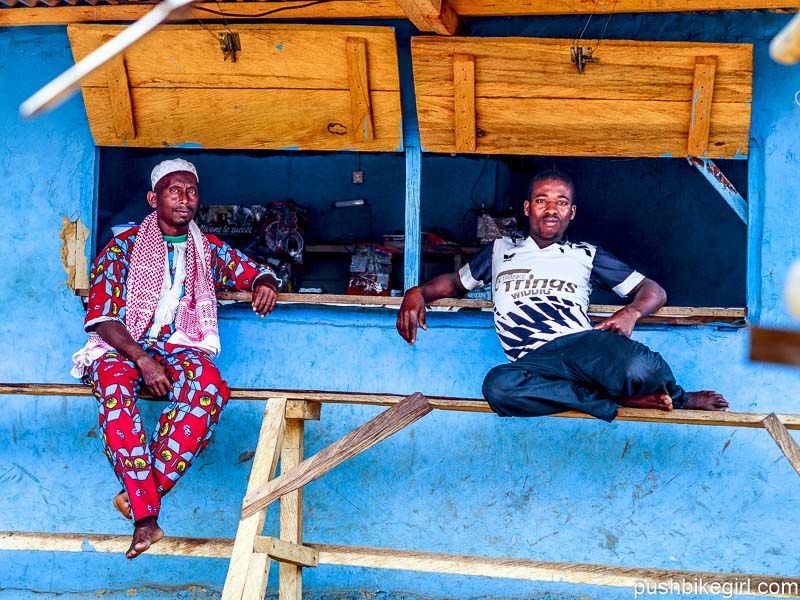
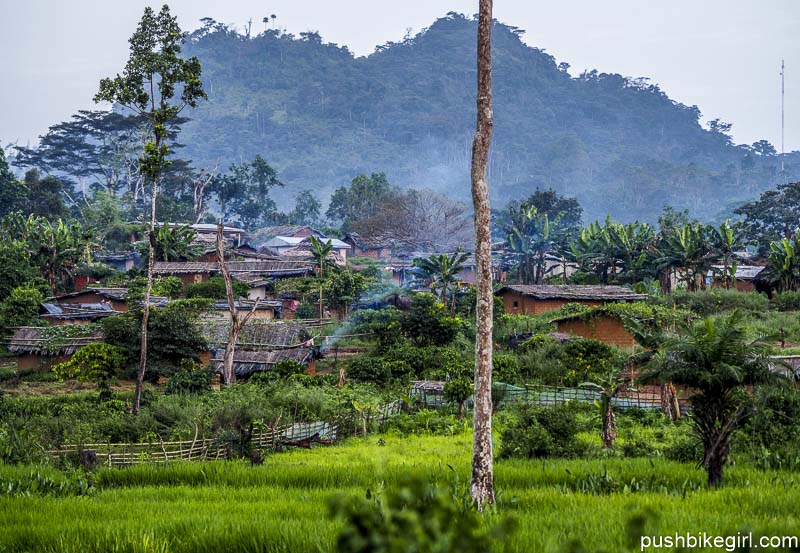
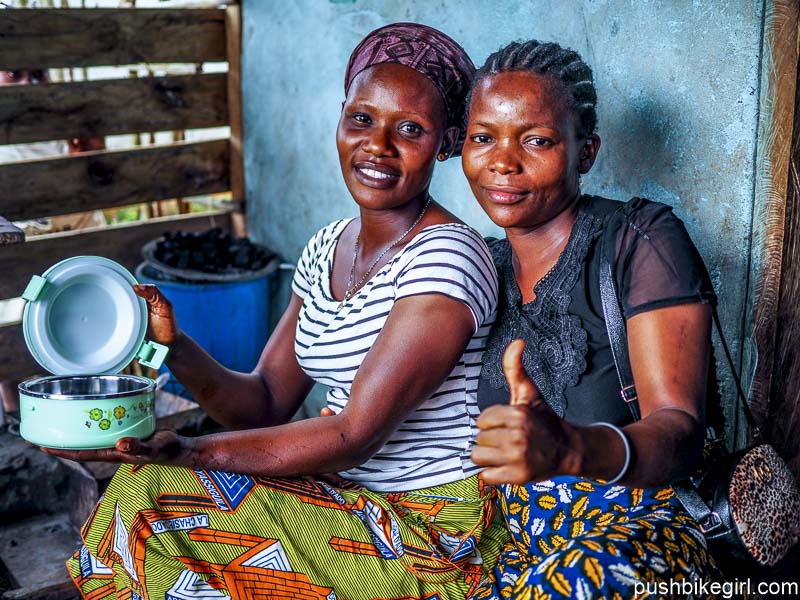
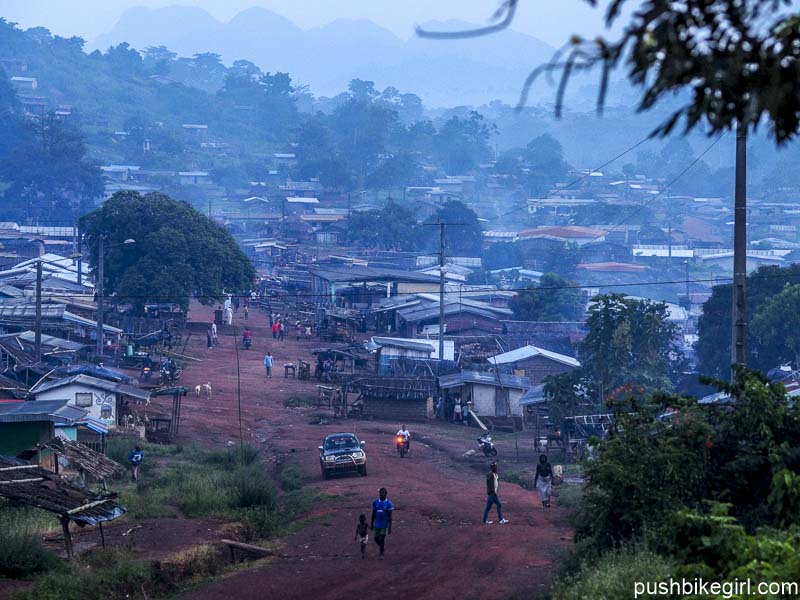
Côte d’Ivoire looked a little more prosperous at first, but in the villages, after all, it is the same as everywhere else before. But one thing is clear, Sierra Leone and Liberia were much less developed.
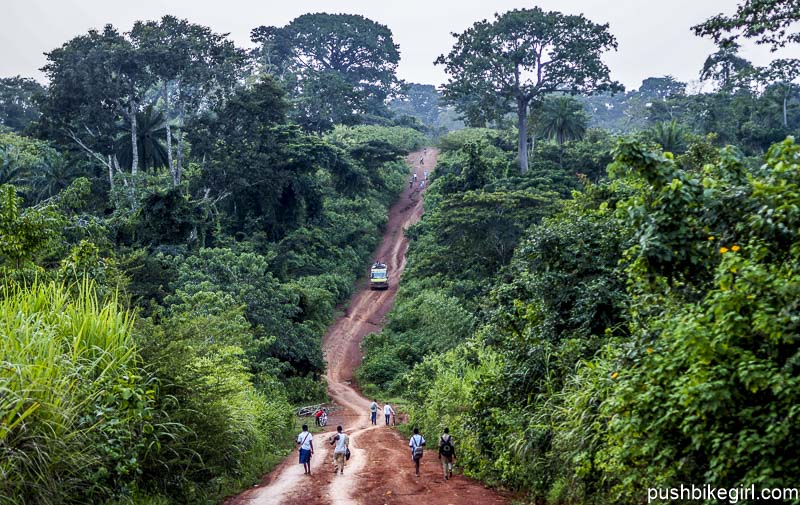
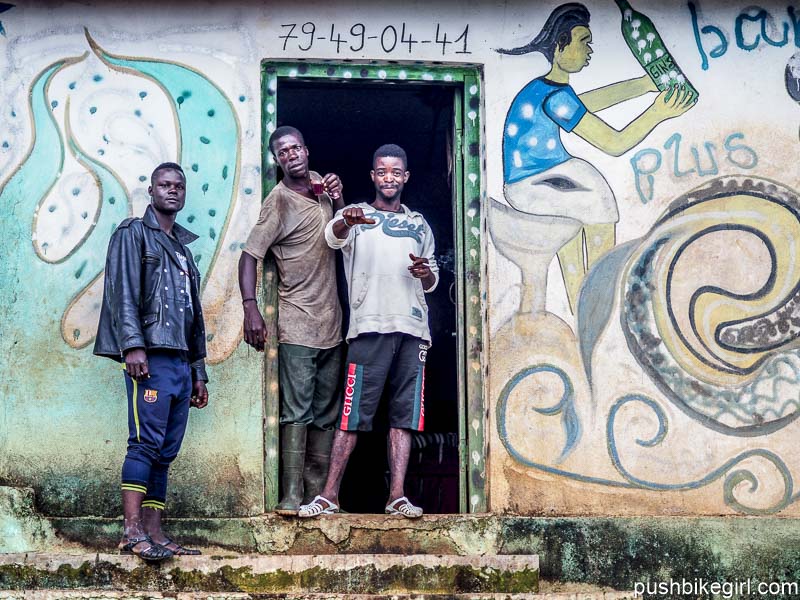
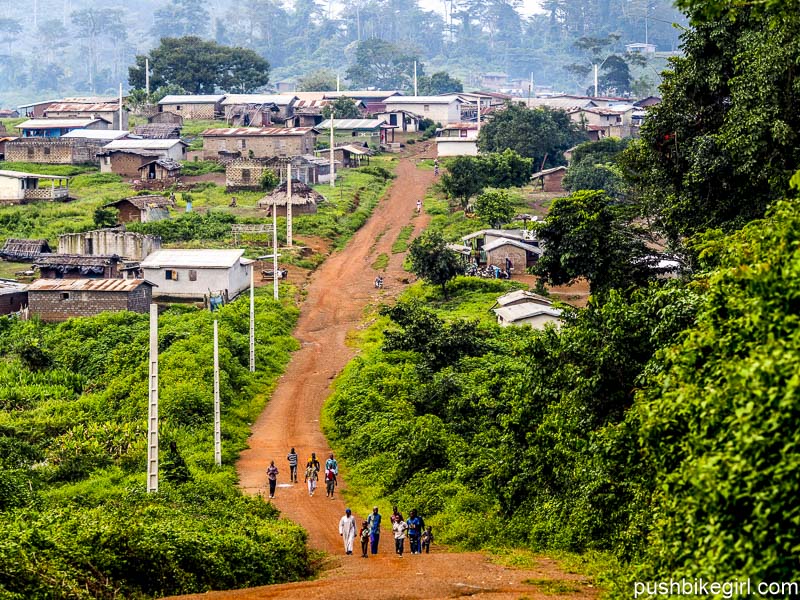
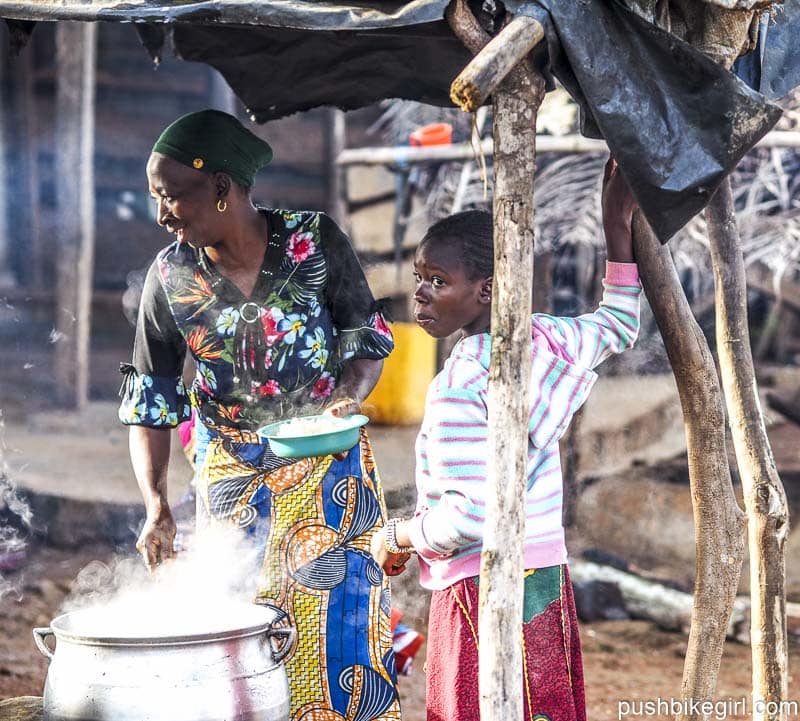
Here, too, there were sometimes people, like in Guinea, who were afraid of me. As soon as I met women outside the village who were walking alone or in a small group, I saw how insecure they became when they saw me. They often even changed direction, some walking faster and faster, others hiding in the bushes.
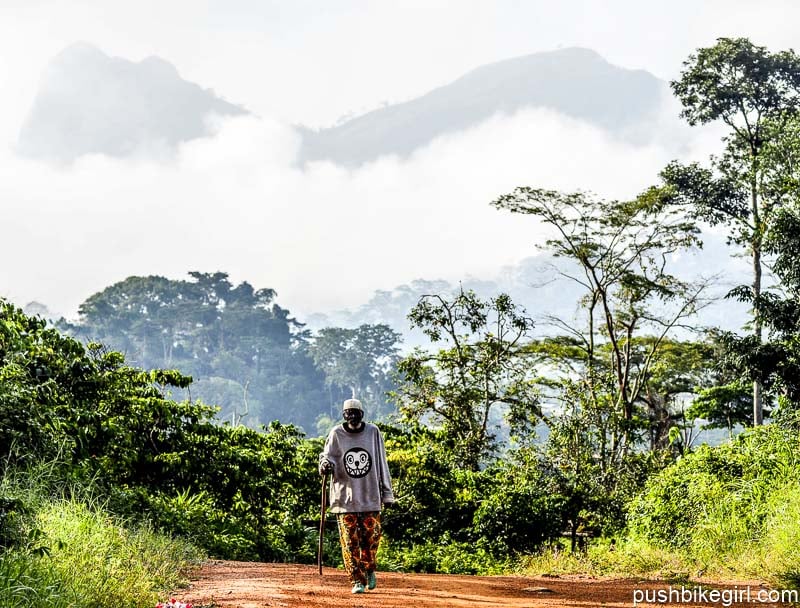

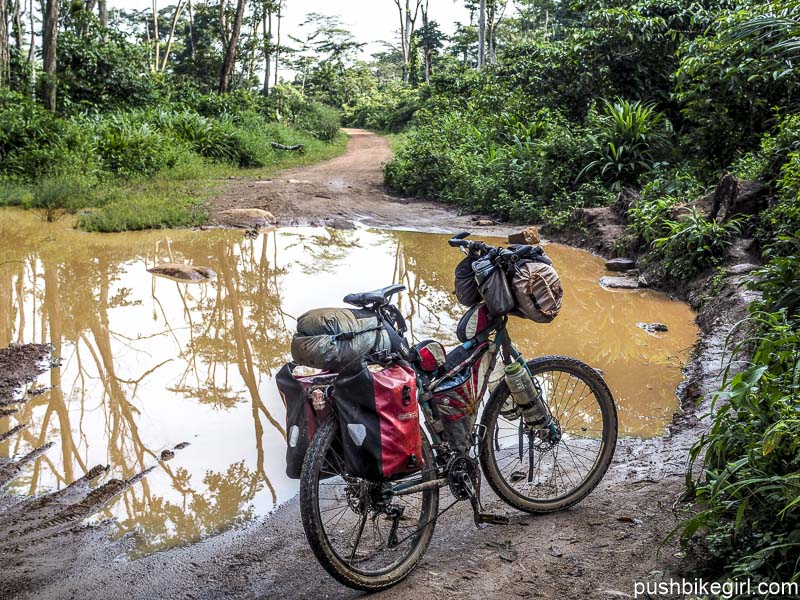
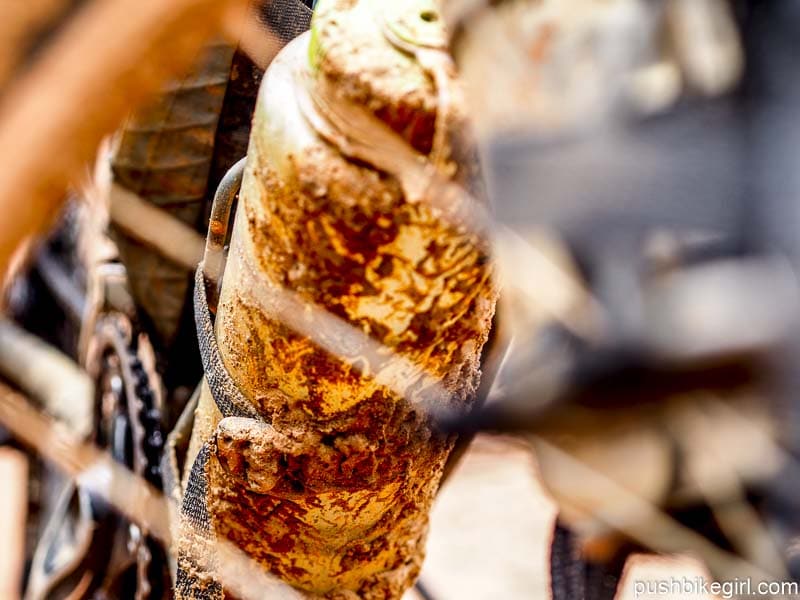
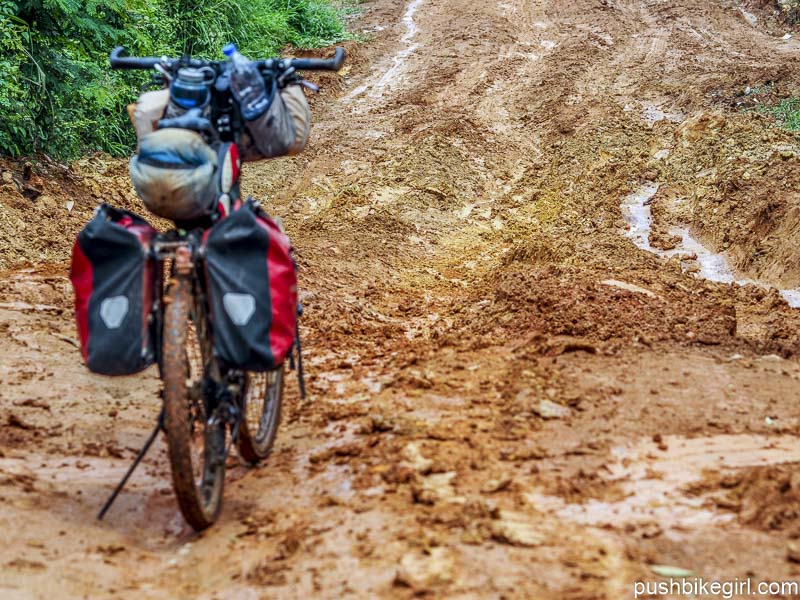
And yet at other times, I saw people communicating in an extremely loud and animated way that seems quite unnecessary and strange.
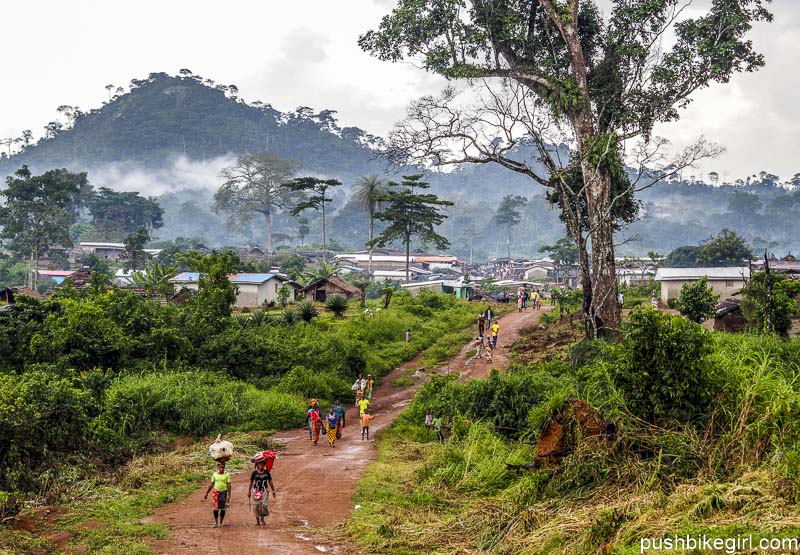
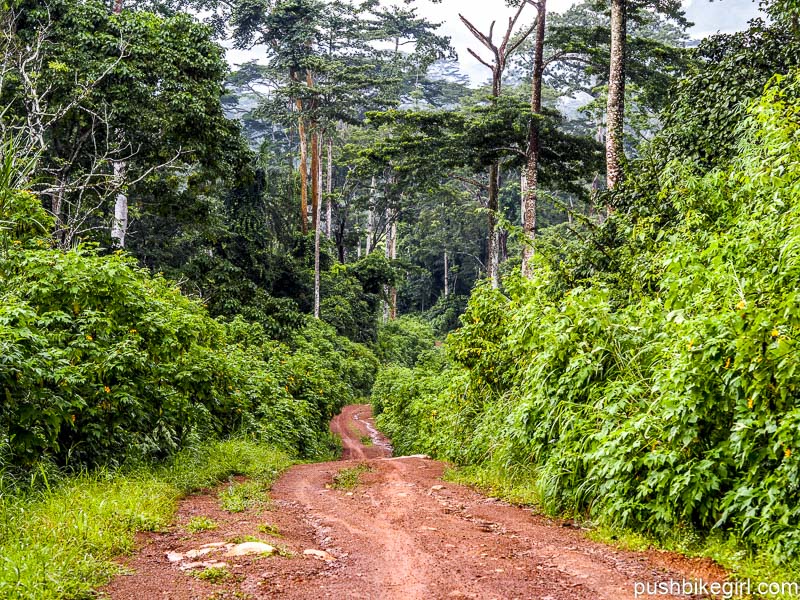
My route meandered through beautiful forests. Finally, an area that wasn’t logged out. The scenery was idyllic, rocky outcroppings, lovely situated villages, but unfortunately, the mud was again extremely annoying in many places.
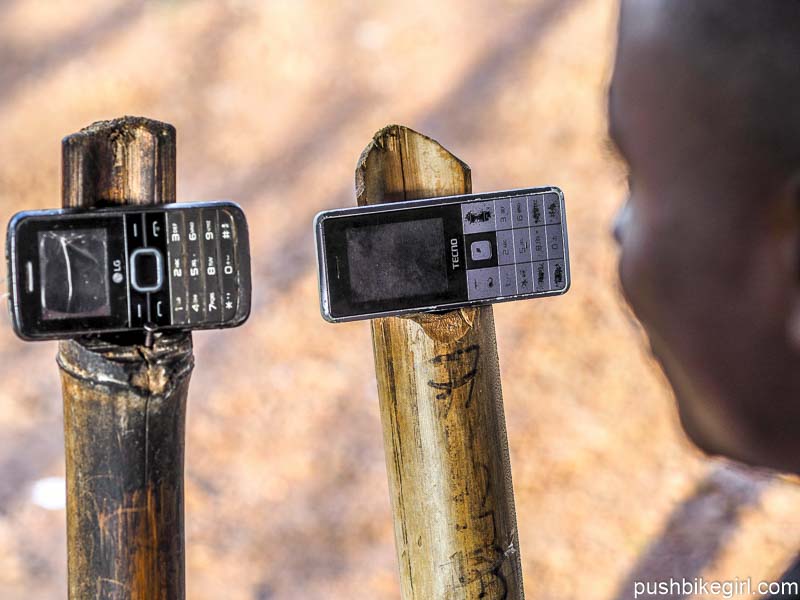
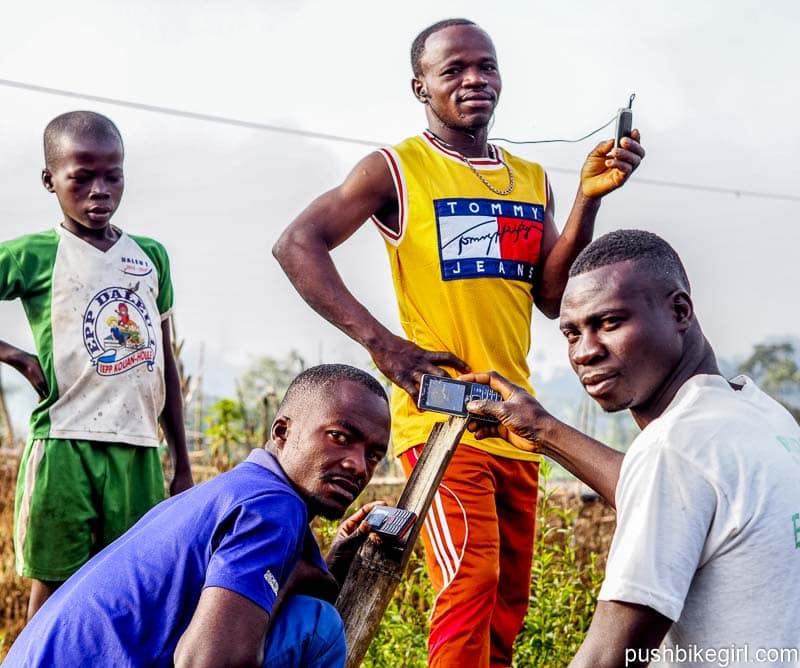
Mobile phone reception was very poor in this corner. Some villagers got creative, building phone holders from bamboo, so they didn’t have to hold them, positioning their phones in the exact spots where there was reception from time to time.
Funnily, these spots have become points where people get together – kind of like they do at the tea stalls.
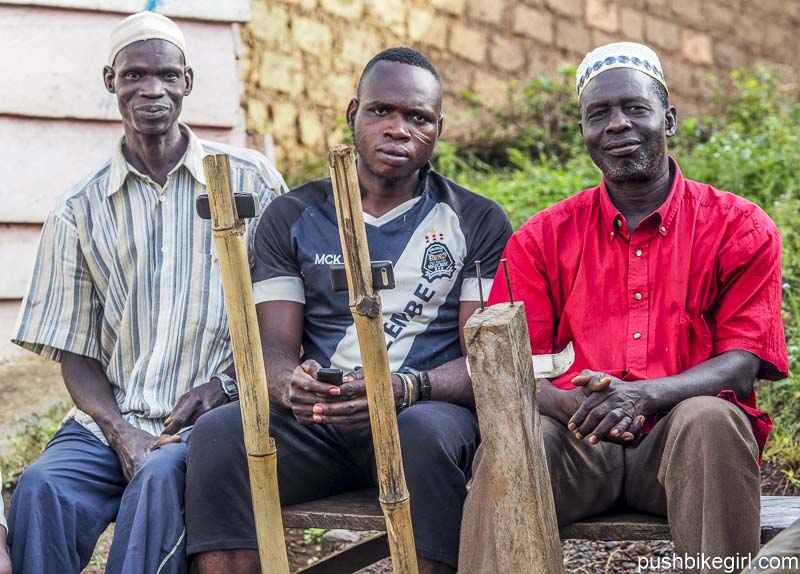
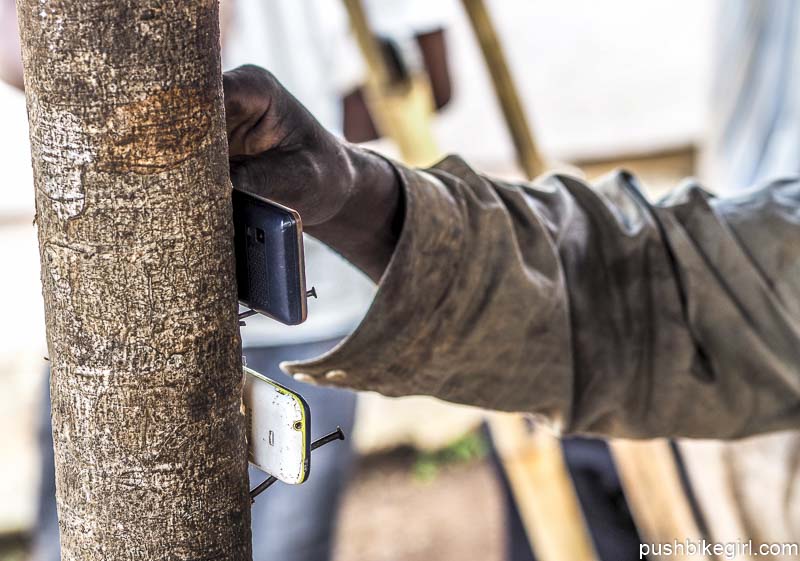
There was a lot of police presence near the border to Guinea. For me, as a cyclist, these stops are always very simple and short. Friendly officials who are very happy for a little chat.
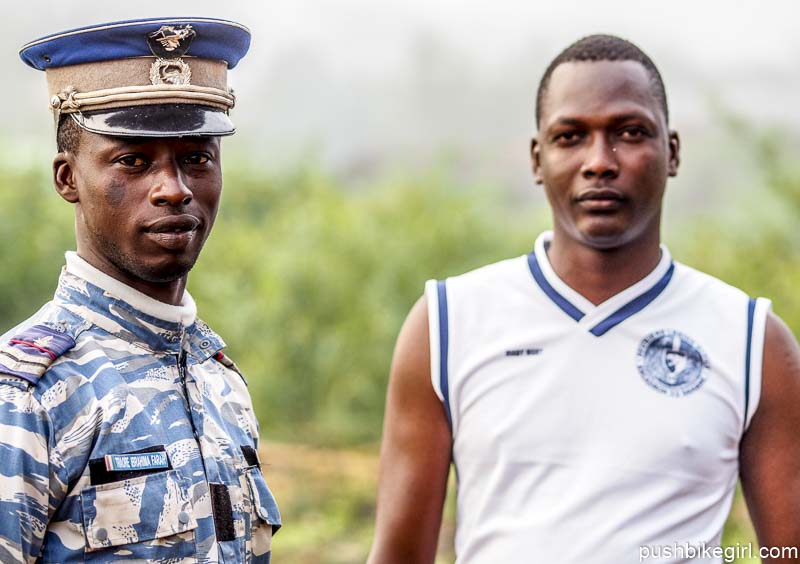
I found the level of education in Côte d’Ivoire to be significantly higher than in the three previous countries. Even with my lack of French, I was usually able to communicate better than in the remote corners of Liberia and Sierra Leone, where English is supposedly spoken, not to mention Guinea.
For the first time, I regretted my lack of French; at times, here I could have had more stimulating conversations. It can get very lonely if you can never talk to anyone.
However, when I was able to talk, no matter where I often realized how low the level of education really is. That was sometimes even more depressing to experience than when you think, well, it’s my fault, I am the one who can’t speak their language.

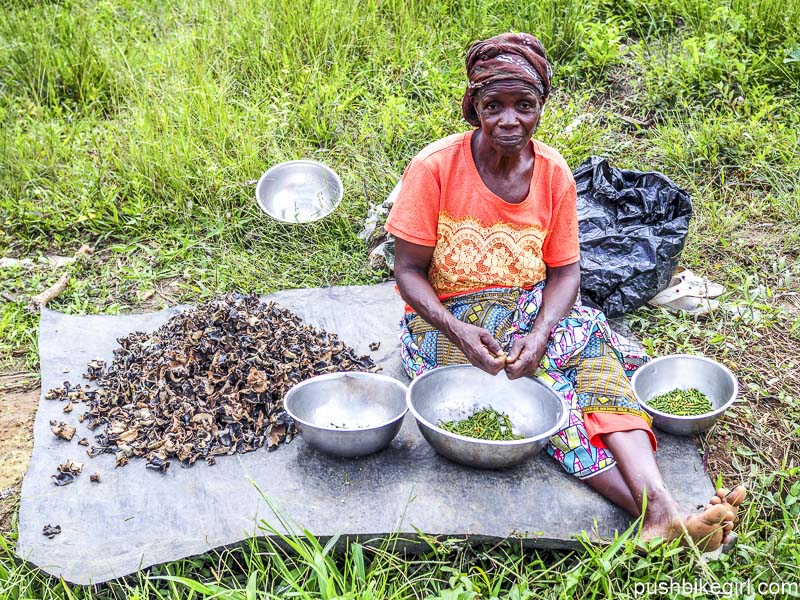
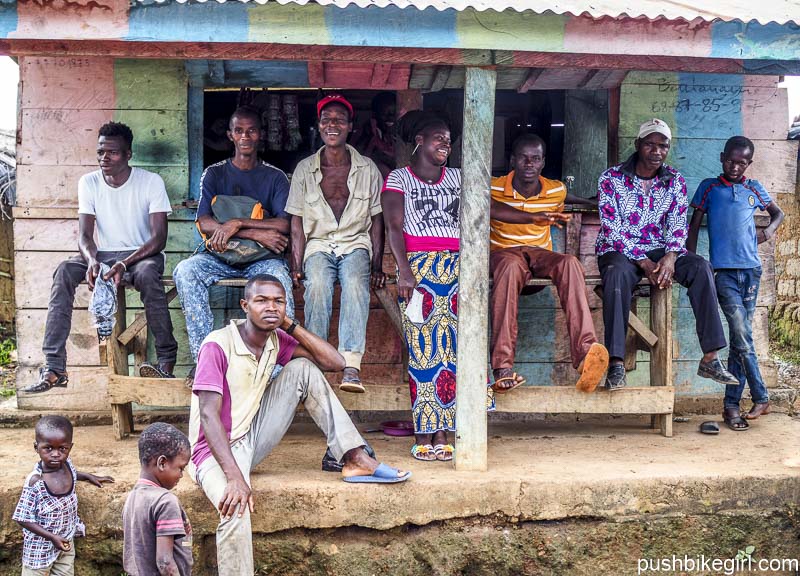
It often feels like I’m on a different planet here in West Africa. Even after almost a year in Africa, I’m often shocked at how underdeveloped things are. It’s heart-wrenching on almost a daily basis to see the desperate conditions some people are living in. Especially because there is nothing, I can do. You just feel helpless.
Sometimes these feelings turn into aversion, at those times, I think, “man” – you are also to blame here, move your butt a bit and do something against your poverty.
Then again, I weigh up and say to myself, yes, but we industrial nations exploit these people, we leave this pile of hopelessness behind us. And then again, I wave off and say to myself, oh, I don’t care, let them suffocate in their dirt, just to be able to breathe and not to let the joy of life escape me.
Riding the far-flung corners of West Africa isn’t an easy task. For a sensitive person like me, being confronted with the negative conditions people exist in, and the mindless exploitation of the natural world is not always easy to bear.
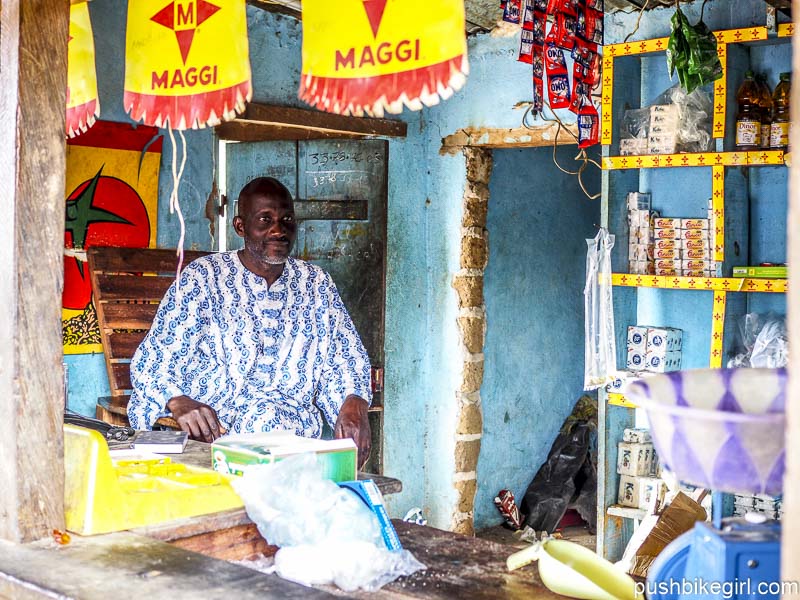
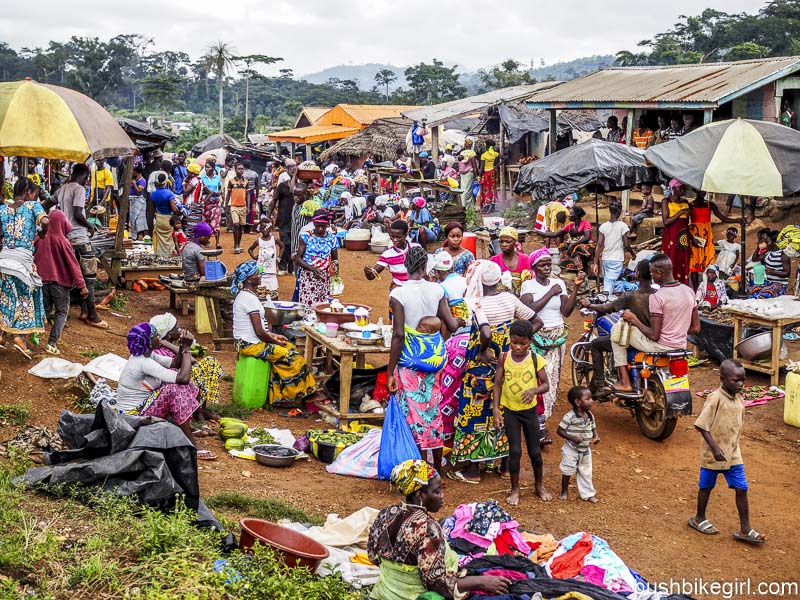
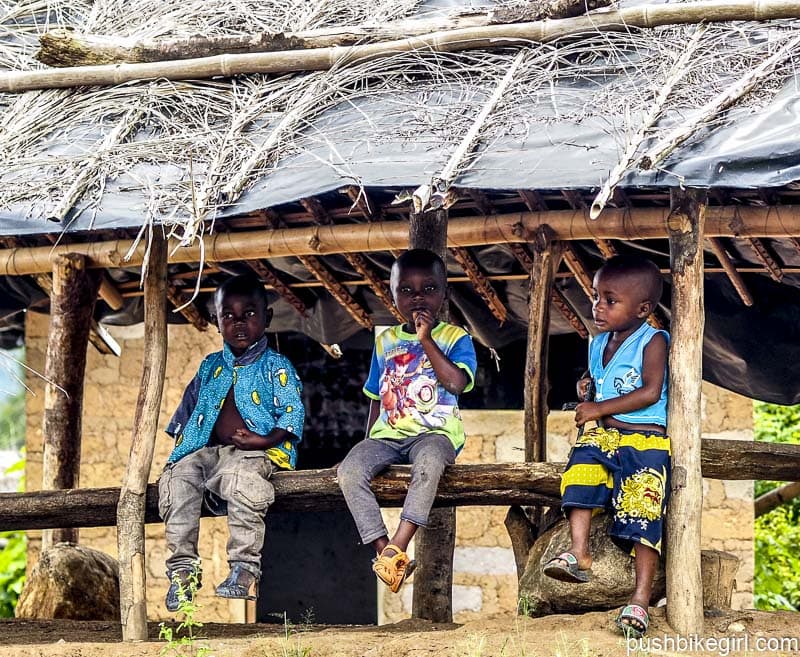
I had the good fortune to experience a market day. Despite frequent downpours, the atmosphere was special, and I stayed for hours in the small village.
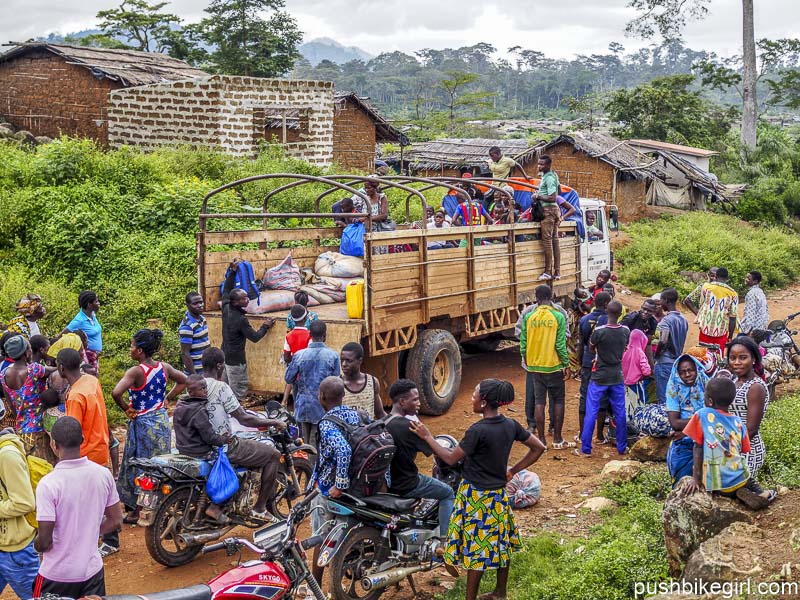
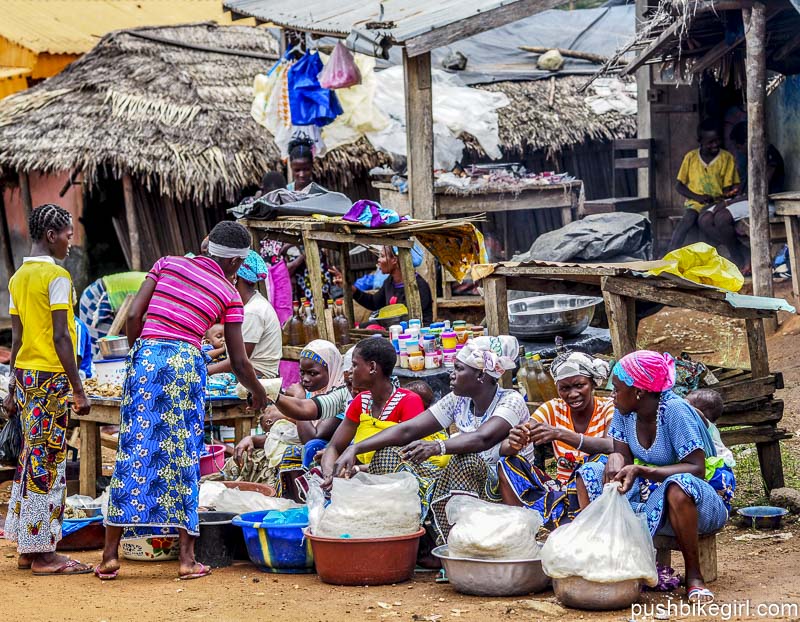
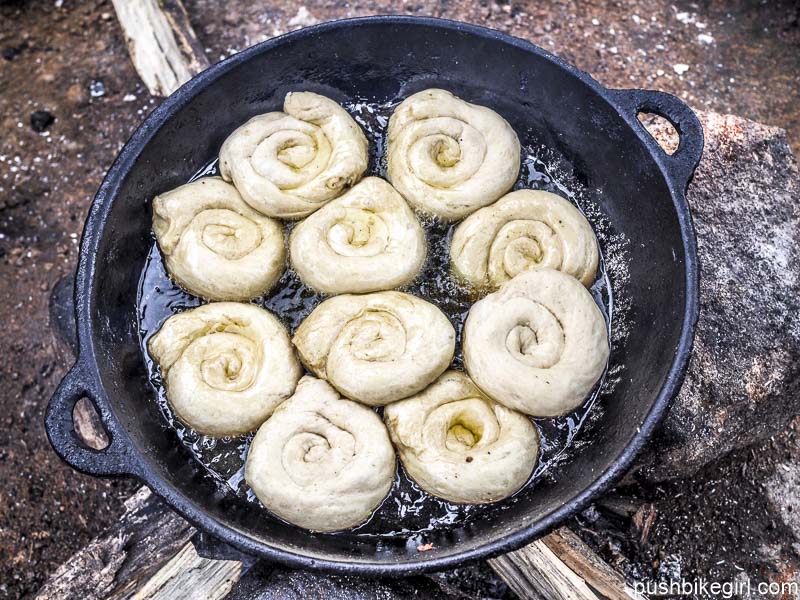
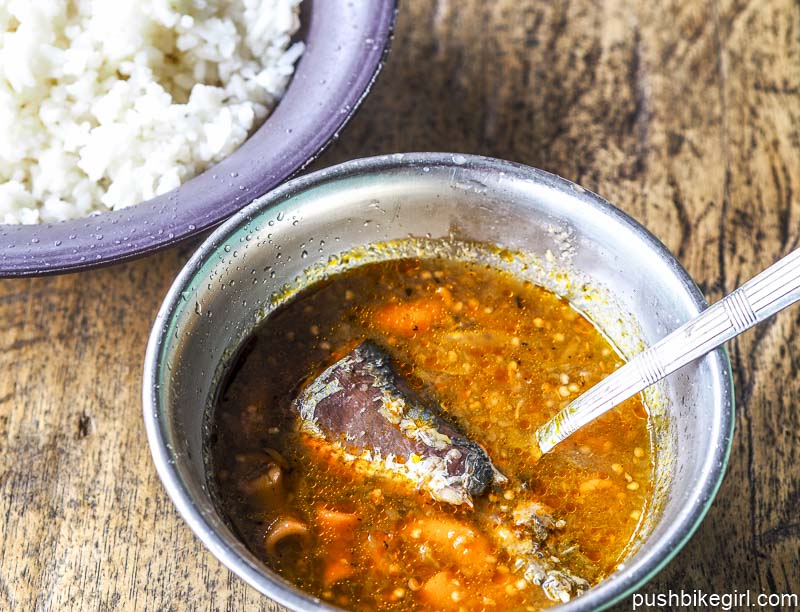
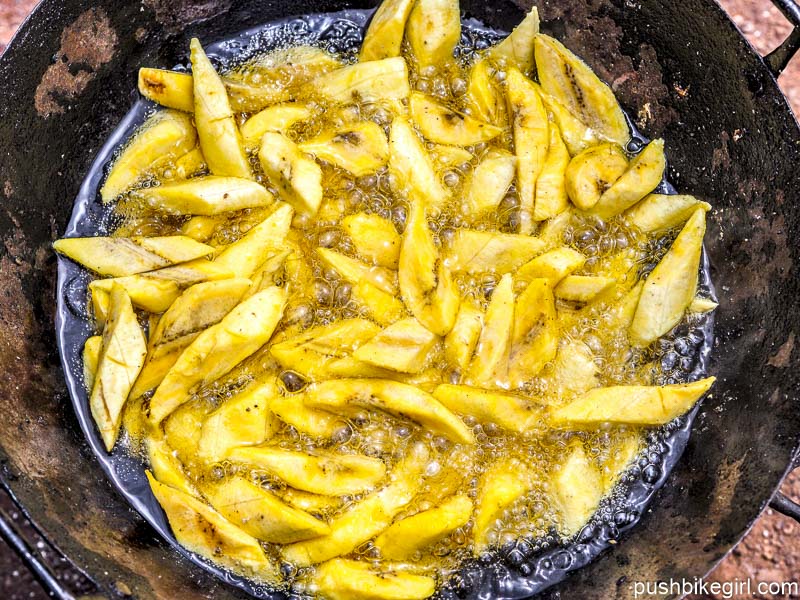
I met a woman from Liberia who had fled the war and settled in Ivory Coast. She had been separated from her parents in the chaos, and she never found them again.
She is only able to send one of her children to school because she cannot afford the annual school fee of 10 Euros for all her children. Her husband had recently died of diabetes.
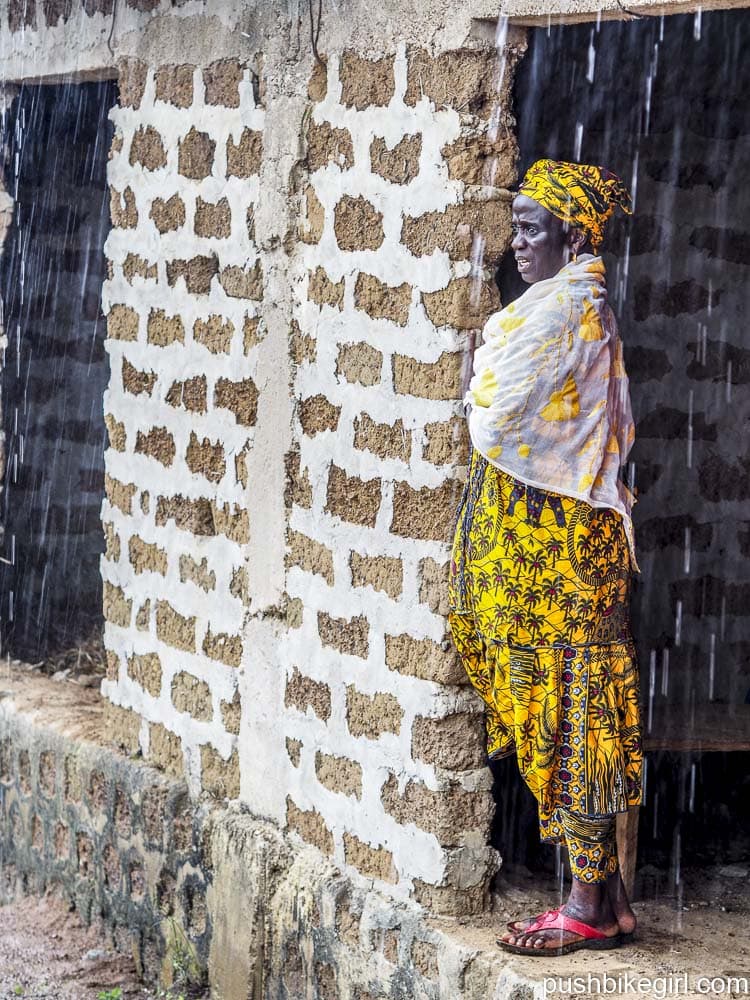
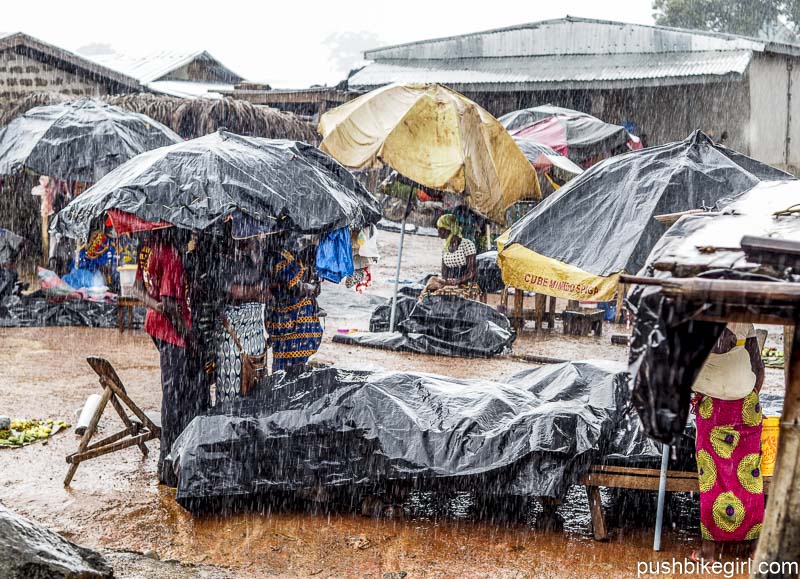
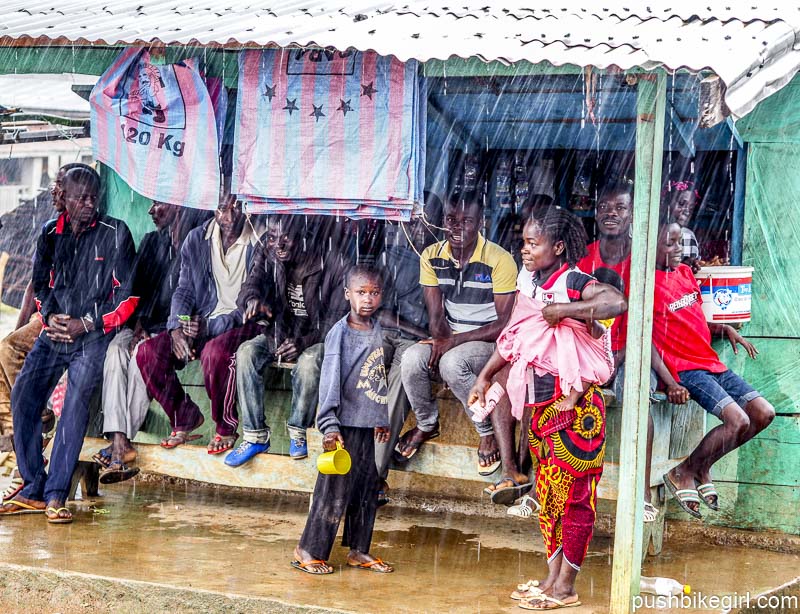
Police officers let me camp in their kitchen hut by the roadside. Of course, as usual, I had to register with the village chief beforehand and ask for permission. These are often very interesting encounters — mostly older men who live in better houses and are always extremely friendly and helpful.

West Africa is really the corner of the world where there is almost never a situation that doesn’t start with a smile and end with a smile. There’s never really a problem here about anything.
Only my Western mind is a problem. A woman from Germany who still can’t come to terms with how much dirt there is everywhere. The hygienic conditions are catastrophic, leaving me wondering why I hadn’t been seriously ill.
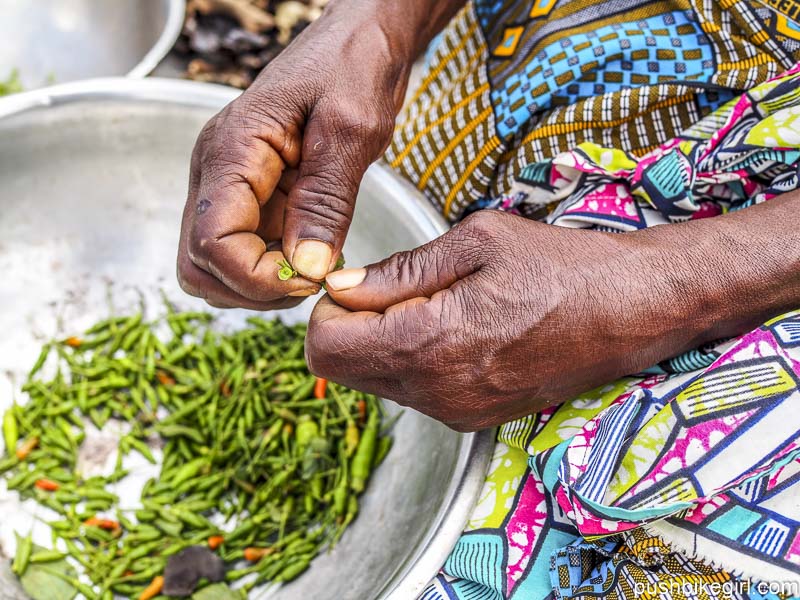
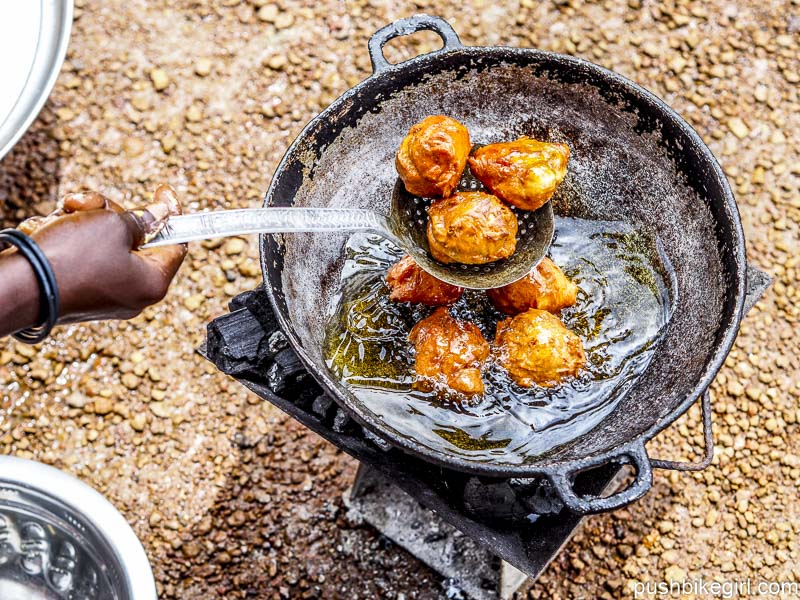
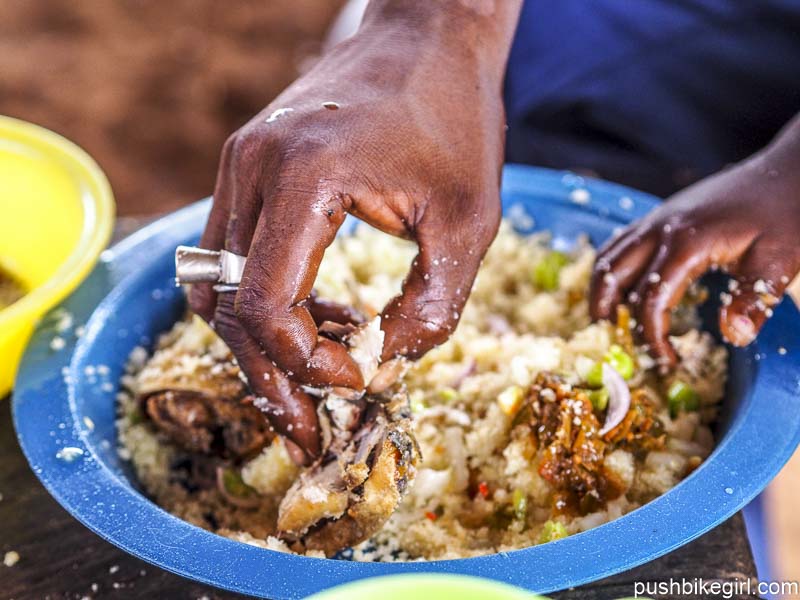
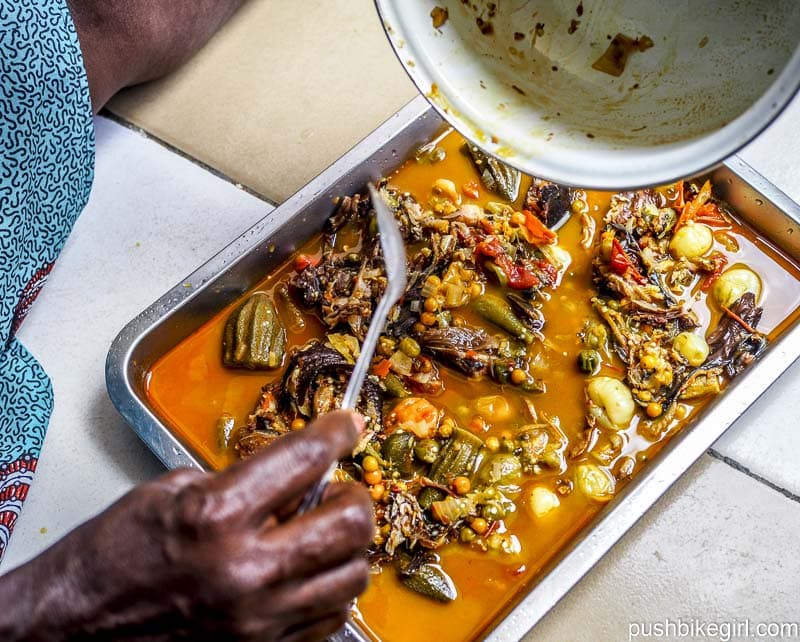
In a village, I ended up in a brothel, the only shelter I found that evening. The area was full of drunks. And I don’t like drunks. My most unpleasant and nerve-racking experiences the world over have been with drunks, hunters, guard dogs, and traffic.
They lie on a plane with the disease-transmitting mosquito, and all of them present the most dangerous hazards a solo female bicycle traveler faces.
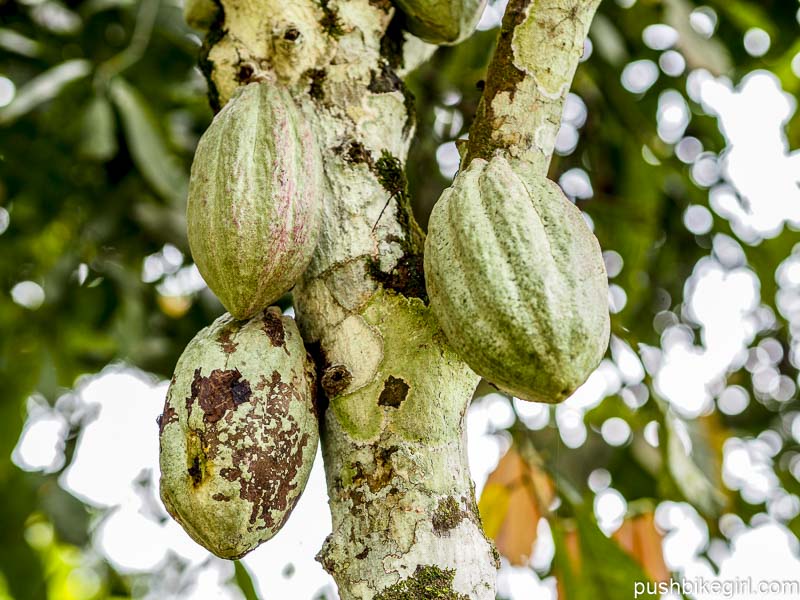
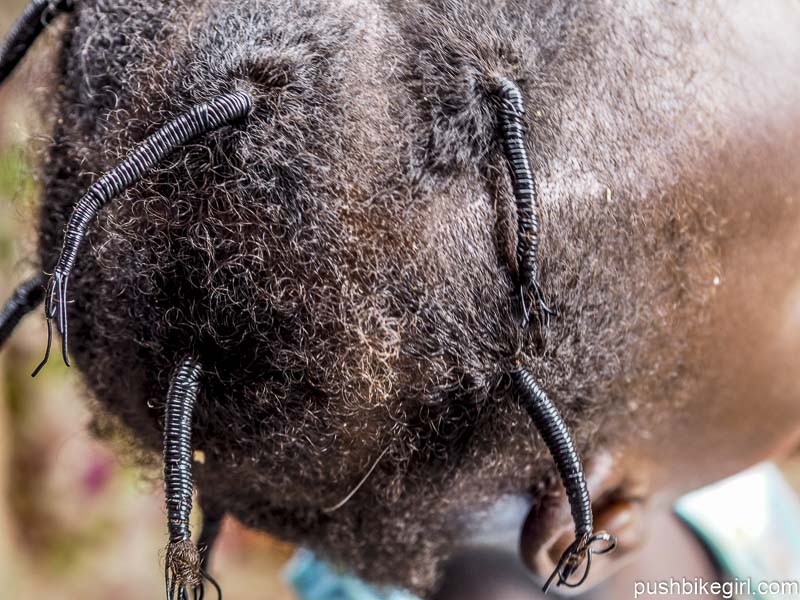
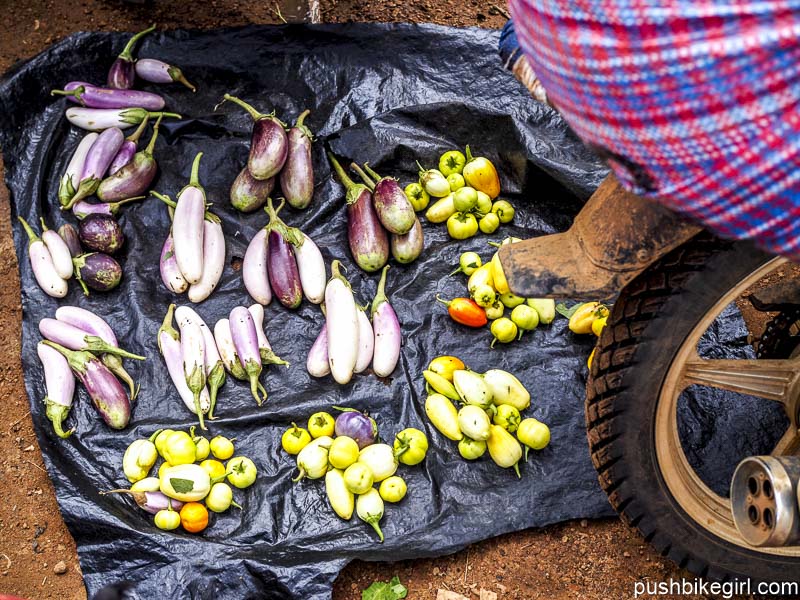
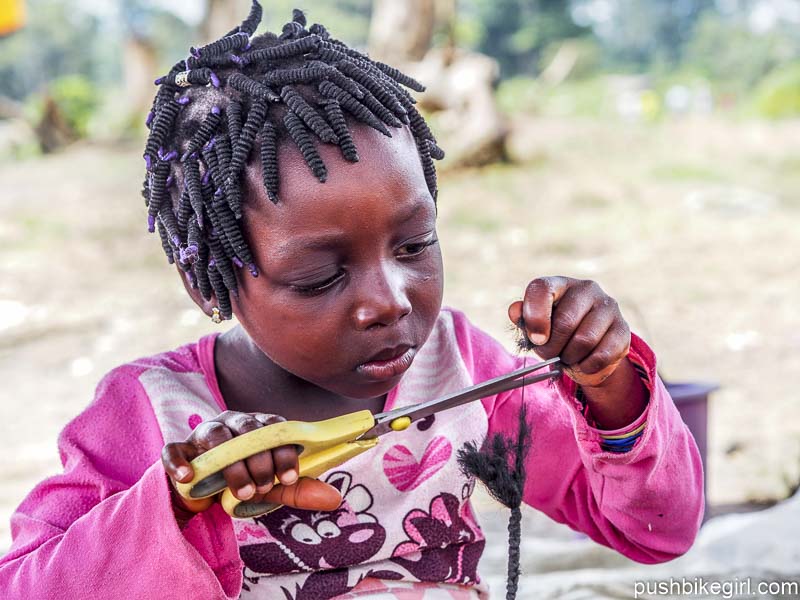
The brothel had been bearable. Of course, I put up my tent on the mattress to distance myself from any remnants of previous occupants. Sometimes it’s disgusting where you spend the night.
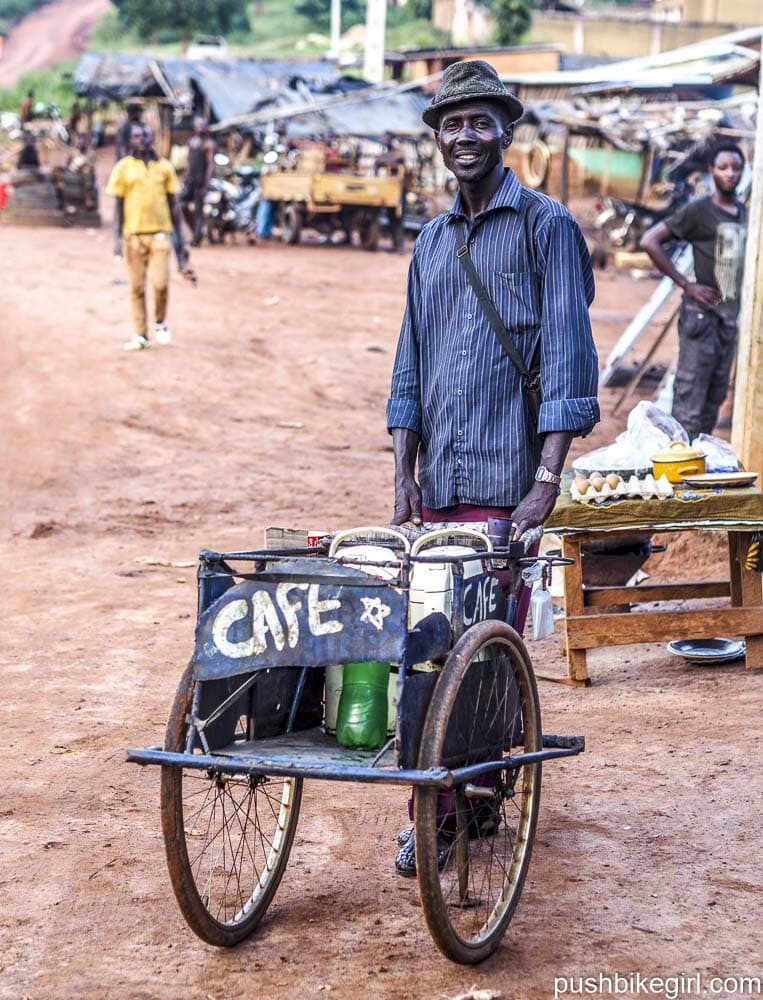
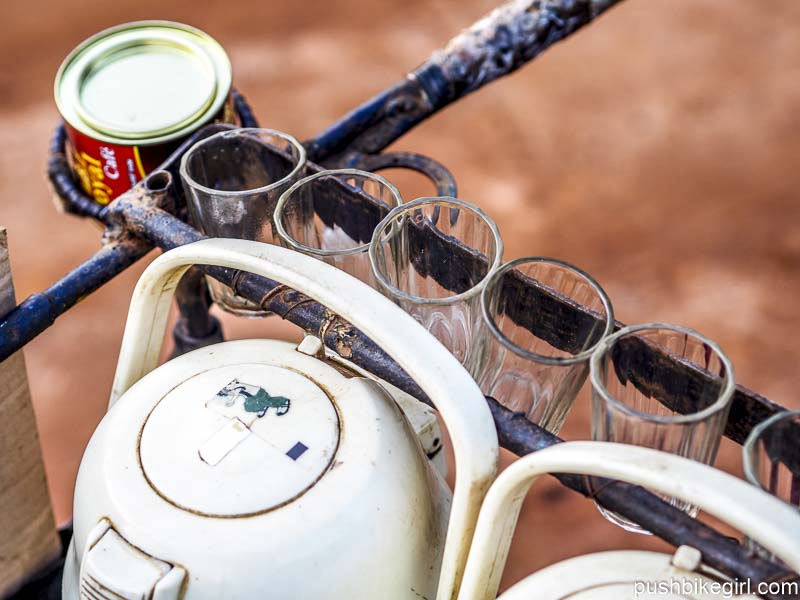
Back on the northbound main road, it almost felt like the Danube cycle path. The road was in good condition, food was available from time to time, pretty much free sailing.
I listened to interesting podcasts, sweetening my life on the road with continuing education from very different areas of life.
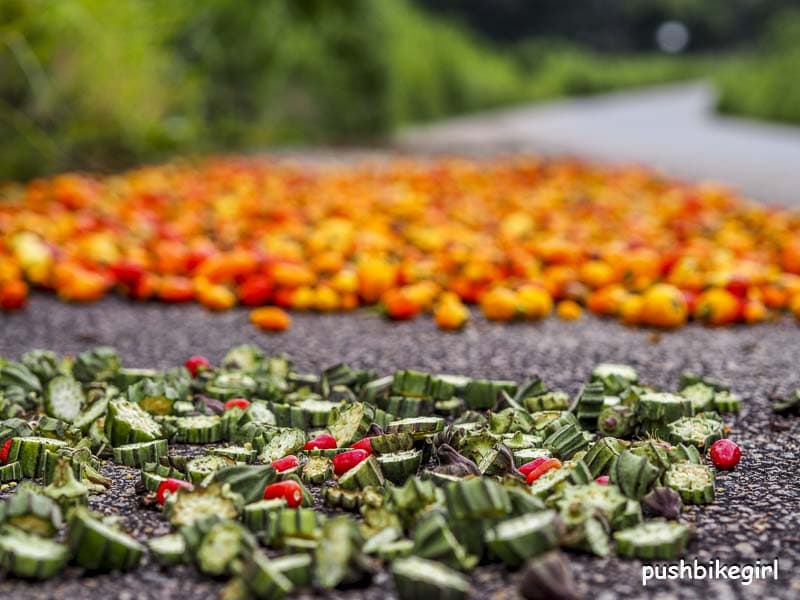
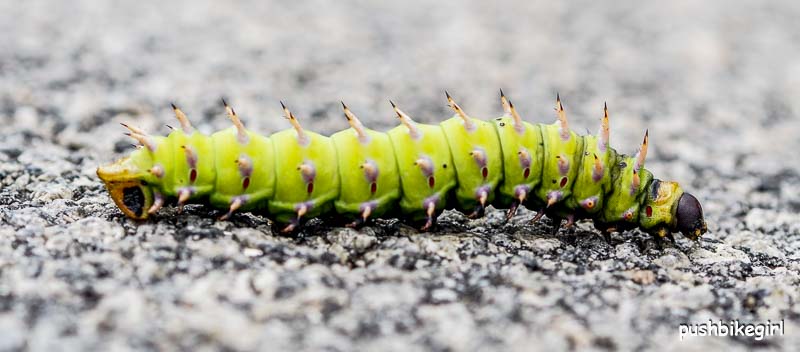
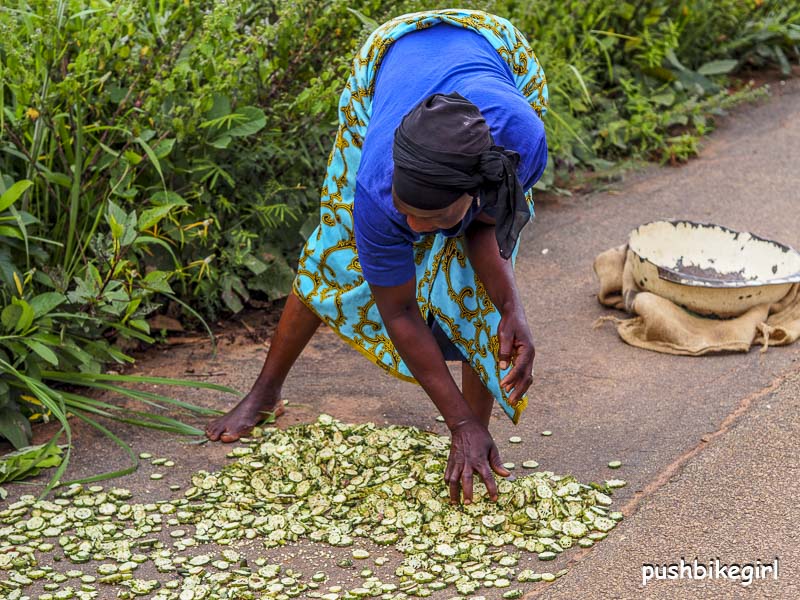
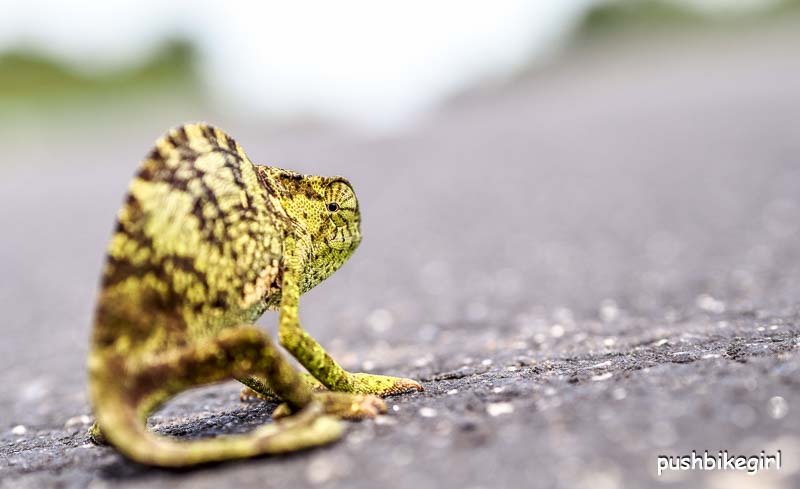
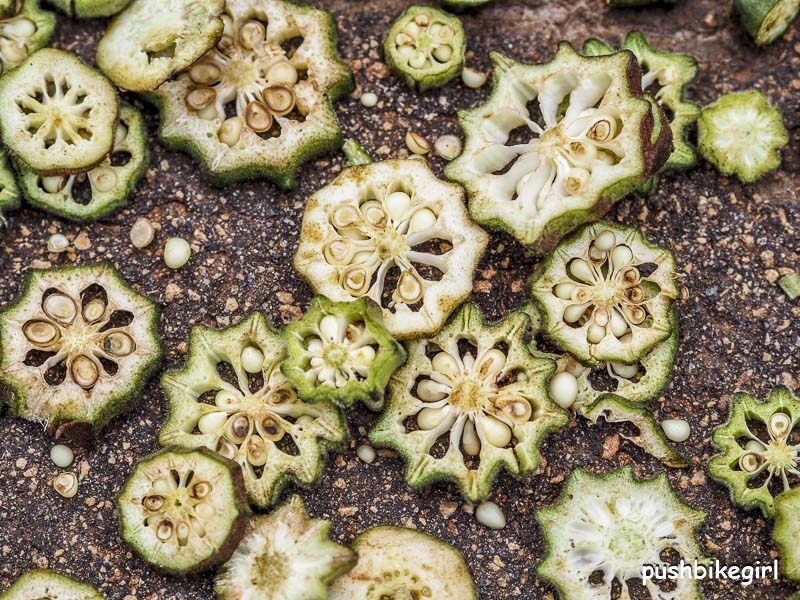
From the north, I expected less rain, interesting culture, less traffic, and perhaps a more interesting landscape than at the coast. But the farther north I came, the fewer choices I had in food.
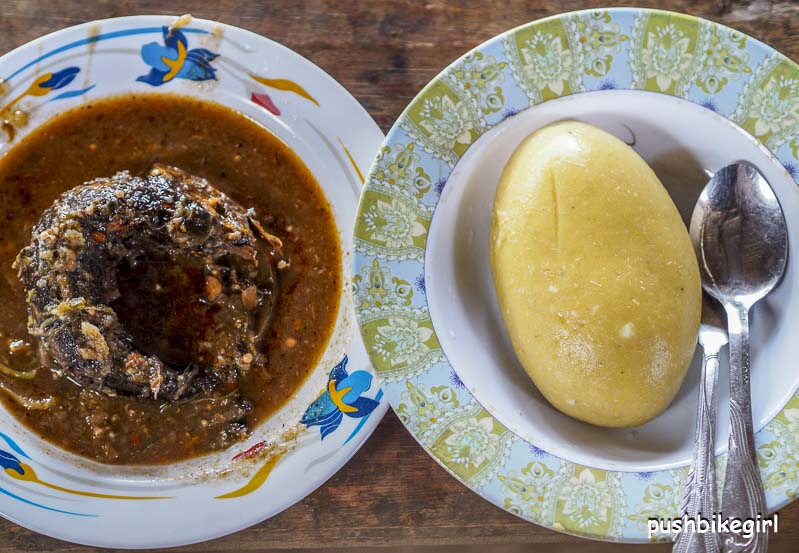
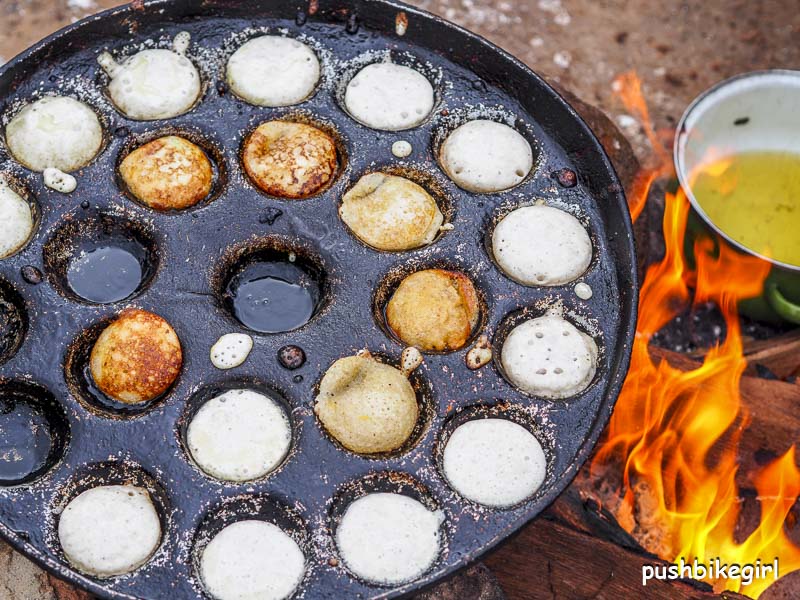

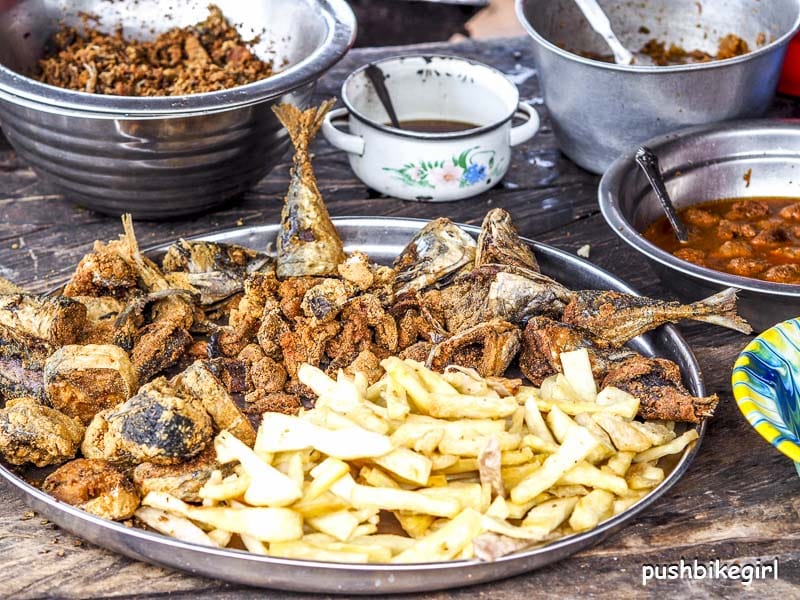
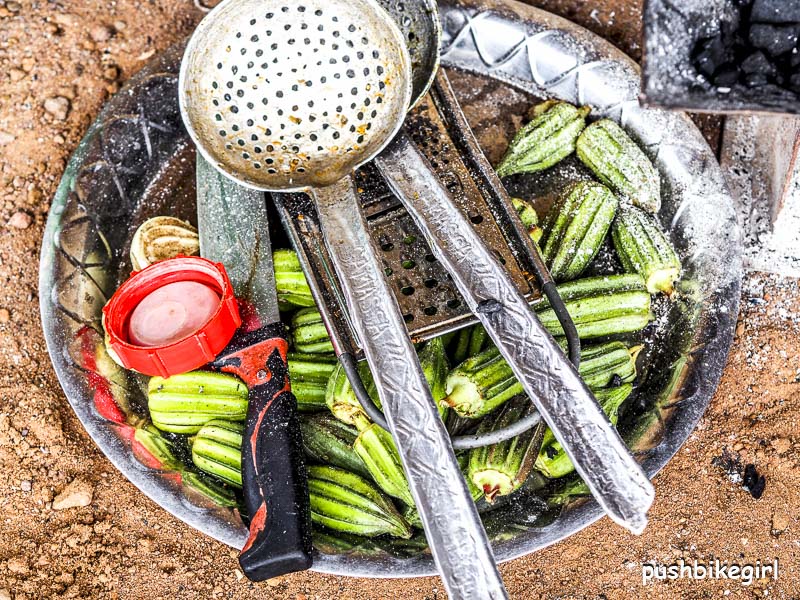
The fresh papayas and pineapples that had been available were now a thing of the past. I was back in rice & sauce territory. And believe me, I was so fed up with rice and sauce I nearly vomited one day in disgust.
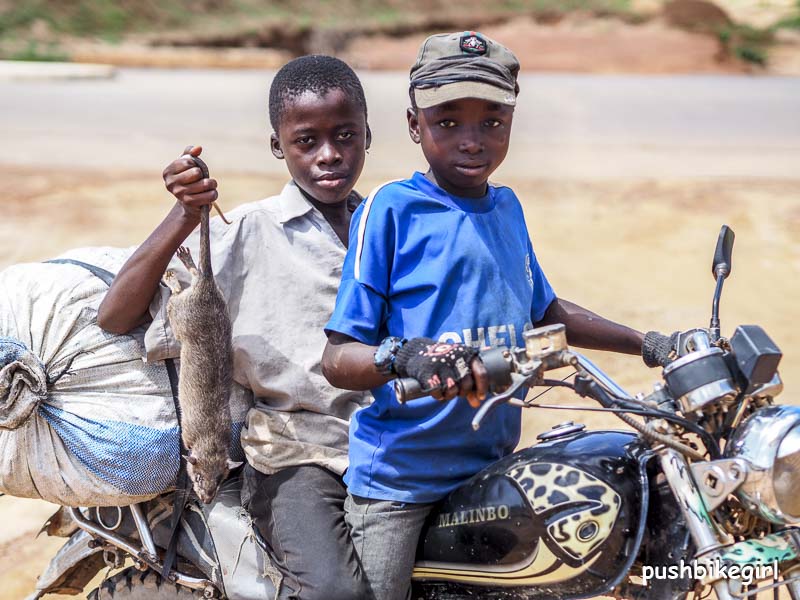
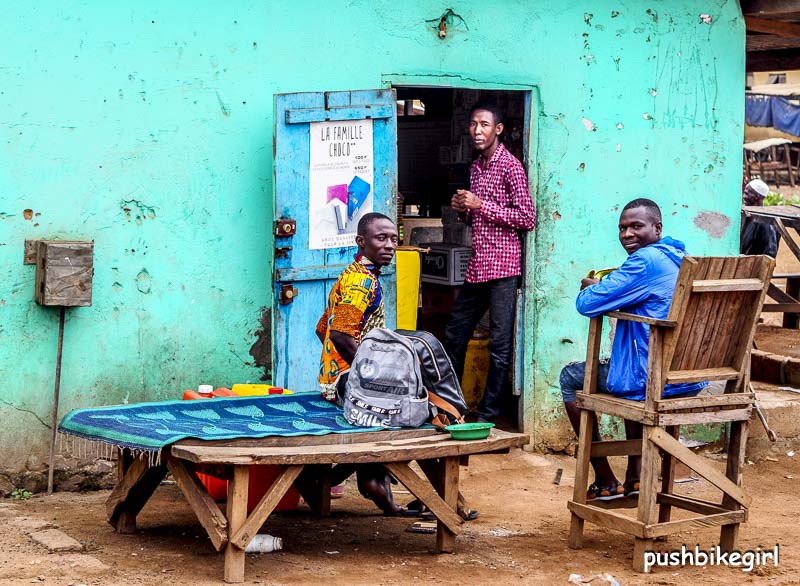
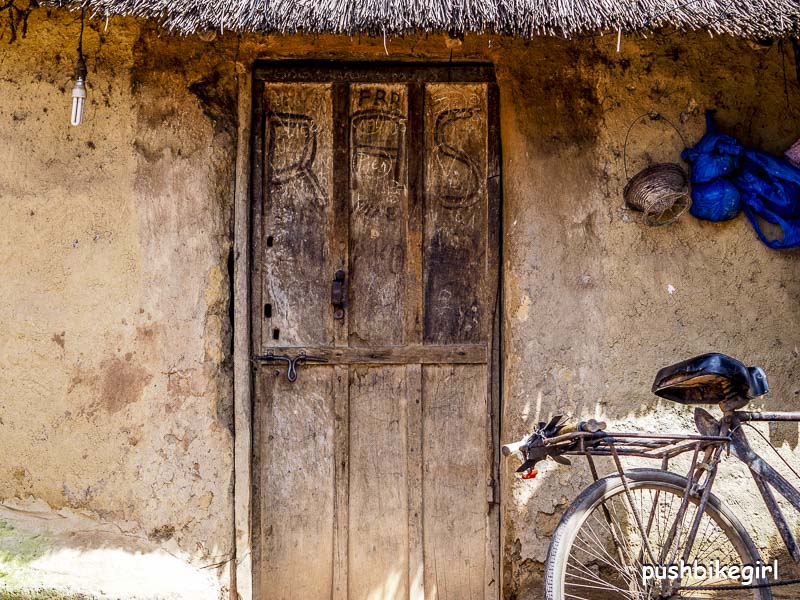
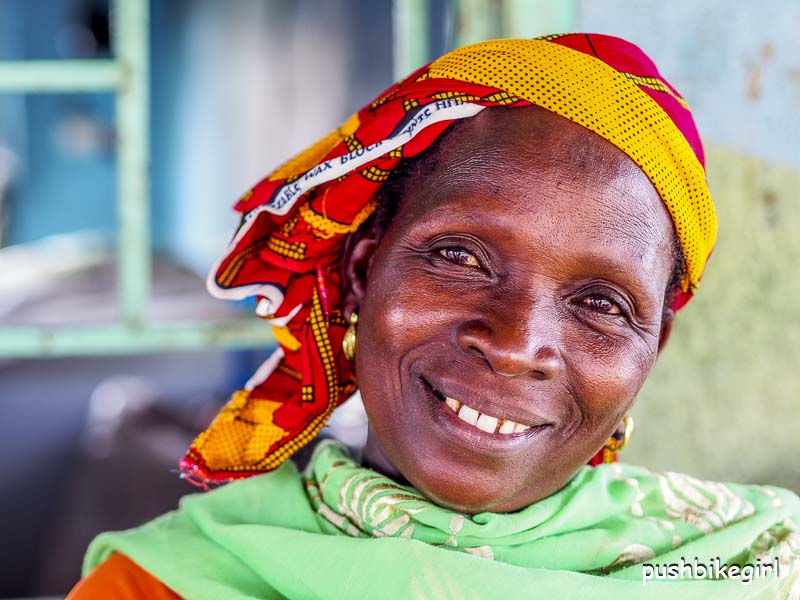
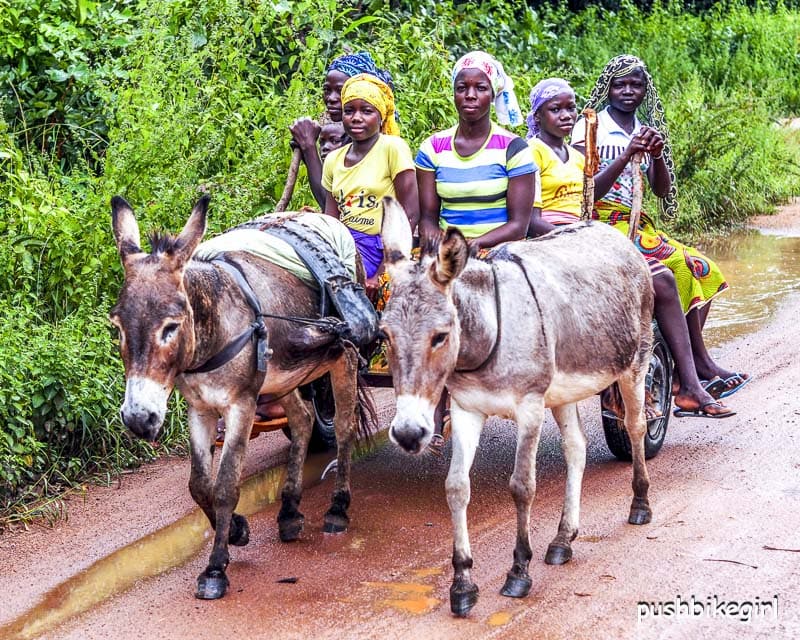
My power was evaporating; the catastrophic diet of the last six months was taking its toll on my body. It’s amazing what the women here can do, as well as some of the children.
Over and over, I wondered how the women here, under these conditions, have so much strength to carry huge loads of wood on their heads and even carry a baby on their backs at the same time.
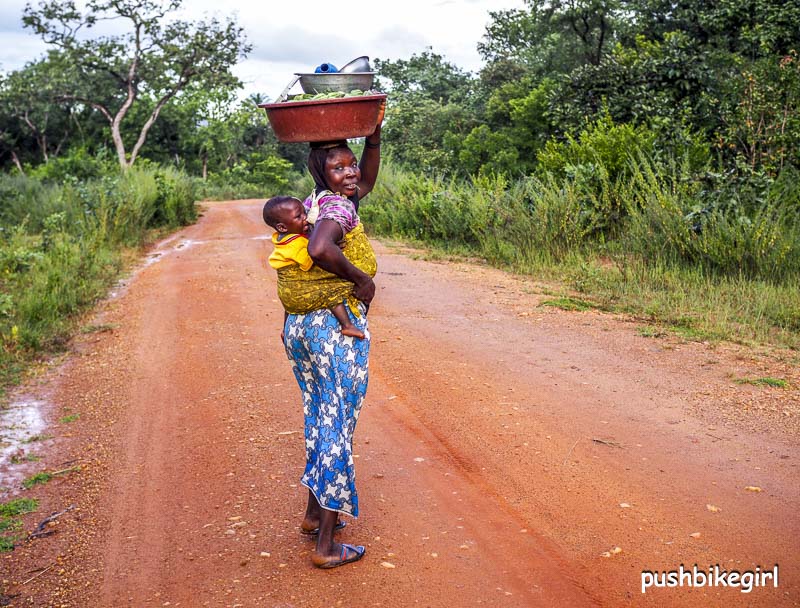
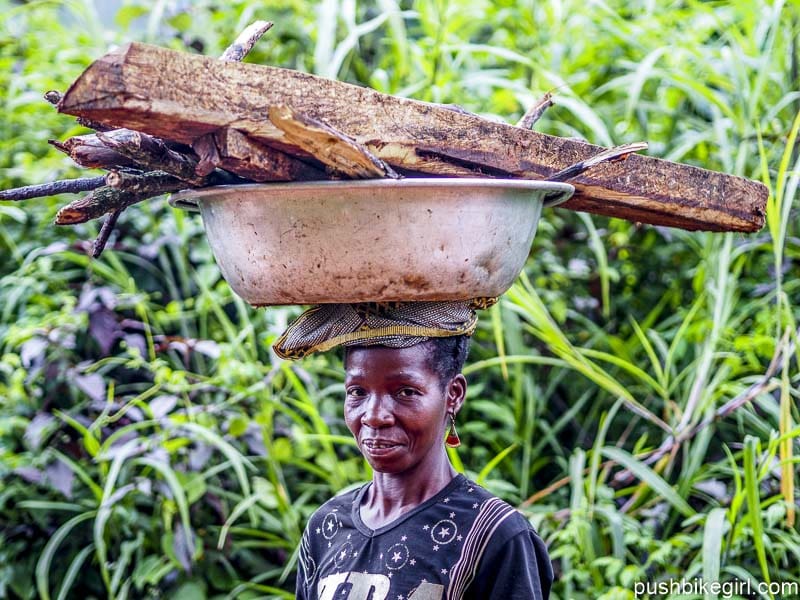
As I rode north it was obvious, I was also back among Muslims, men sat together drinking tea, while women work, and in general, people are very hospitable.
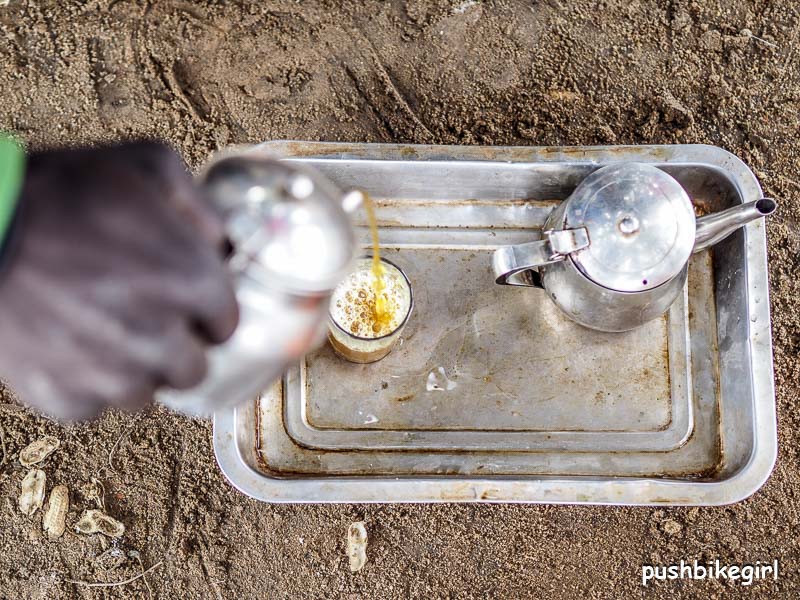
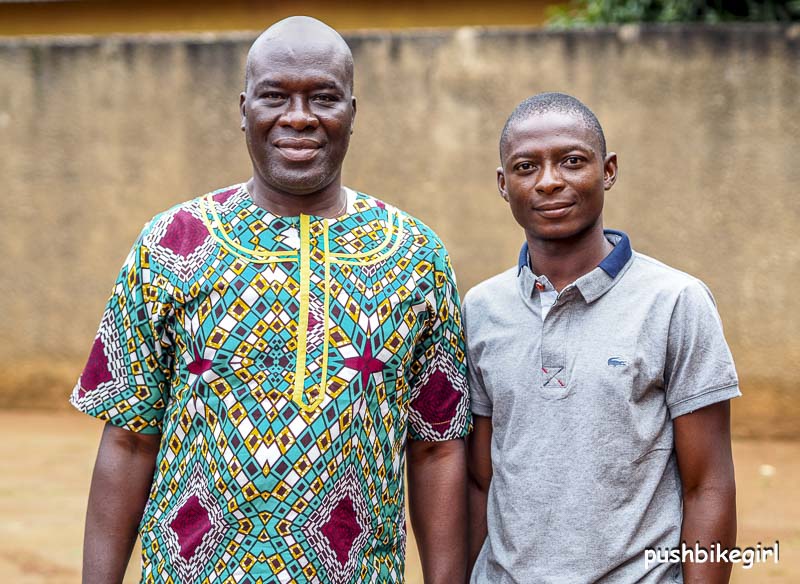
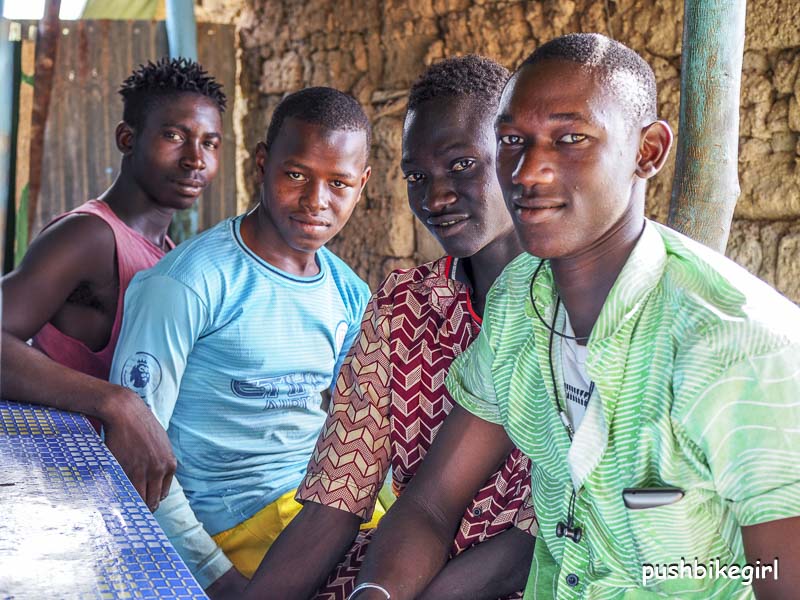
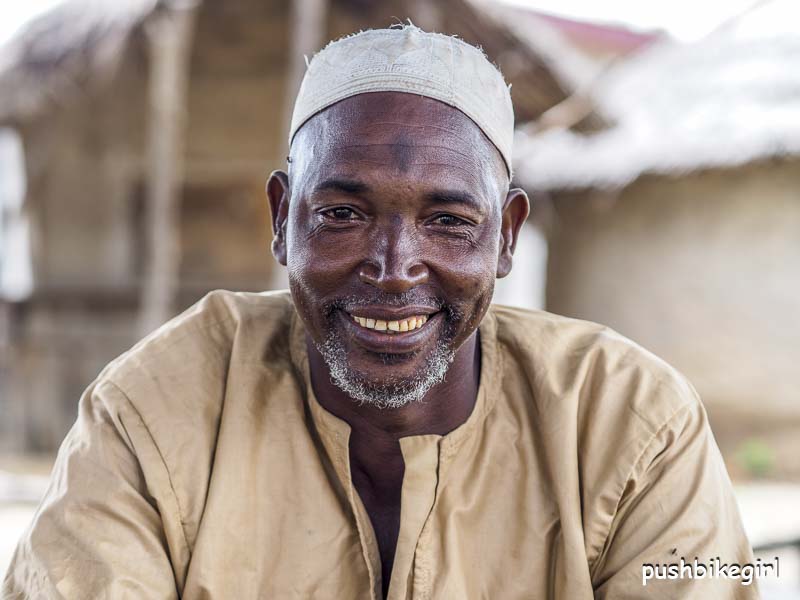
In Odienne, I saw the first functioning traffic light since leaving Mauritania, wow, after six months, that was an eye-catcher.
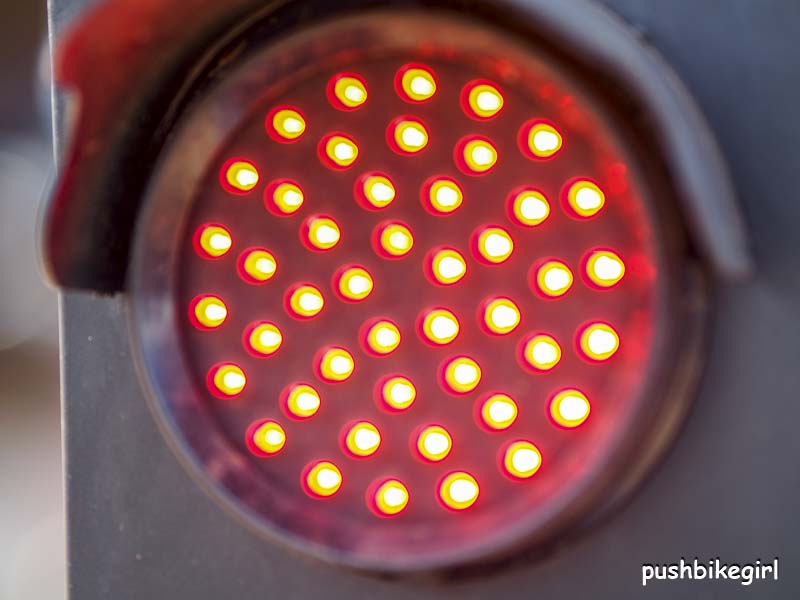
At some point, the tar ended, and I was back on dirt. The temperatures rose and the rain showers were finally, after three long months, almost over.
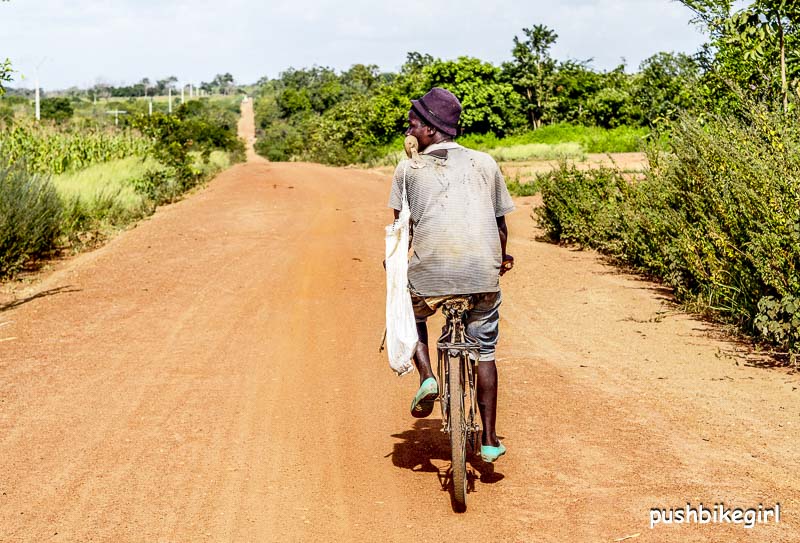
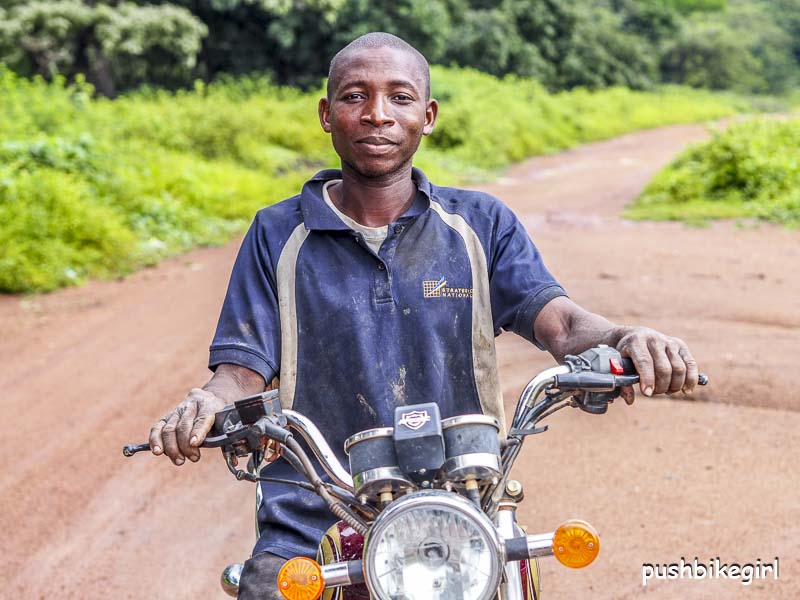
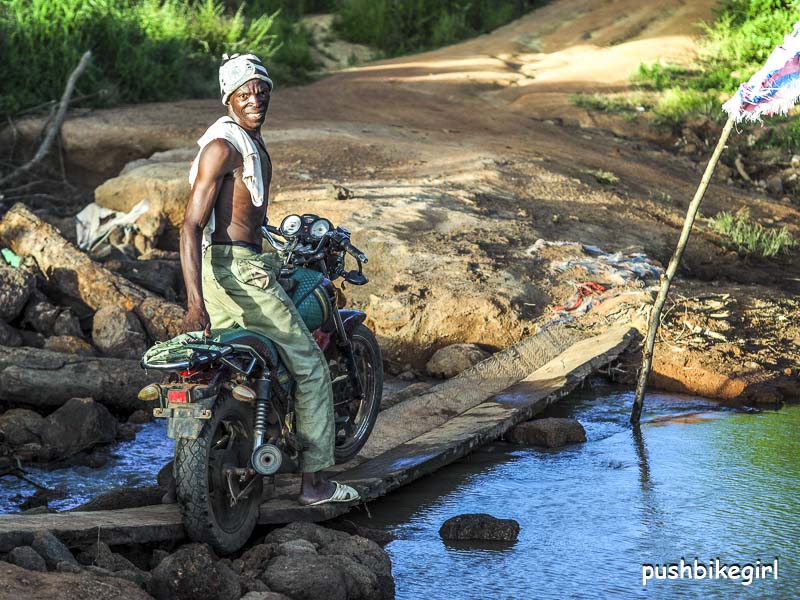
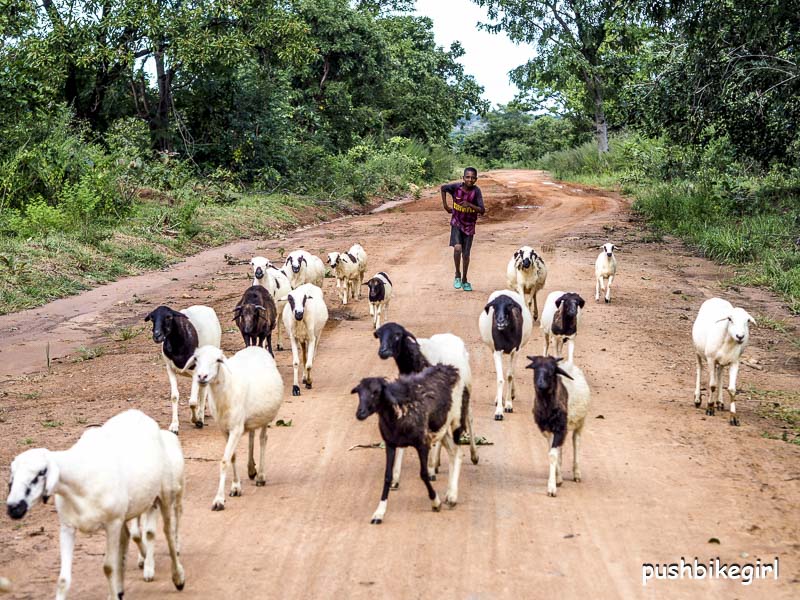
A frequent irritation in Ivory Coast was people laughed at me, whether from embarrassment, being overwhelmed or insecure, who knows. Theoretically, I shouldn’t take it personally, but it still bothered me.
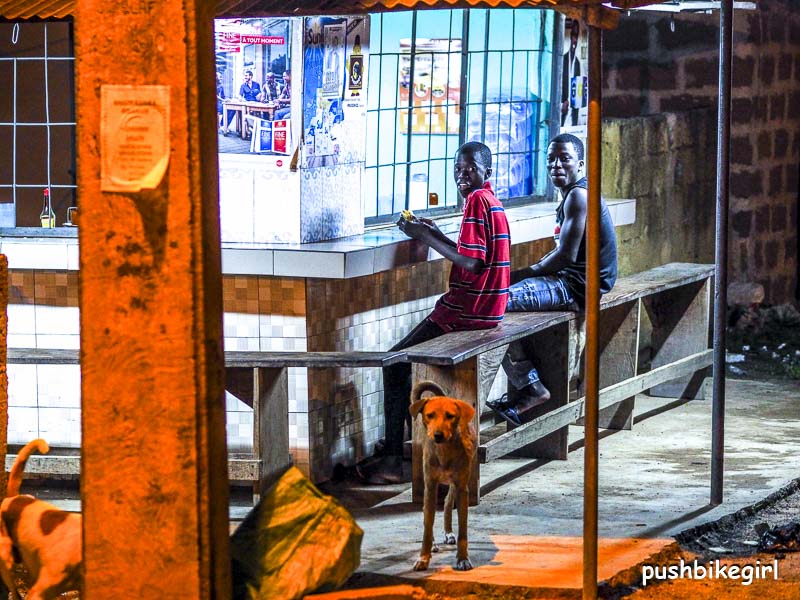
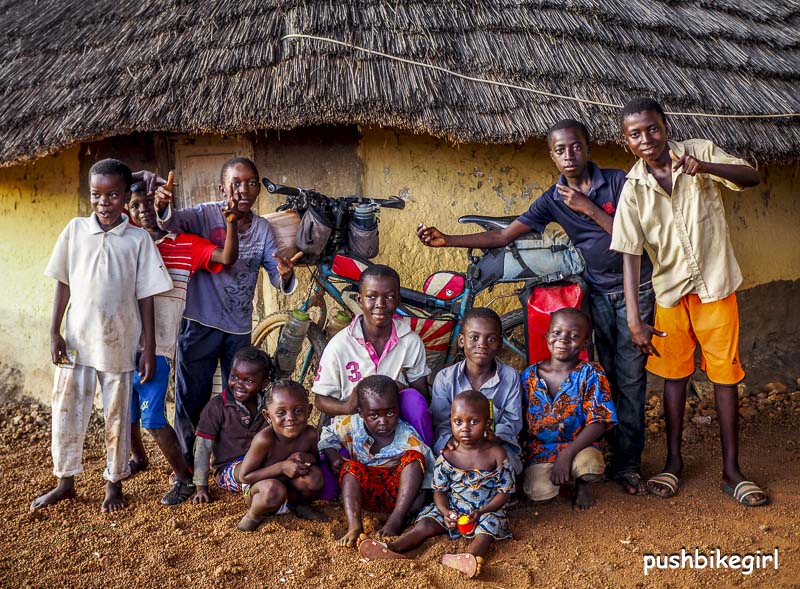
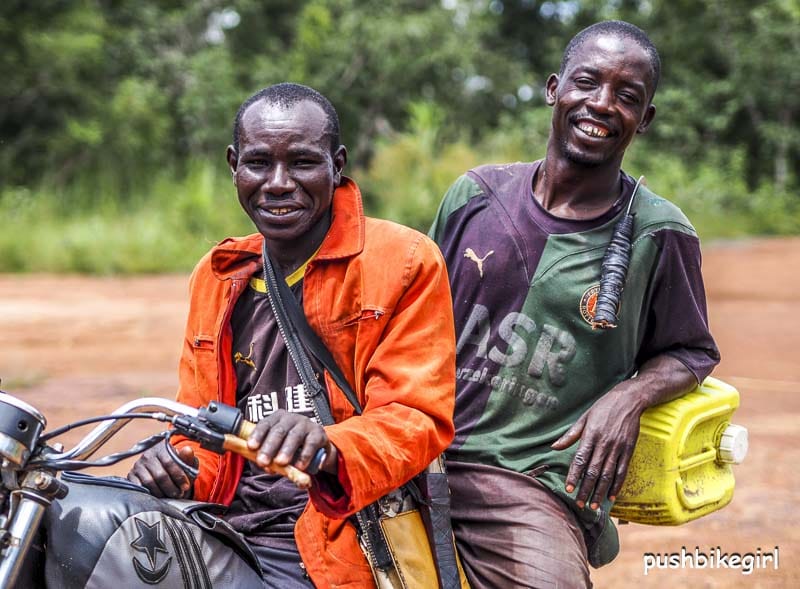
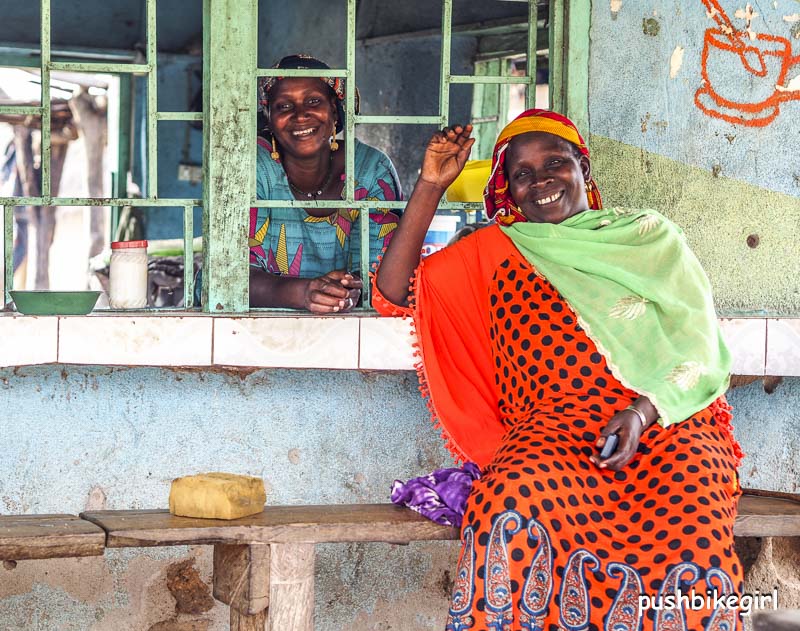
West Africa began to get on my nerves. It started to bore me, and I asked myself if it is so clever to always stick to back roads and tiny villages in the middle of nowhere. I found myself again at a point where I was hungry for things rarely available in remote areas. I needed to be able to talk, exchange thoughts, understand, and ask questions.
The villages were all alike – cities, however, are simply no fun from a traffic point of view and can be life-threatening, with the chaotic driving style. At least that’s how I imagine the busier roads on the coast. Anyway, I decided to travel south when I got to Ghana to get back to a more interesting life. Monrovia was much too long ago.
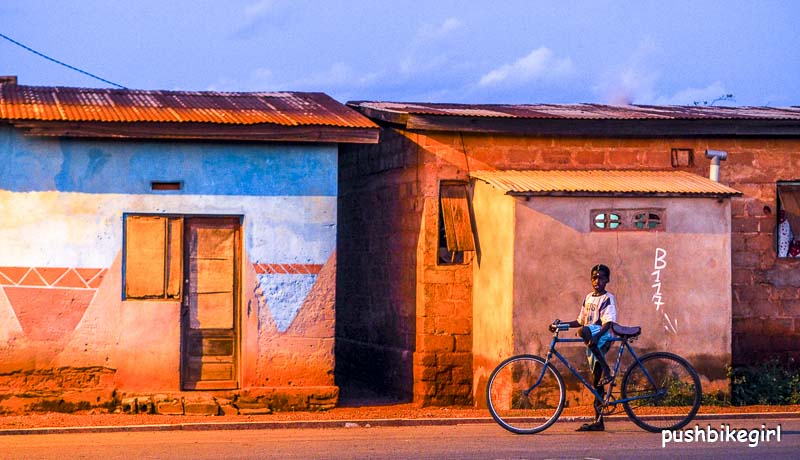
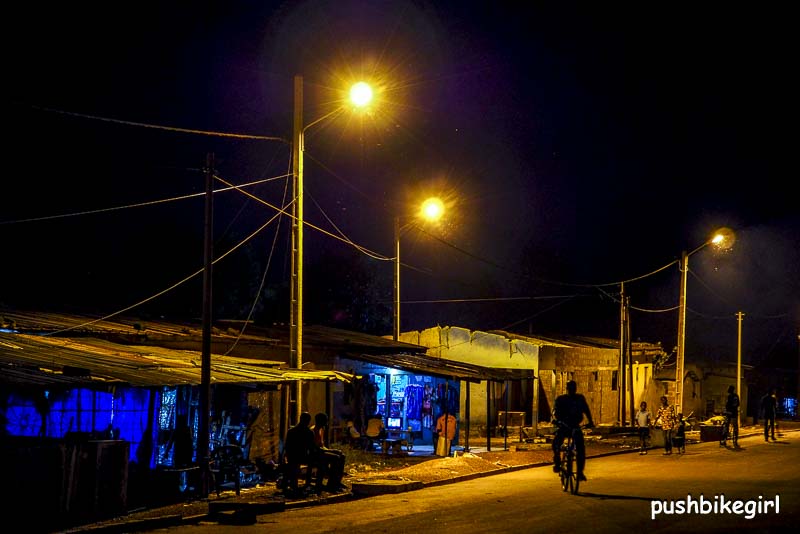
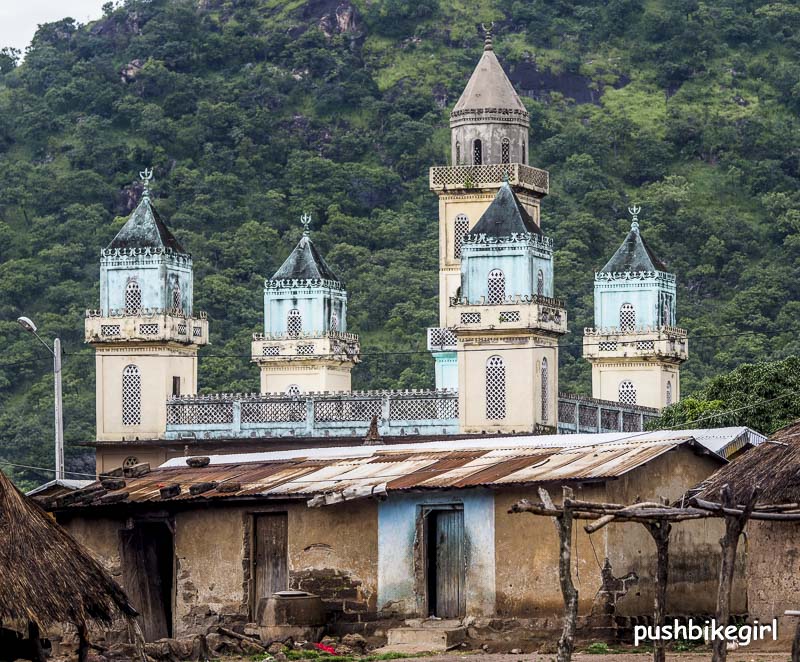
My first destination was Samatiglia, with its old Sudanese style mosque. I arrived there late in the evening and asked for shelter at the police station.
I found the people in Samatiglia to be somehow a bit strange; they were very skeptical of me, and at the police station there were dozens of people who considered themselves to be very important, wanting to see my passport and my visa, seemingly enjoying making me wait while they examined my documents.
Unfortunately, I wasn’t allowed to enter the mosque; consequently, I soon regretted having not simply camped a few kilometers outside of town.
But in the end, things worked out; I ended up staying with the district boss – the boss of the region. Rich house with a guest room, air conditioning and, one should hardly believe it: there was a hot shower! Wow, the third hot shower since Morocco.
The boss turned out to be a great guy, cooking me the tastiest omelet since Morocco, and when the whole police force had escorted me to his house, he invited them all in for a drink.
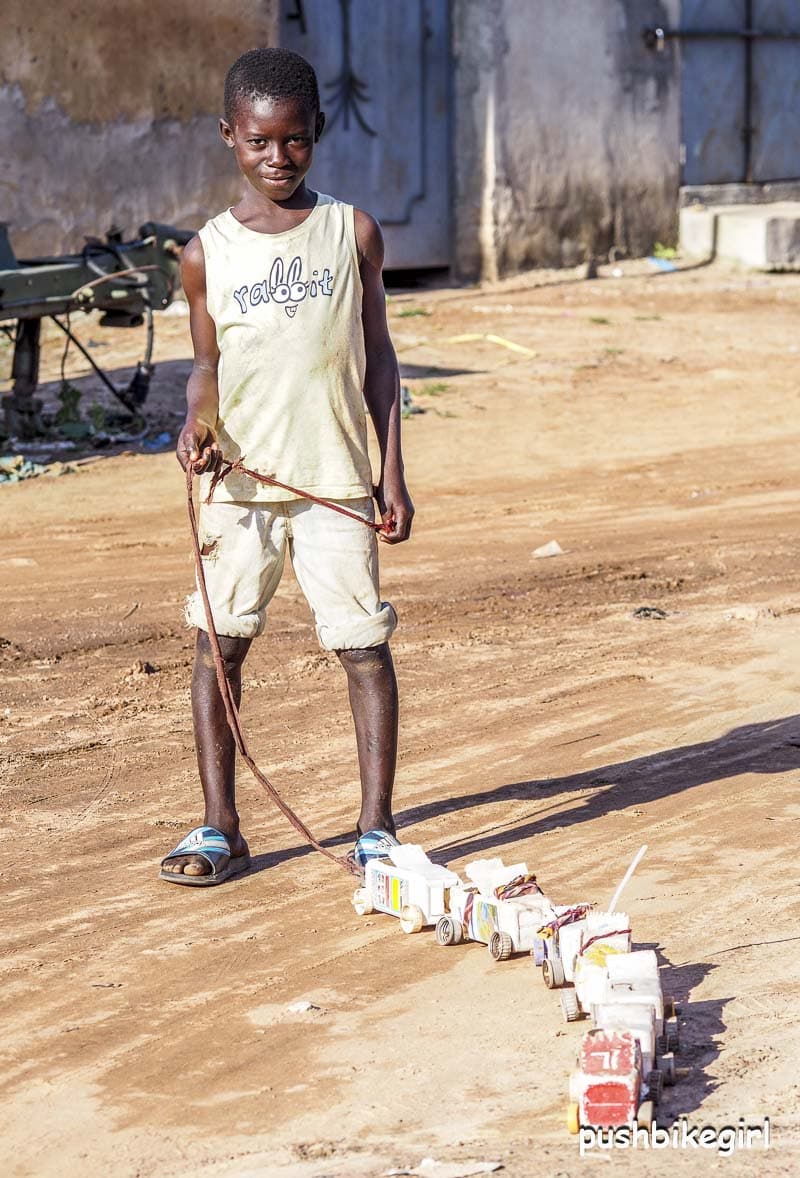
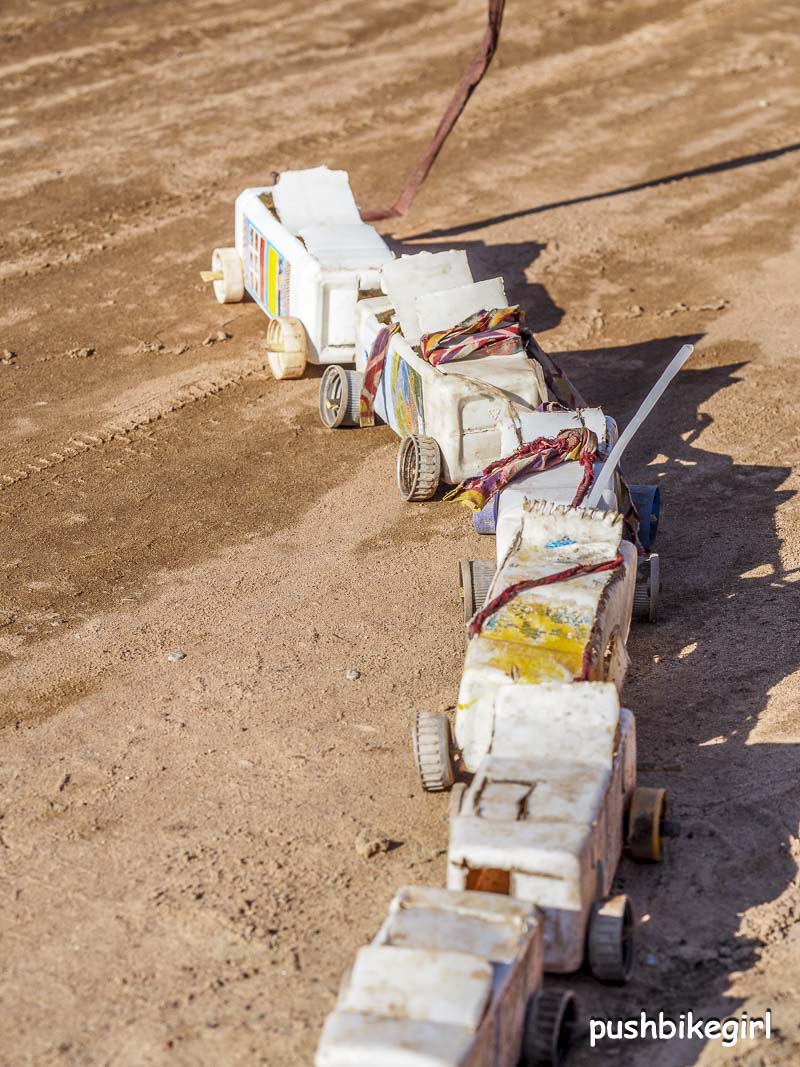
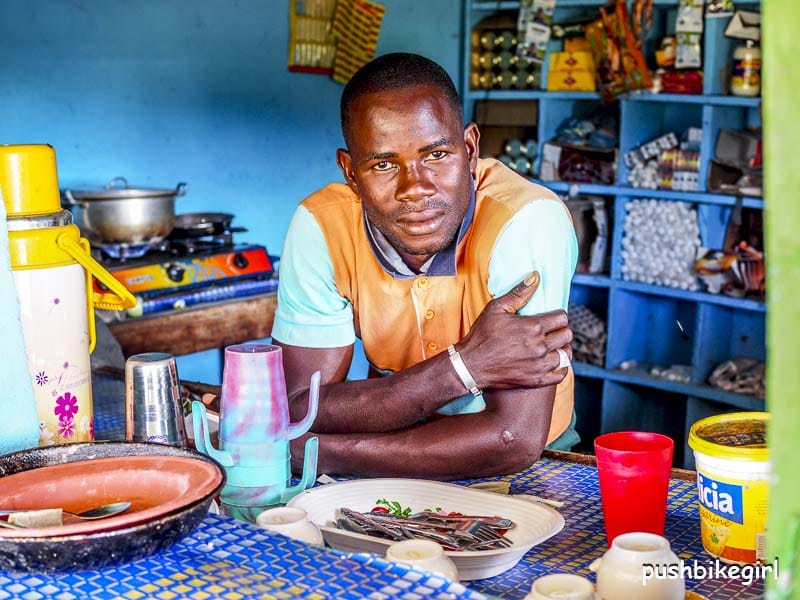
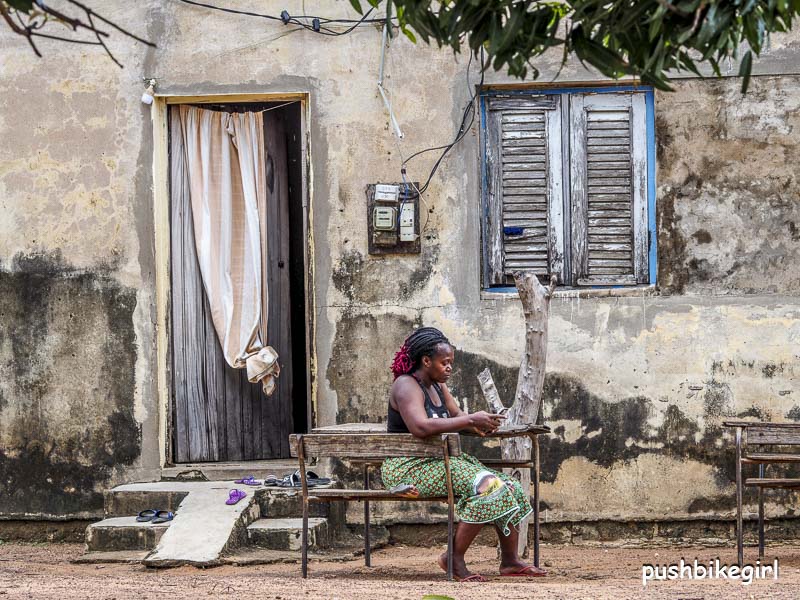
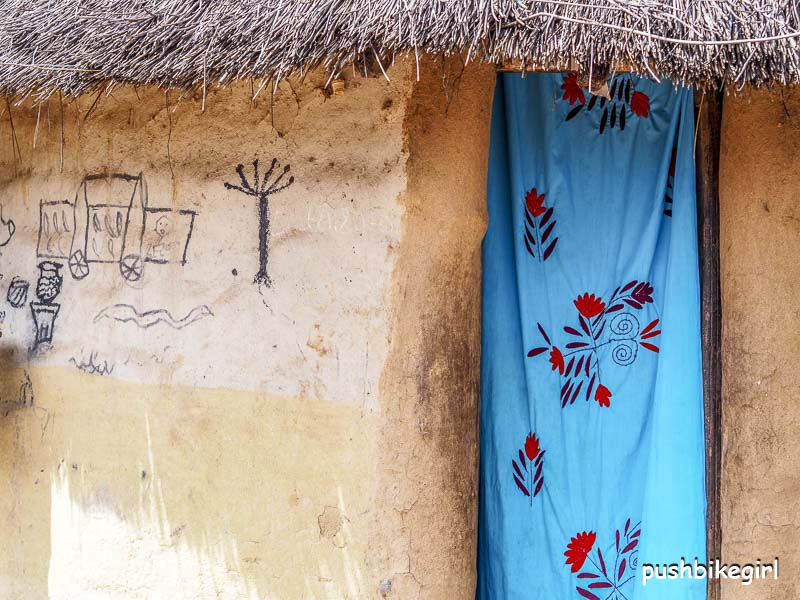
Before entering Samatiglia, I was in “flat tire mode” for a few days until after an intensive search one morning, when I finally found the culprit – a tiny piece of wire.
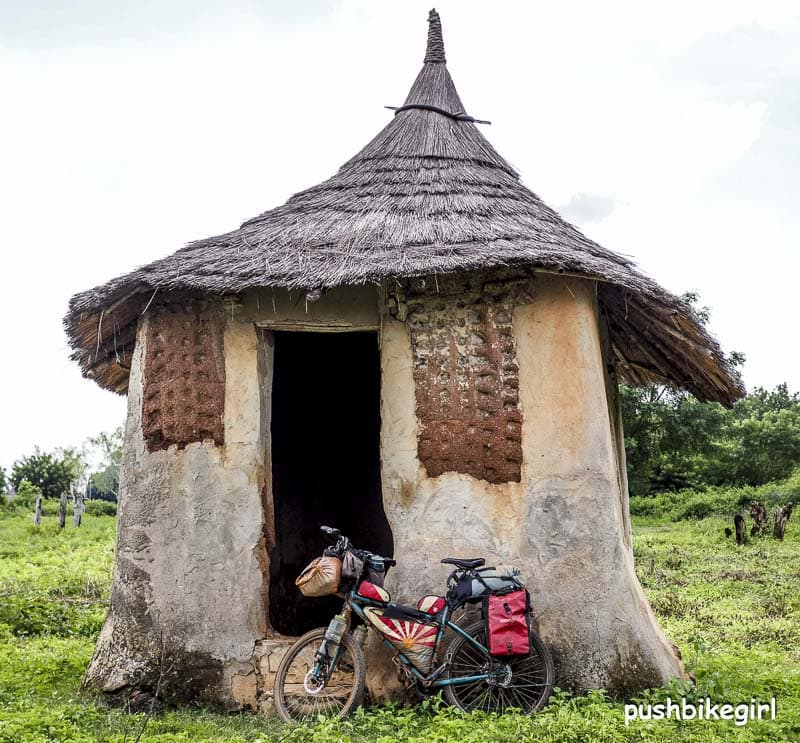
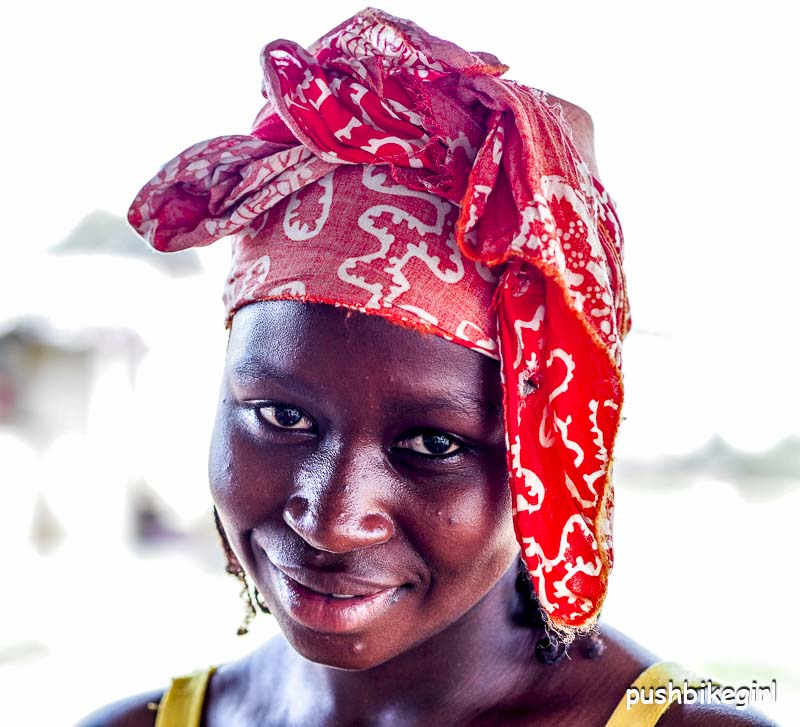
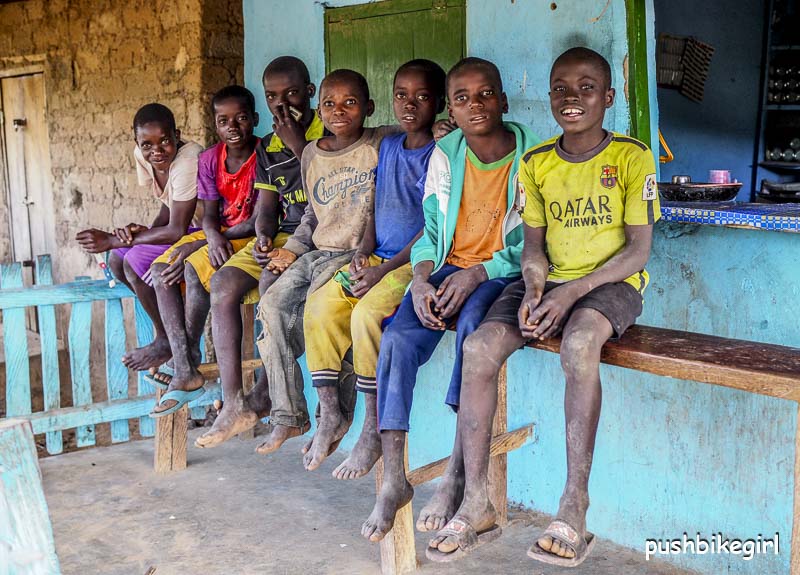
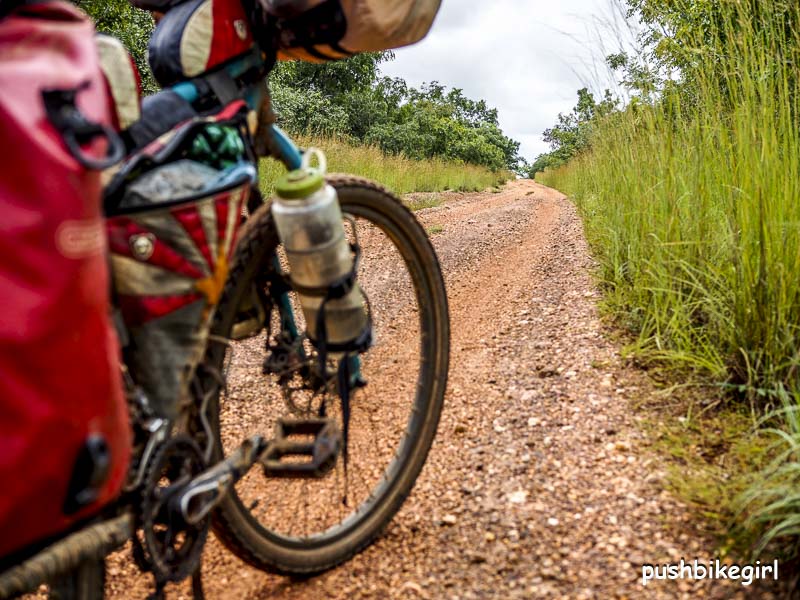
Via more villages, I went to Koura to another one of the interesting clay mosques found in this part of West Africa. Unfortunately, both Mali and Burkina Faso are too insecure to travel in at the moment, and so I wanted to experience at least some of the great clay architecture in Ivory Coast.
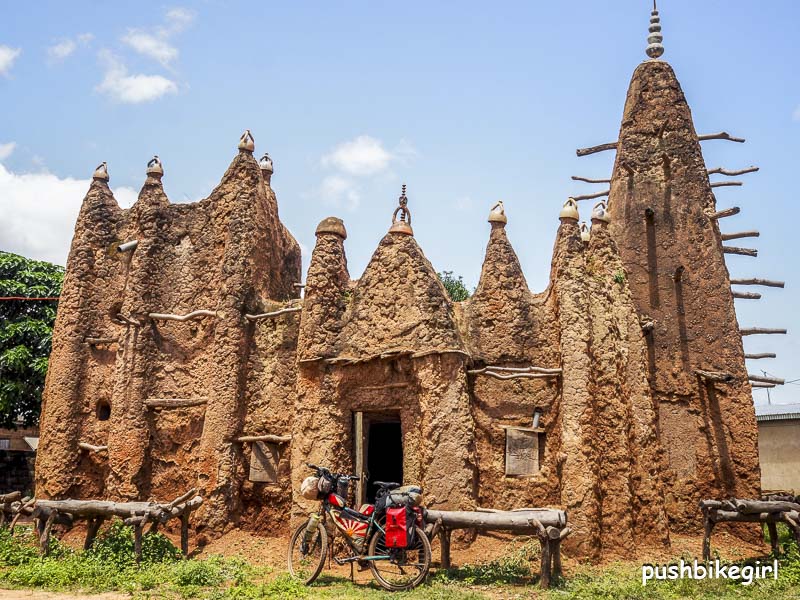
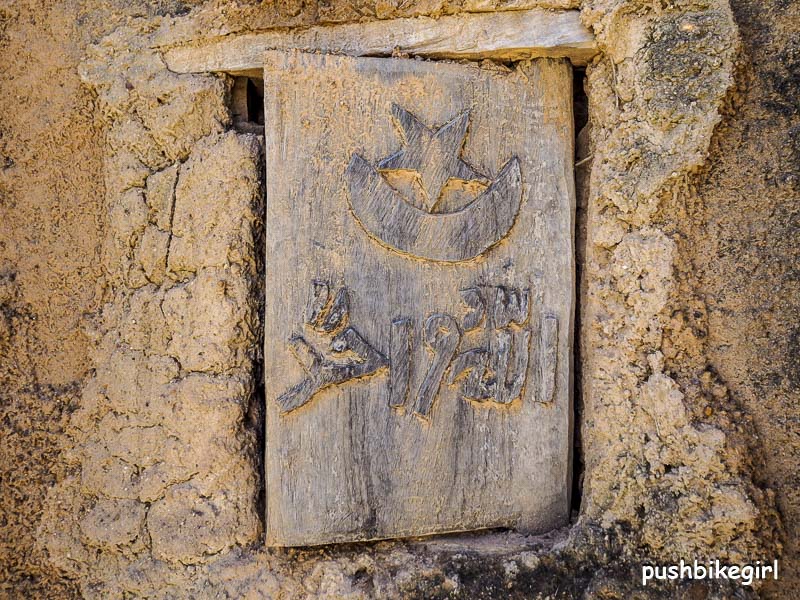

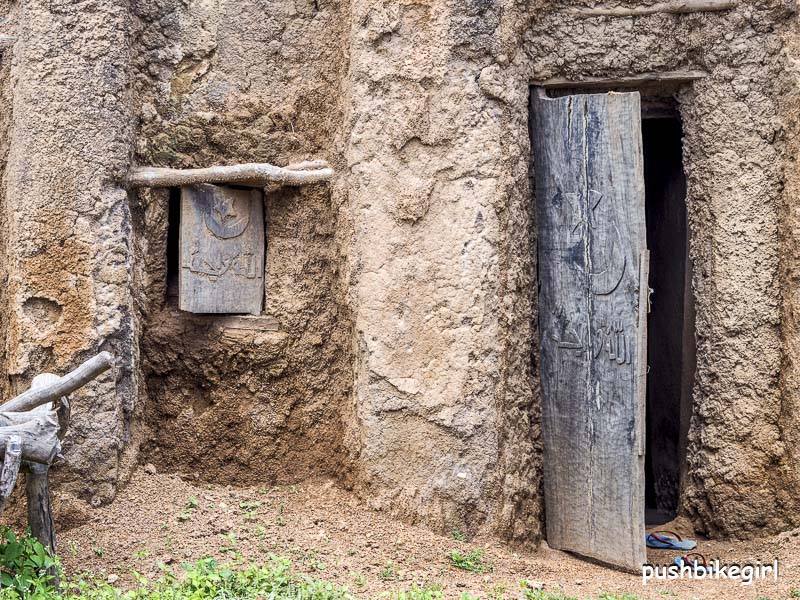
Like elsewhere in West Africa, the people were amazing, always cheerful, warmhearted, and helpful, a constant inspiration for me. Simply great, when you add to this, the lovely colorful outfits, which the women wear, and their pretty features.
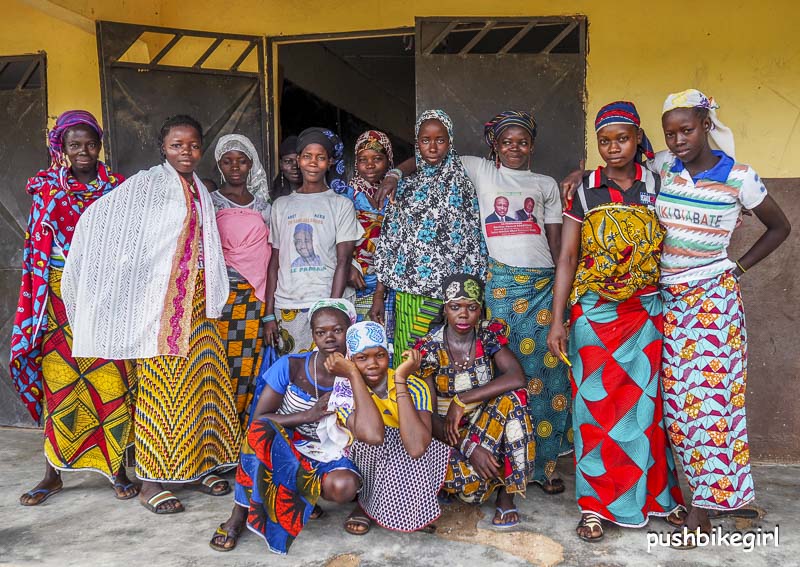
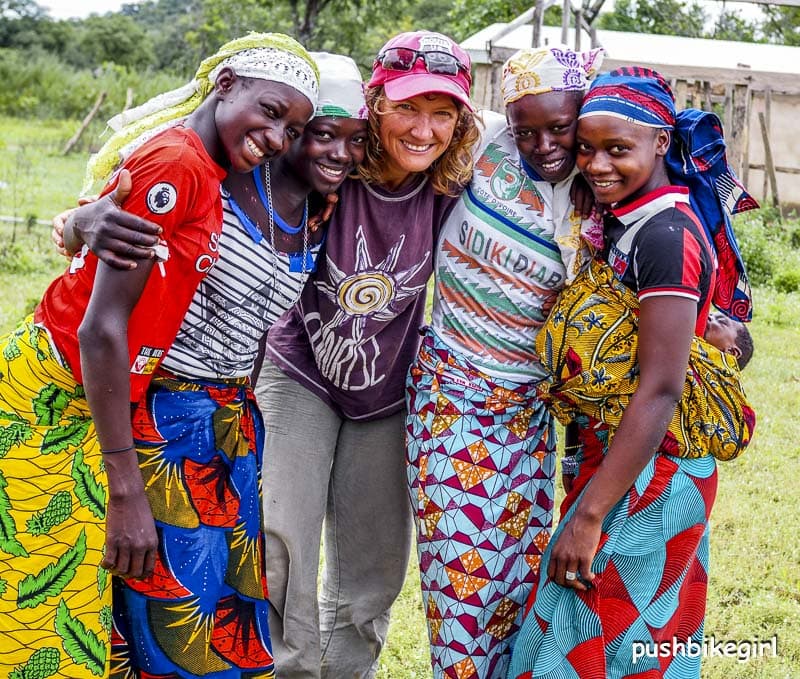
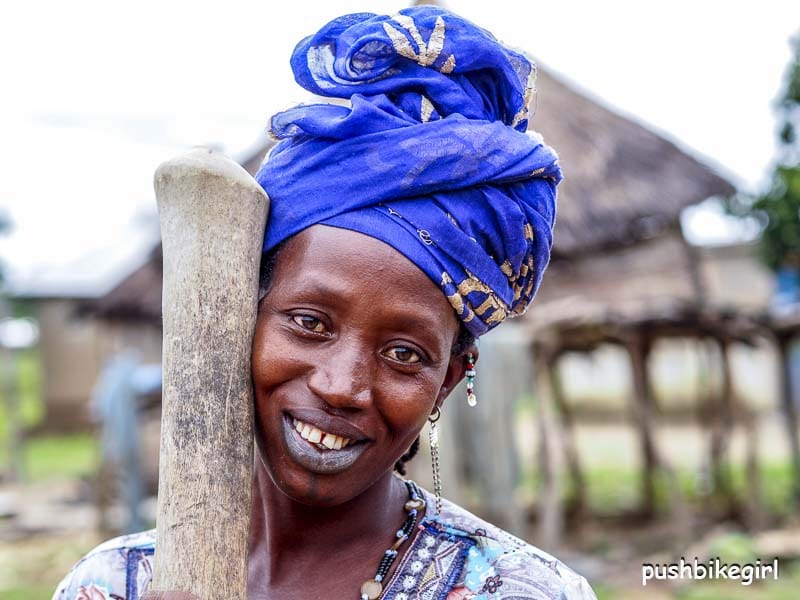
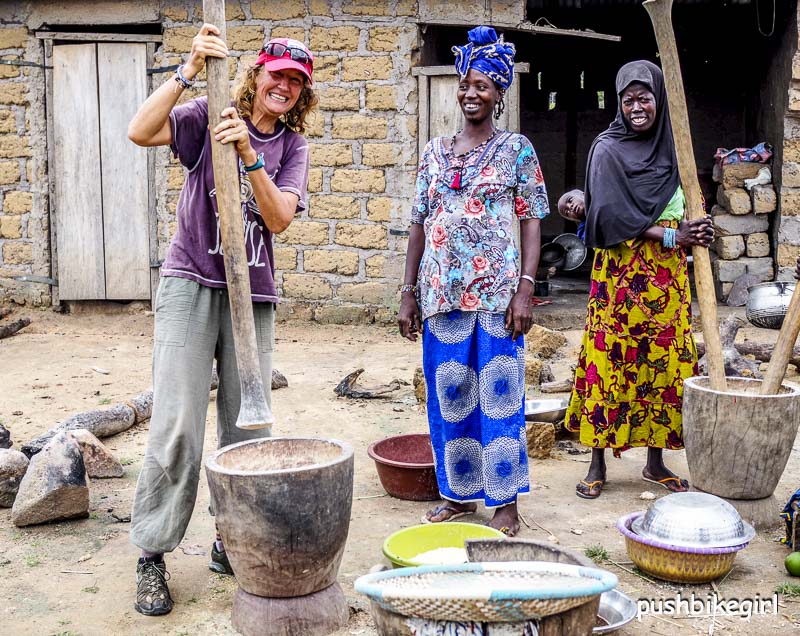
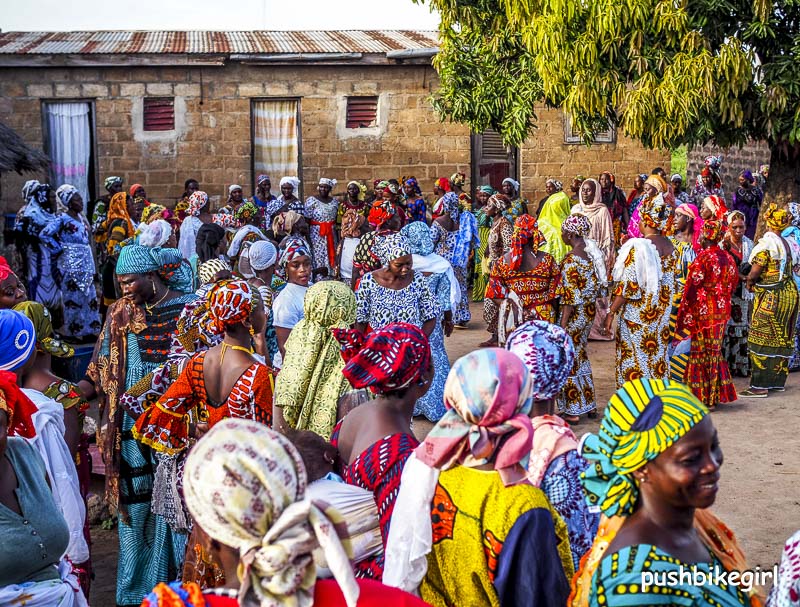
Something else positive in the Ivory Coast people hardly ever asked for money. NGO’s & Co didn’t seem to have left their negative marks here.
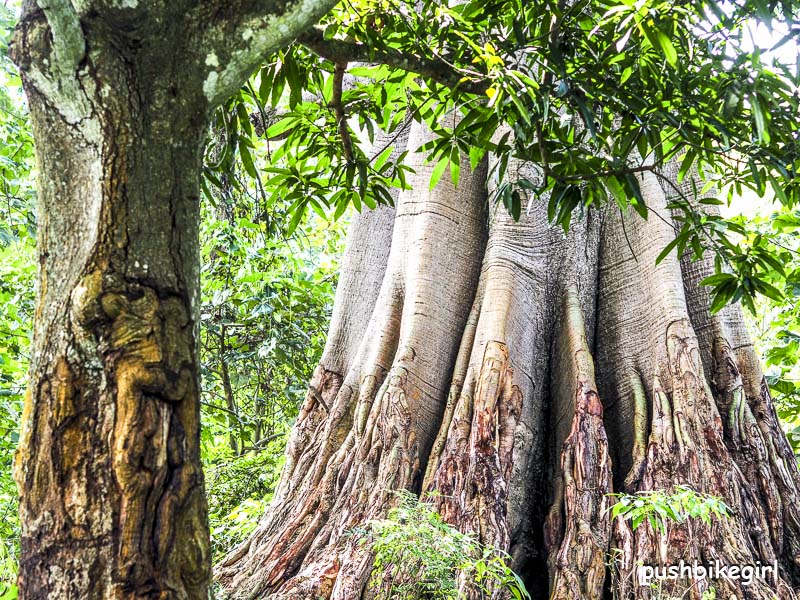
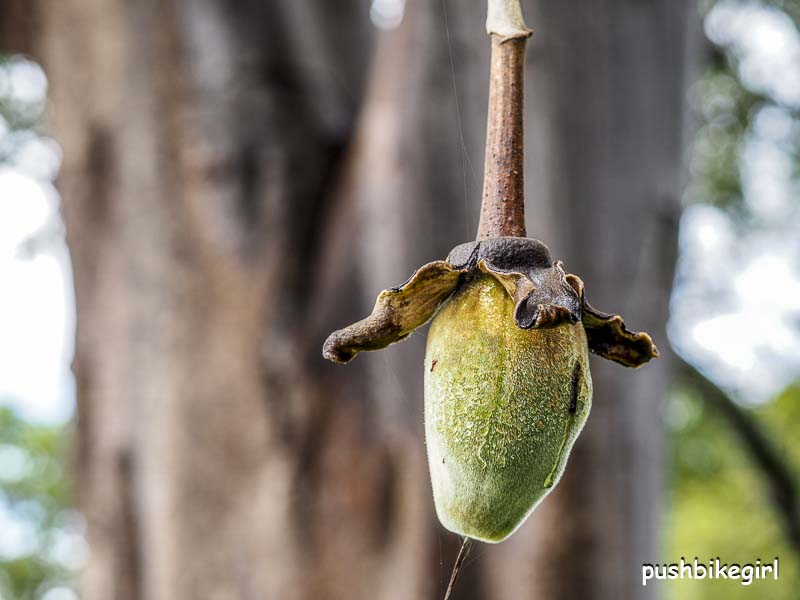
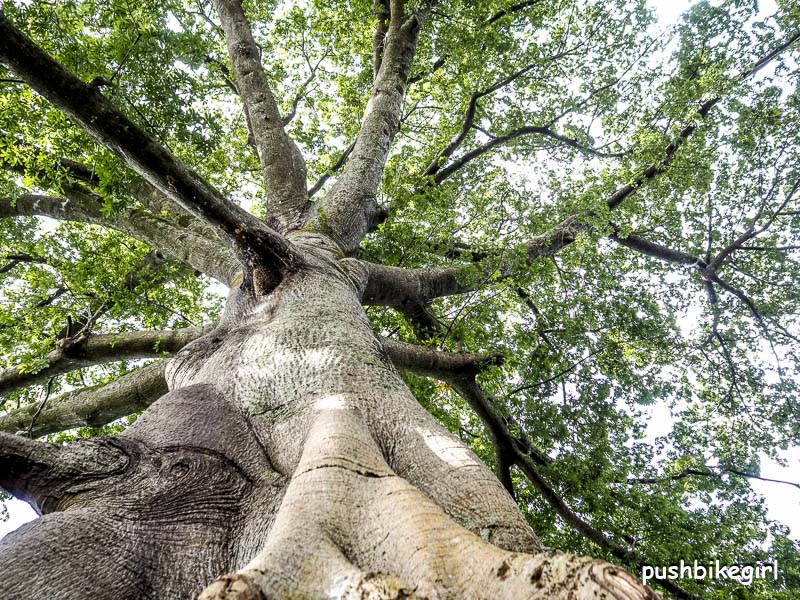
One evening shortly before darkness, I was about to set up my tent in the forest, when it started to thunder in the distance. “Great, another wet night.” I decided to wait and see before setting up the tent. It wasn’t long before the wind came up, and with it, the rain and thunderstorm – it felt as if the world was about to end.
I stood in the forest soaking wet and waited and waited an eternity, eventually cold I gave up hope and began to set up in the downpour.
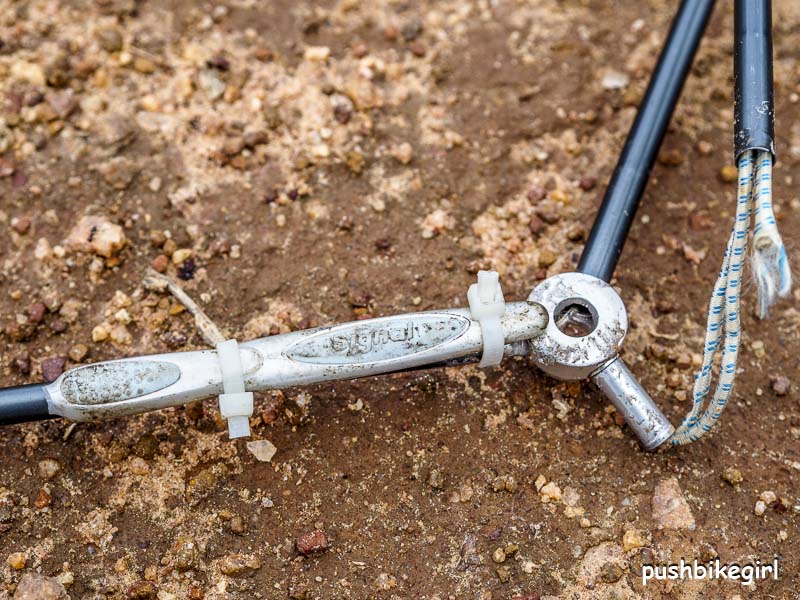
Poles in the sleeves, clipping tent to the poles and suddenly a loud “snap” and the tent collapsed. “No, please,” I moaned, realizing a pole had broken.
Now I had to open my bags to search for my spare repair parts; of course, this meant exposing everything, including my electronics to the still heavy rain. As always in these situations, my flashlight glowed feebly, the batteries being low, oh well, I didn’t want anyone to see where I was anyway. My bags were now holding as much water in as out.
I searched and searched but couldn’t find my repair sleeve, which I needed to repair the pole, but it was nowhere. A bit desperate, I started wrapping tape along with two pegs around the pole for a temporary fix for the night.
Of course, by the time the tent was finally up, everything was soaking wet inside and out. Oh well, one way or another, I had been wet for months now. Normally I sleep well in a tent, but always find it hard to sleep with the clatter of rain on the tent fly, so I usually avoid pitching when I know rain is on the way unless I can pitch under some other structure. Unfortunately, it rained all night.
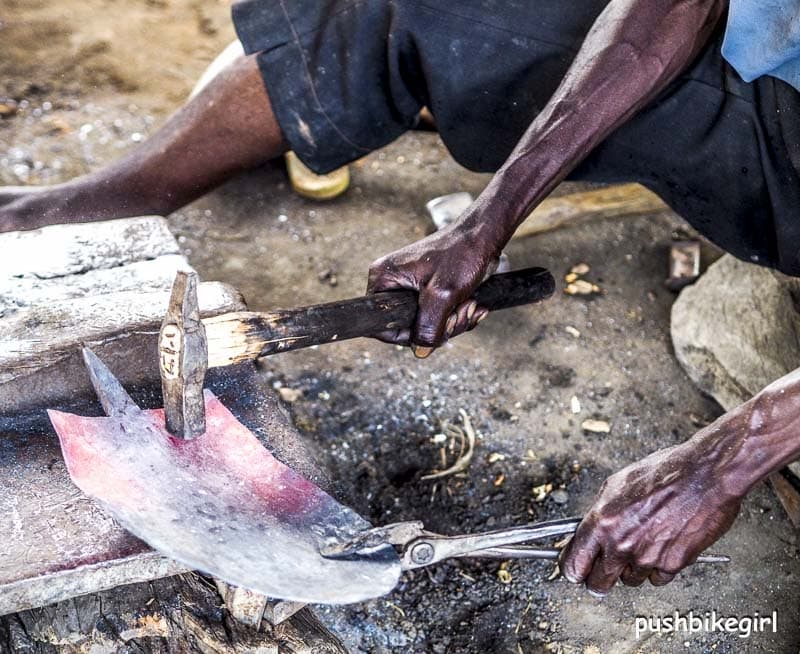
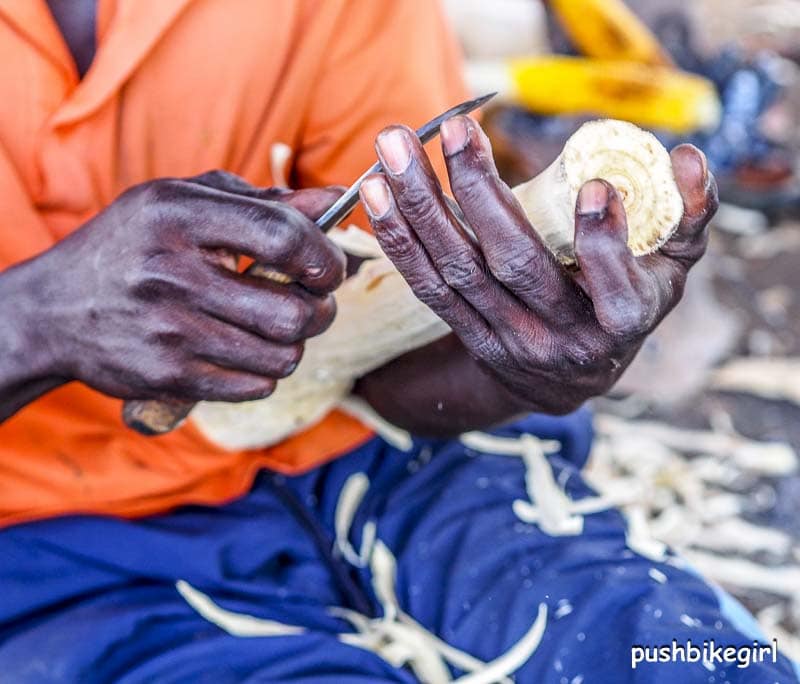
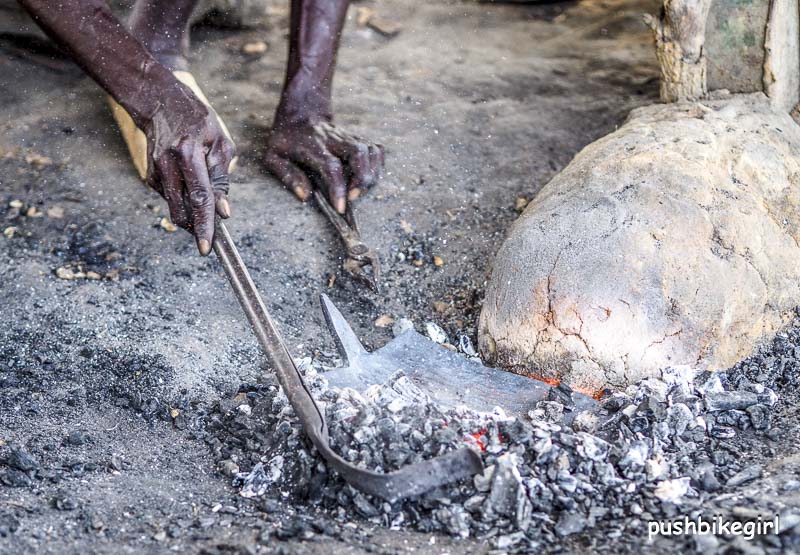
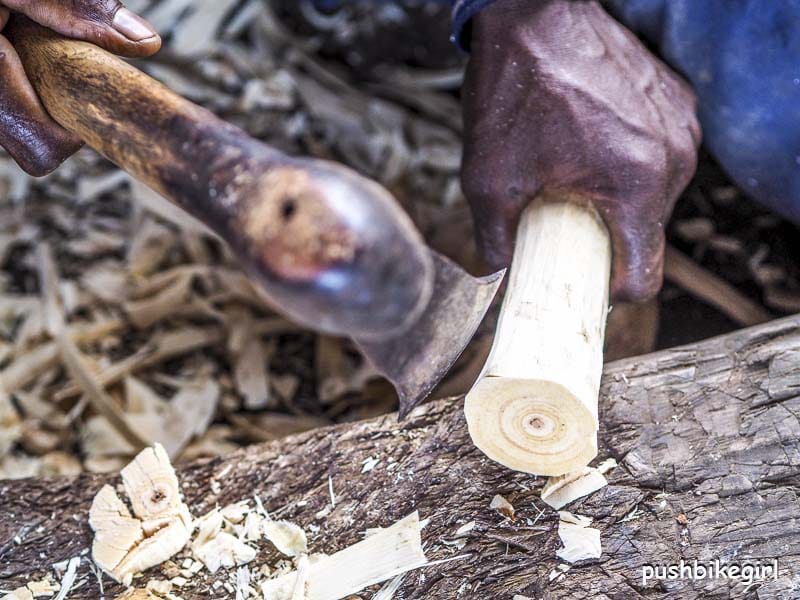

In Boundiali, I enjoyed my first ice-cream. You probably can’t imagine that it is worth a line in a blog to describe that I had an ice-cream. But these are real treasures out here. It was obvious it had been melted and refrozen a dozen times, but whatever, it was an ice-cream, and I savored every bite. You can be sure that I had a very special grin on my face that day.
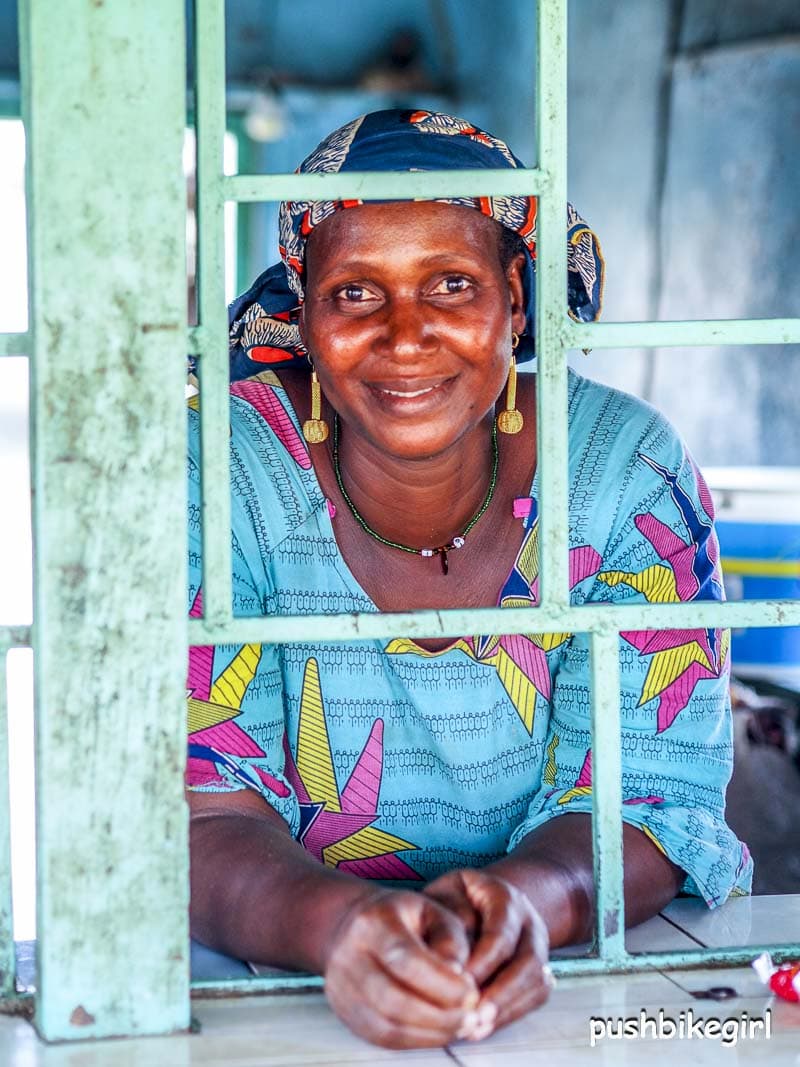

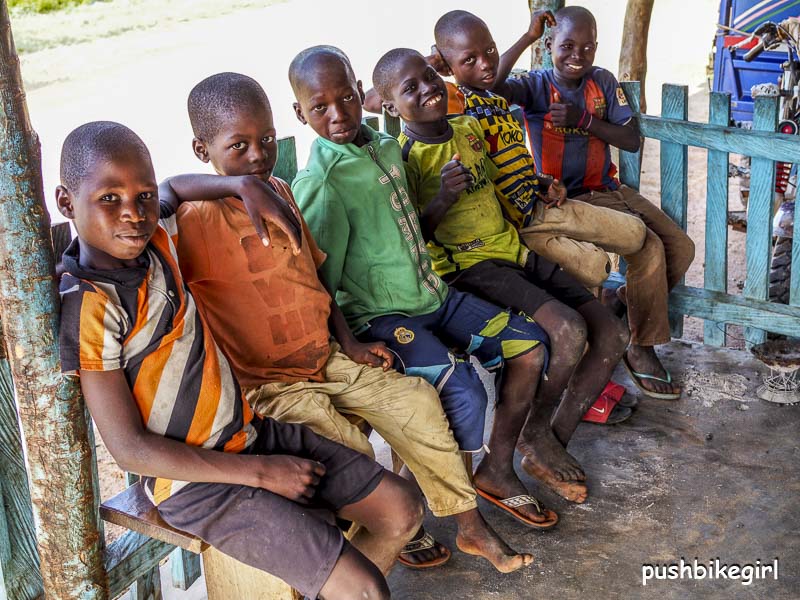

One day an ice cream treat, another the sound of brake pad springs bending and breaking, the second time I had heard this sound. My gear was taking a beating; hardly anything worked as it should.
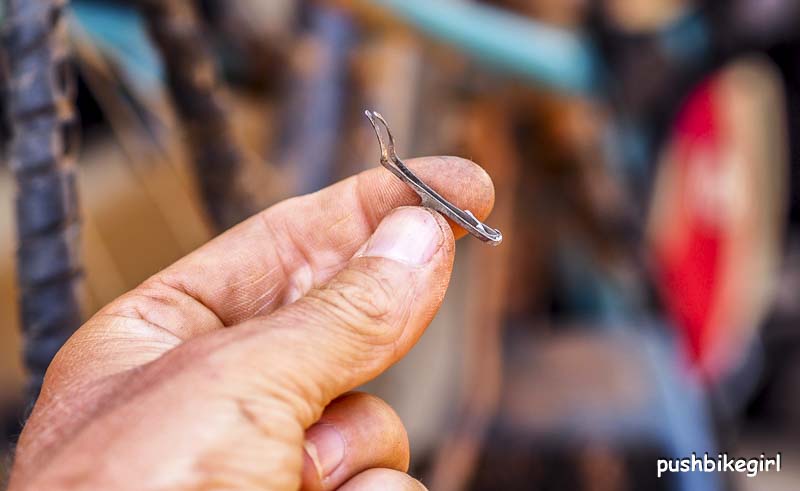
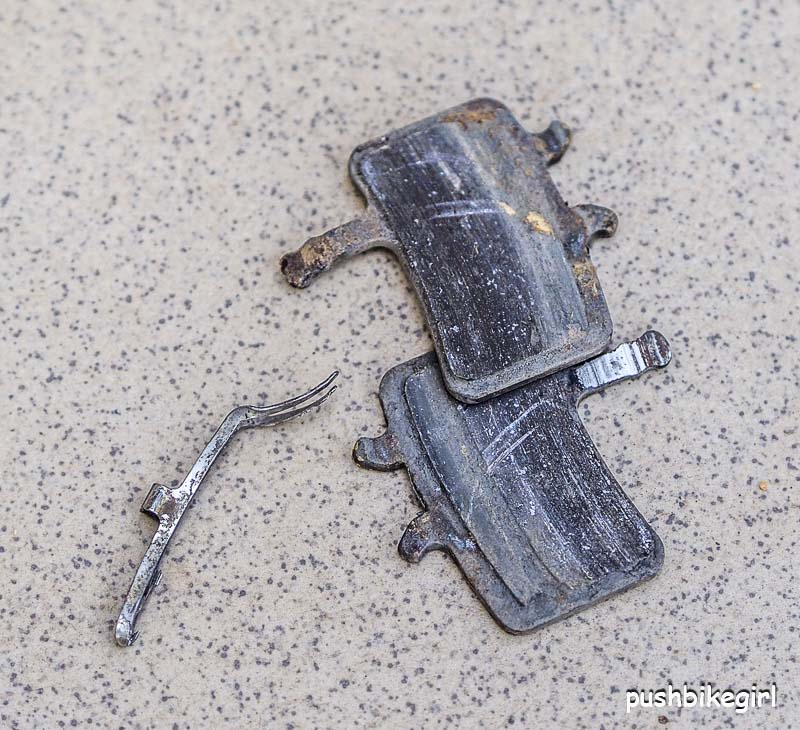
Niofin is a cute little town, not all that far away from the main road, with great architecture. However, I suspected immediately that foreigners come here now and then, because the people treated me like a tourist, not like a traveler.
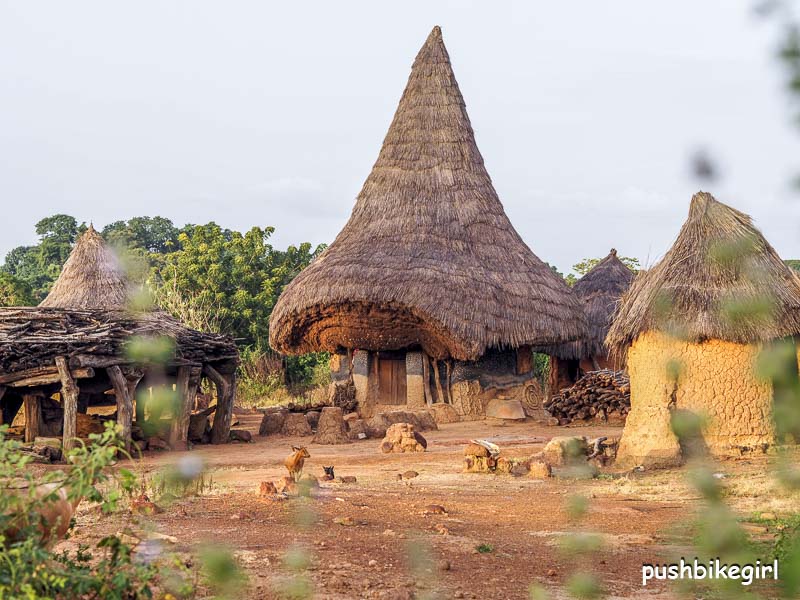
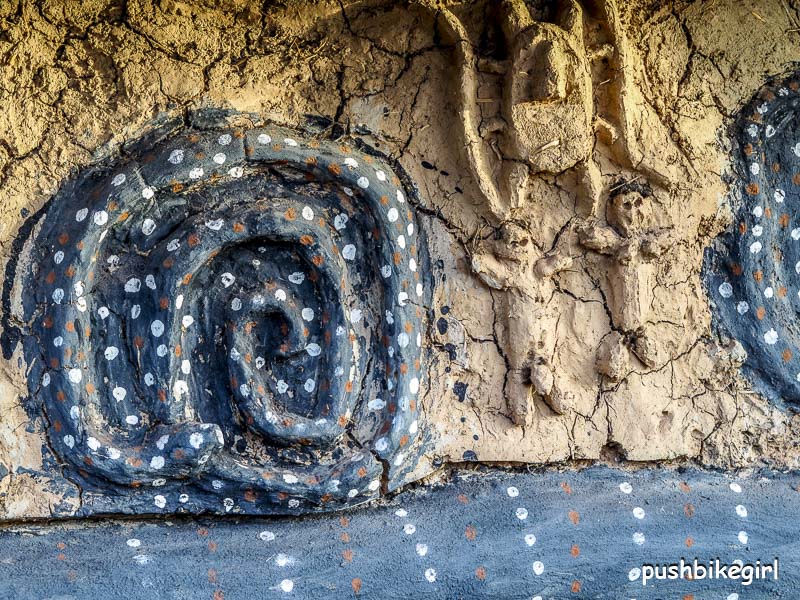
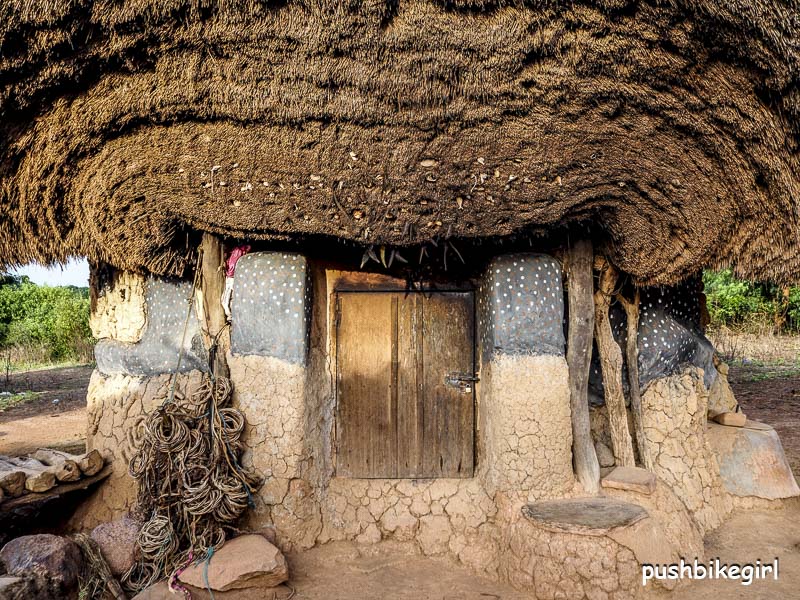
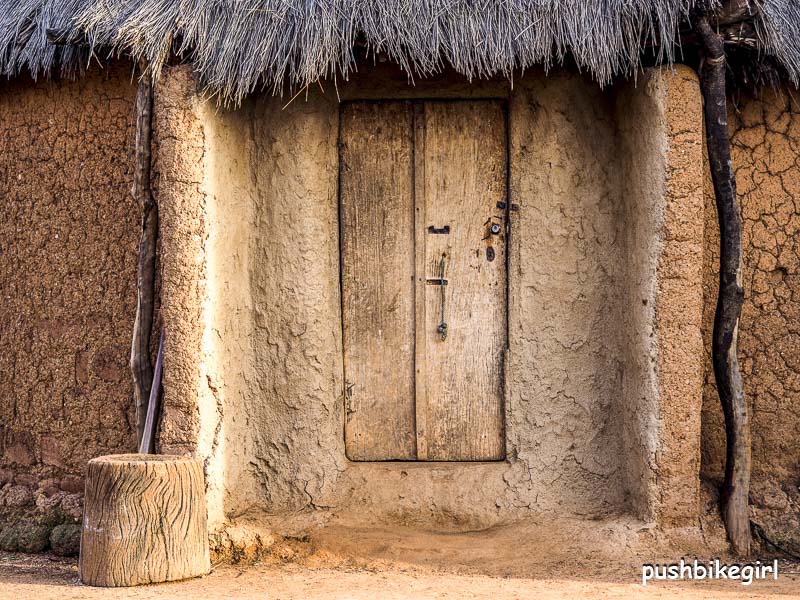
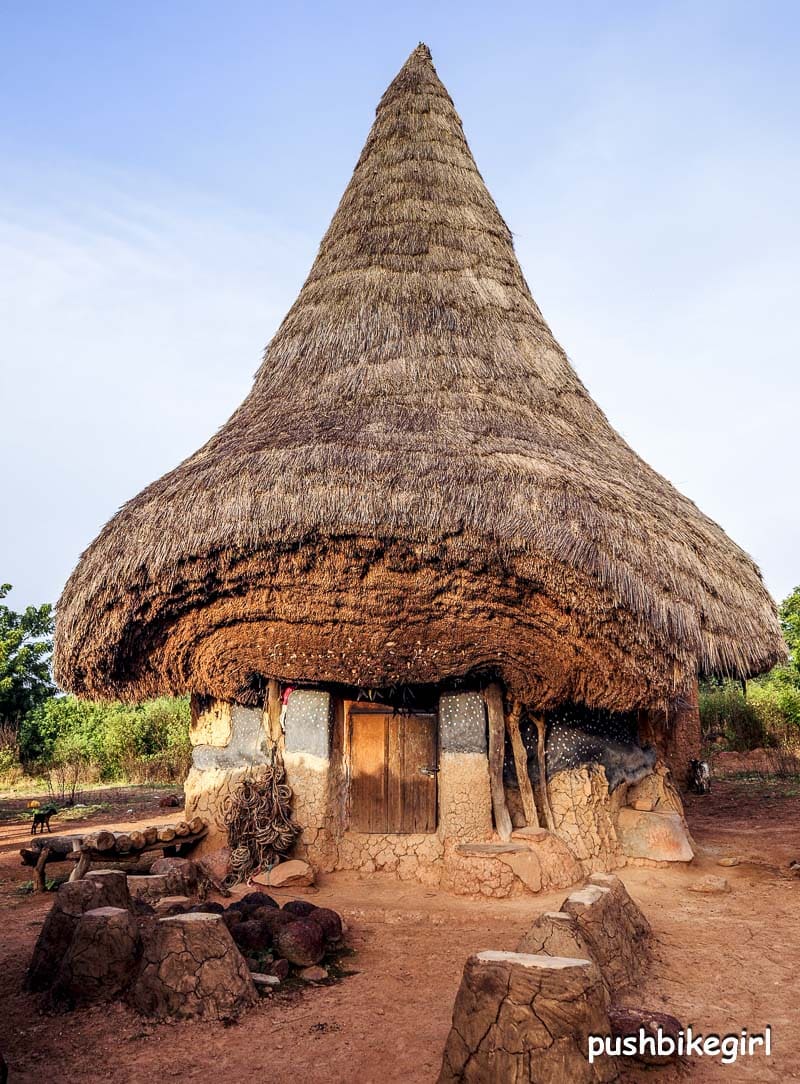
While riding a dirt road, I had put my phone in the front of my chalk bag bottle holder; when I managed to hit a deep pothole, the phone flew out and landed on the only rock far and wide. The display was totally ruined. “Super.”
In the city of Korhogo, I met an American missionary in a supermarket. Completely happy to be able to exchange a few sentences in English with an American woman, but disappointed when after only about the fifth sentence, she found she had to convey her faith to me. She felt the need to tell me the story of Jesus. Funny, the Muslims here never wanted to convert me.
I was lucky and found a cell phone doctor who changed the display and the corresponding electronics. My Chinese phone from Tecno isn’t, after all, the worst thing to own.
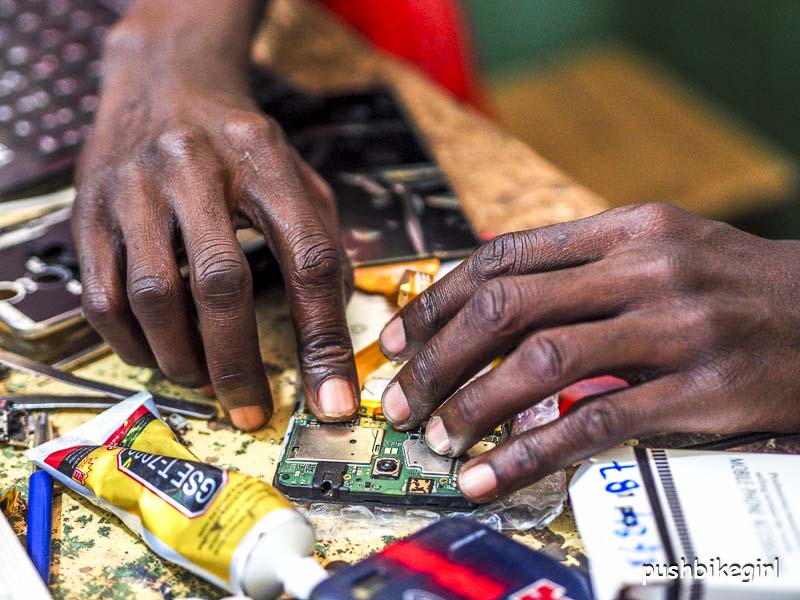
In Africa, almost everything can be repaired – not just thrown away and bought new, like in our society. Necessity is the mother of invention.
Enough to make one scream when you hear someone say again, Africans are polluting the environment! Even if the garbage piles up here on the streets, the few resources that are wasted here per inhabitant are really the smallest problem that we have right now world-wide.
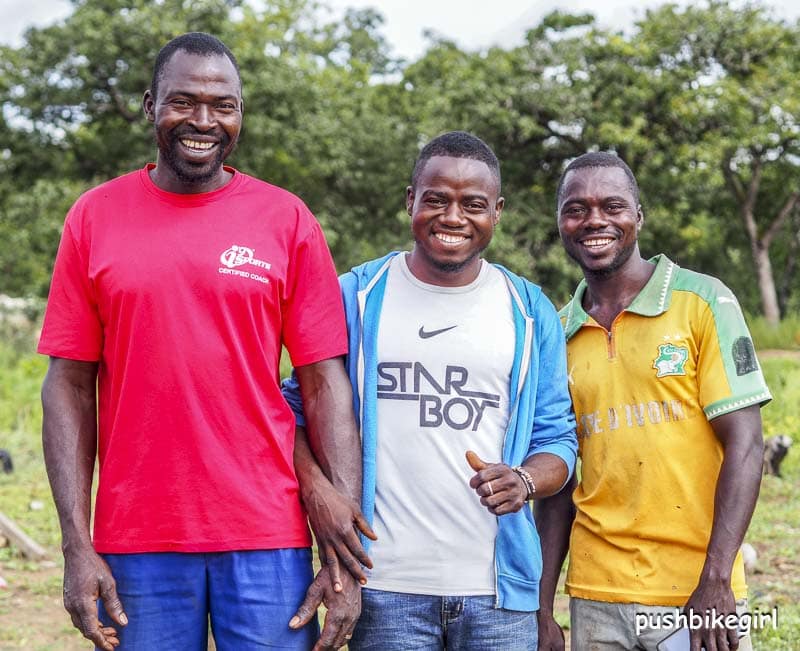

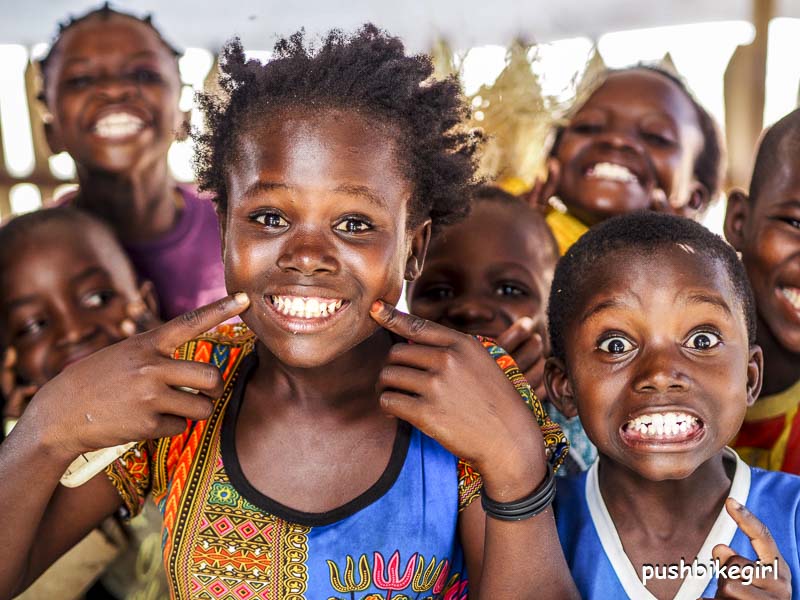

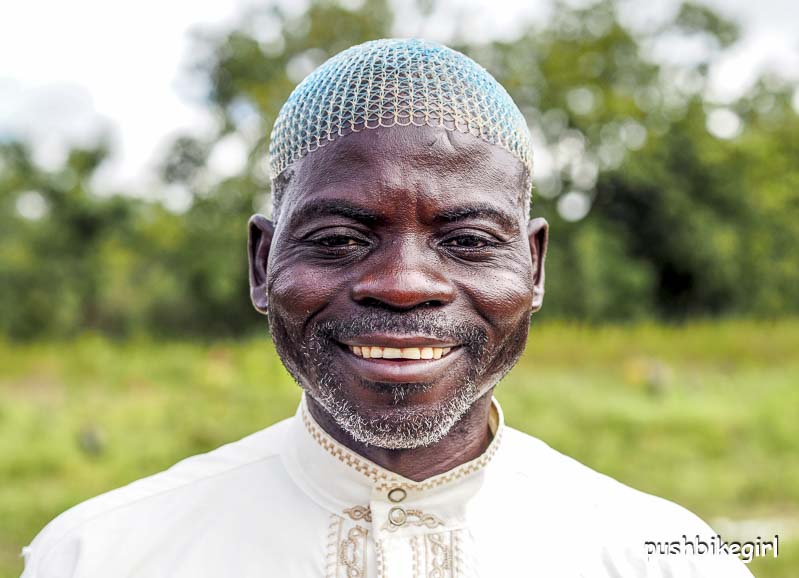
The population explosion, on the other hand, could be seen as frightening.
In 1950 there were 227 million people in Africa. Today 1.3 billion people and it is estimated that by 2050 it will be 2.5 billion. 2100 already 4.4 billion.
In the year 2100, the worldwide population is estimated at 11.2 billion people. Today we are 7.6 billion.
Today, almost one in six people is an African; if the growth rate remains the same in the year 2100, this would mean one in every 2.5.
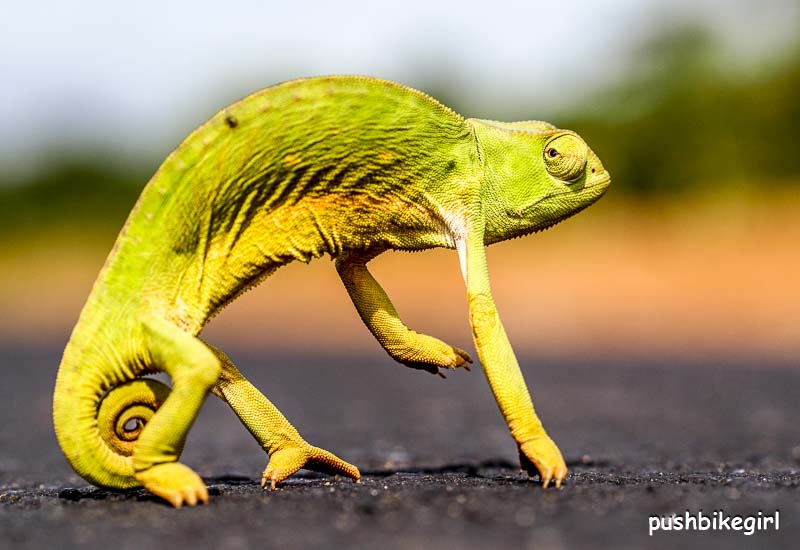
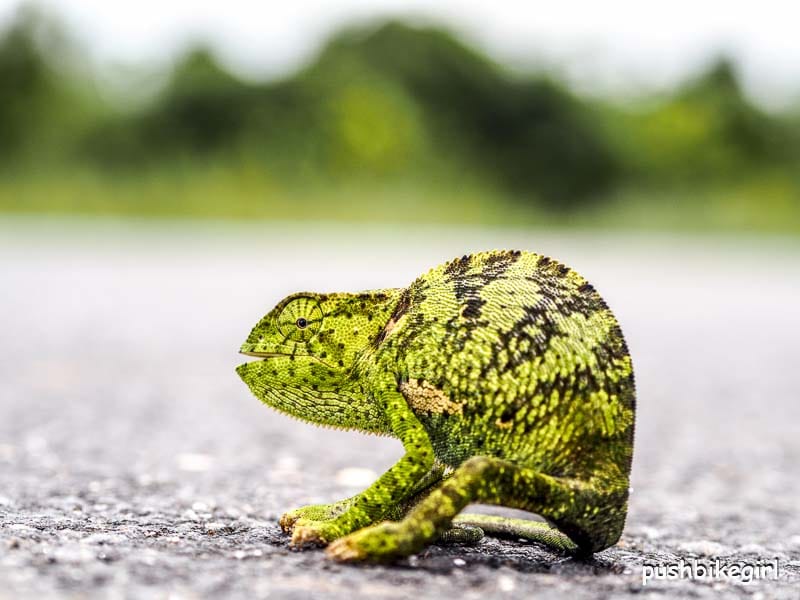
The road to Kong is a brand-new tarmac road. Who built it and why, I don’t know, I only know that it was the best road in the country even if it was far away from everything?
It was on this road I heard “Toubab – Toubab” again, the same name the Foula people use for a white person in The Gambia and Senegal. It is always impressive how many tribes, languages, and cultures there are and how far they are spread across the borders drawn by the colonial rulers.
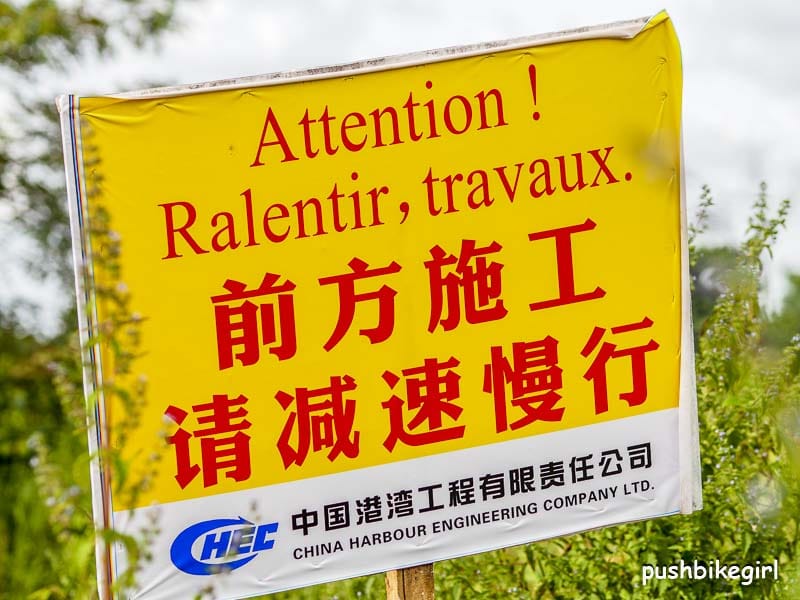
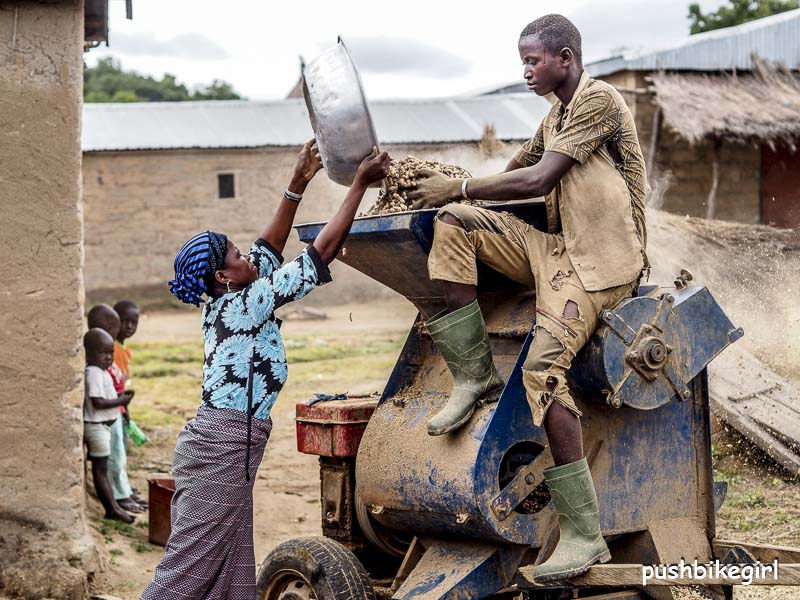
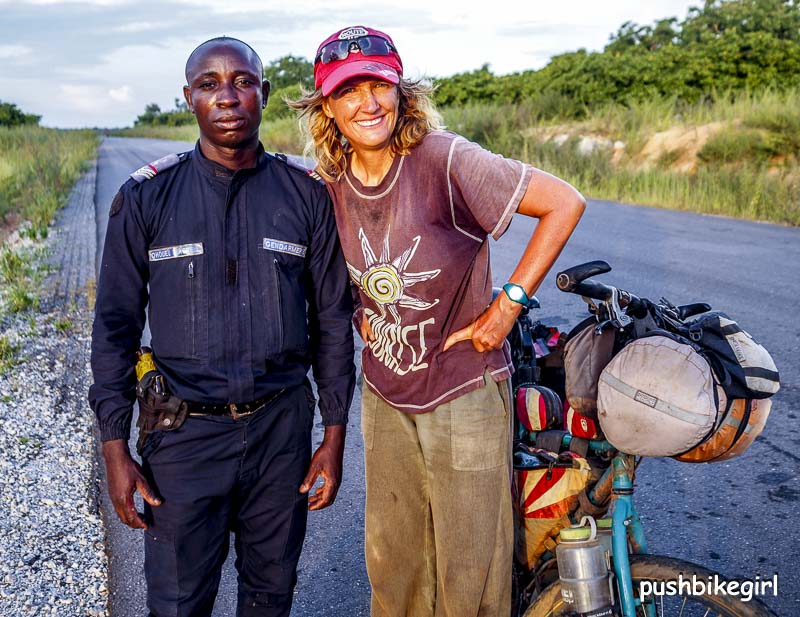
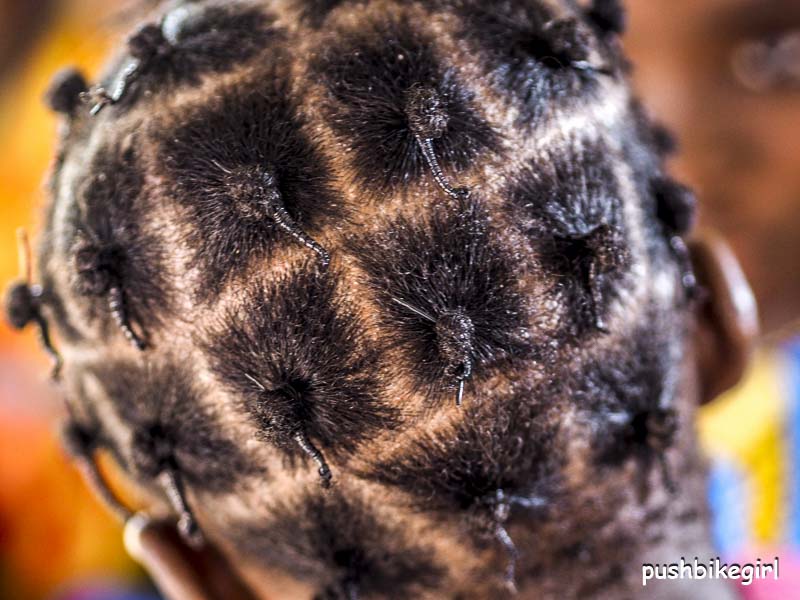
There are also moments when someone speaks in French, but someone else replies in another language. So, he understands French but cannot speak it while the other person understands his language in the same way but doesn’t speak it as well.
It is hard to imagine what immense impact these language barriers alone have in these countries. Sixty different languages are spoken in Côte d’Ivoire alone. The conversations are, therefore, mostly on a very basic level because they are always held in a foreign language unless you are talking within your own family. Even in one village, different languages are spoken. How could a society with this problem develop?
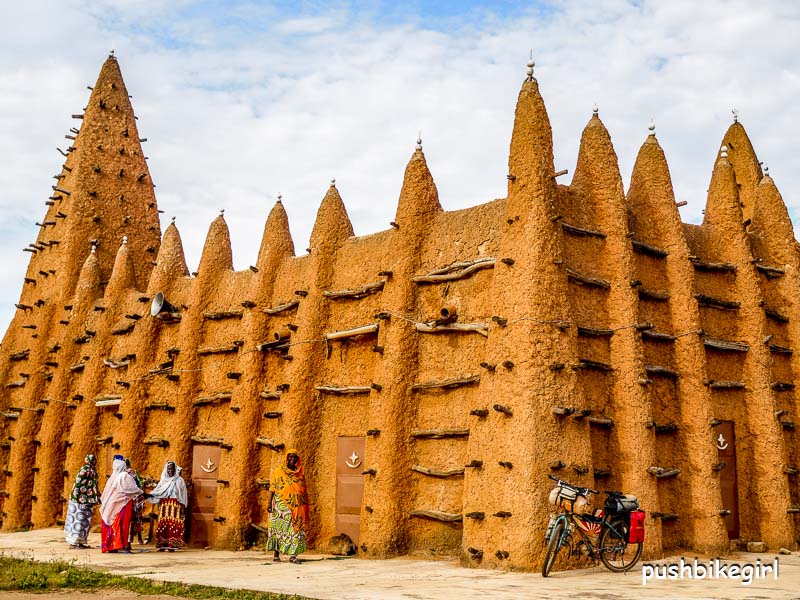
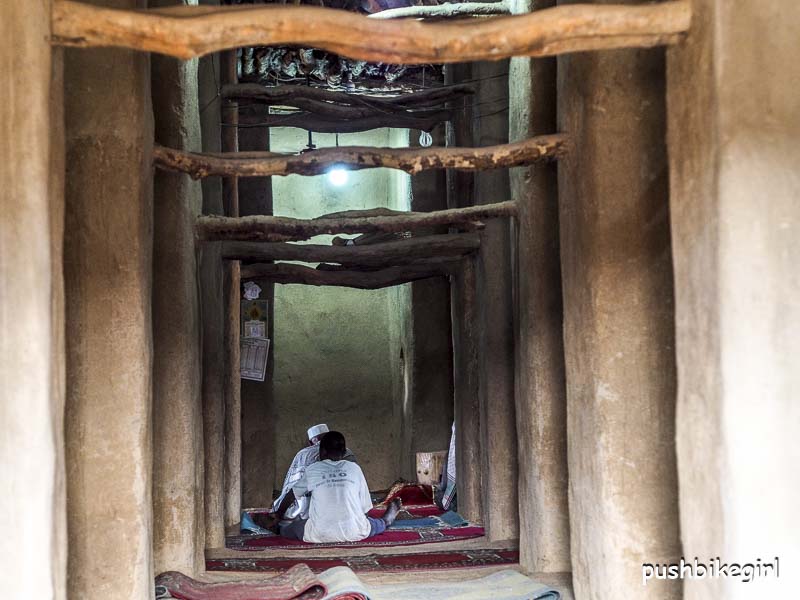
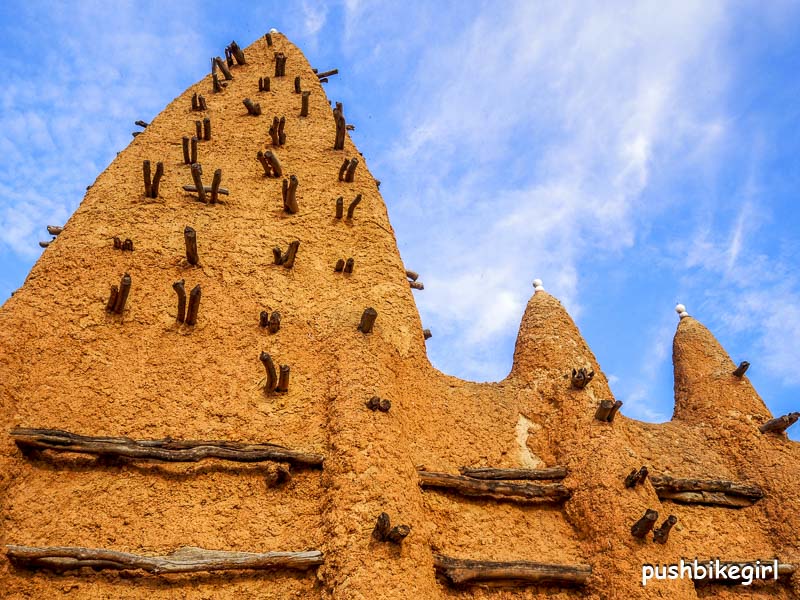
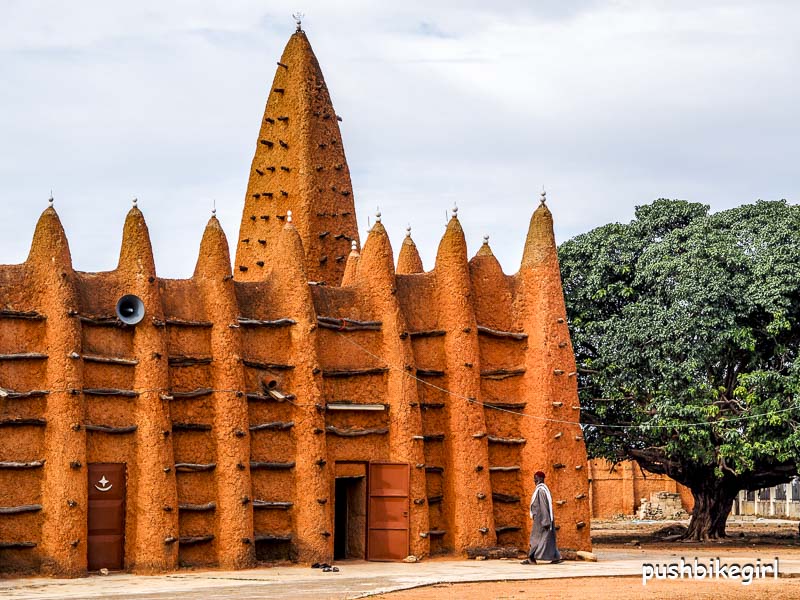
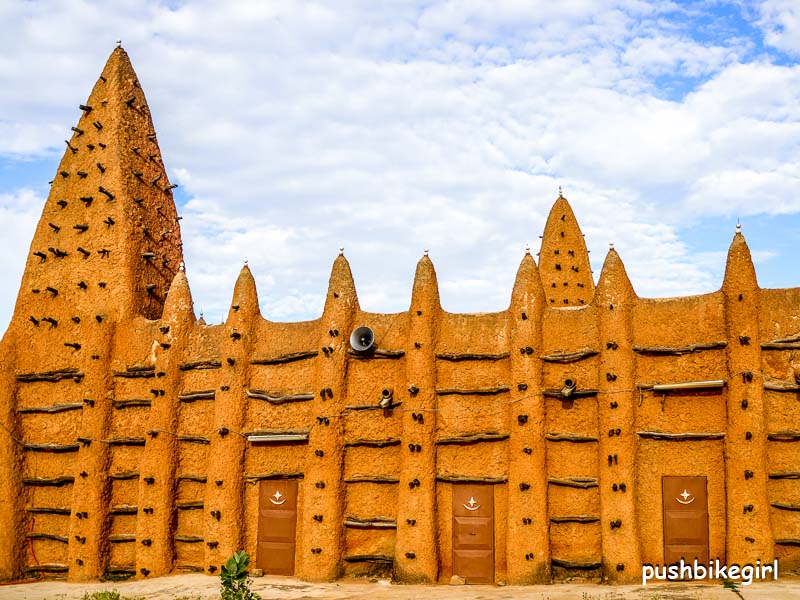
Kong had the most important clay mosque in the country, and I was impressed by the building. The entrance for the women is to the left, the entrance for the men to the right.
Inside the whole ceiling is covered with bats, a very dark interior, not what you would expect from the outside.
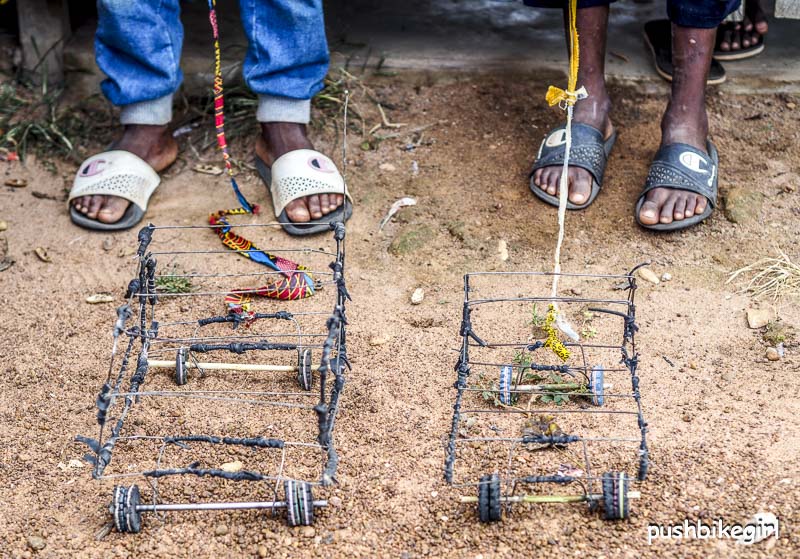
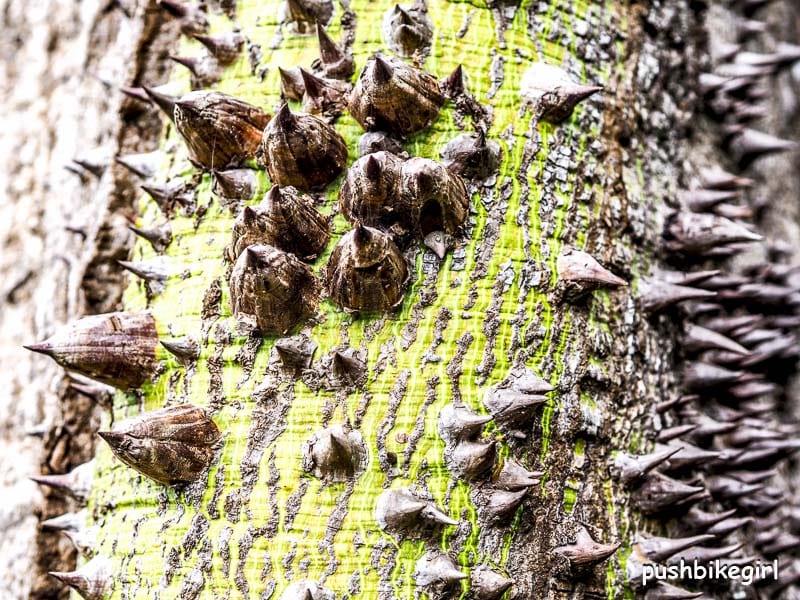
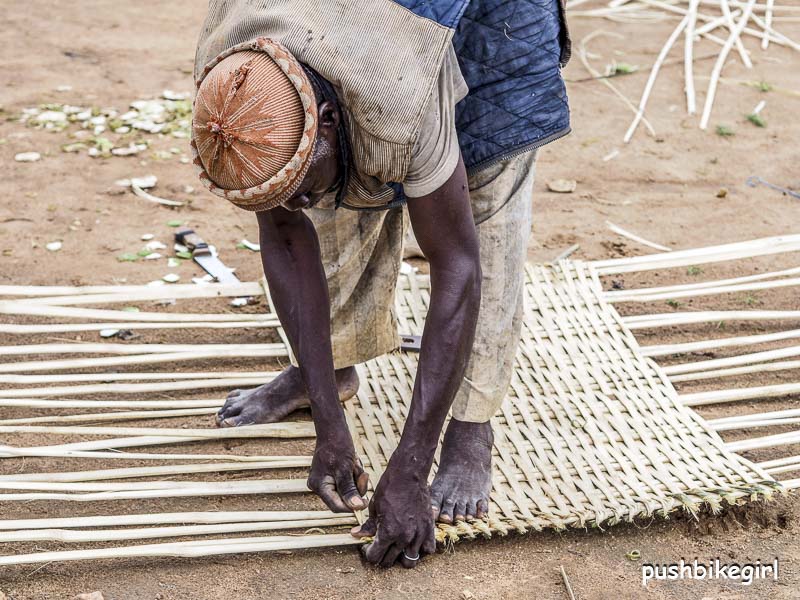
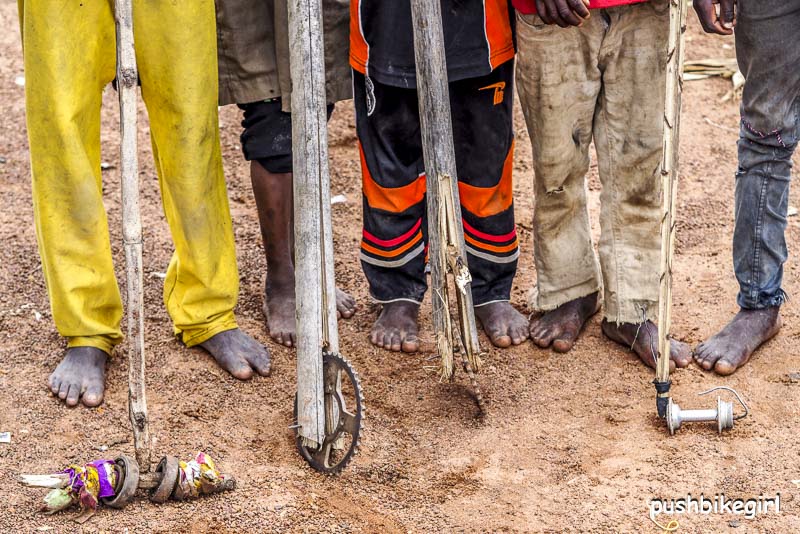
I ate baked bananas with fish at a small stand and, although I had been eating at such food stalls for months and months, I had an uneasy premonition.
The lady took every single piece of banana in her hand, kneaded the pieces beautifully through her fingers, handed the dirty banknotes of the other customer in between, and then put everything bit by bit on my plate.
Of course, there were flies everywhere and it looked anything but appetizing, but that wasn’t anything new, just the way things were every day.
It didn’t taste bad, but I knew something was wrong with the food.
I looked for a camp spot, and by the time I had the tent set up, my stomach was grumbling fiercely. Unable to fall asleep, I knew I was in trouble.
One minute I was lying in the tent trying to survive and the next outside in the bushes surrounded by hordes of mosquitoes suffering through diarrhea and vomiting attacks throughout the night.
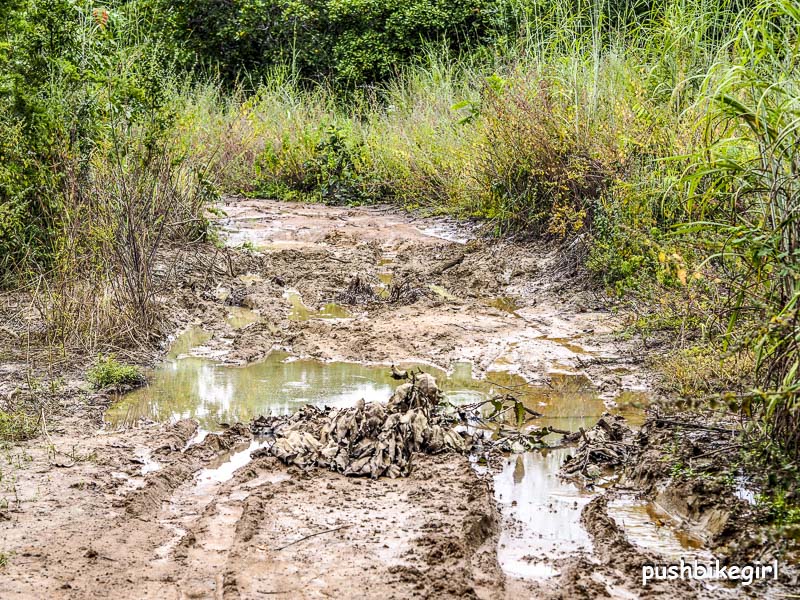
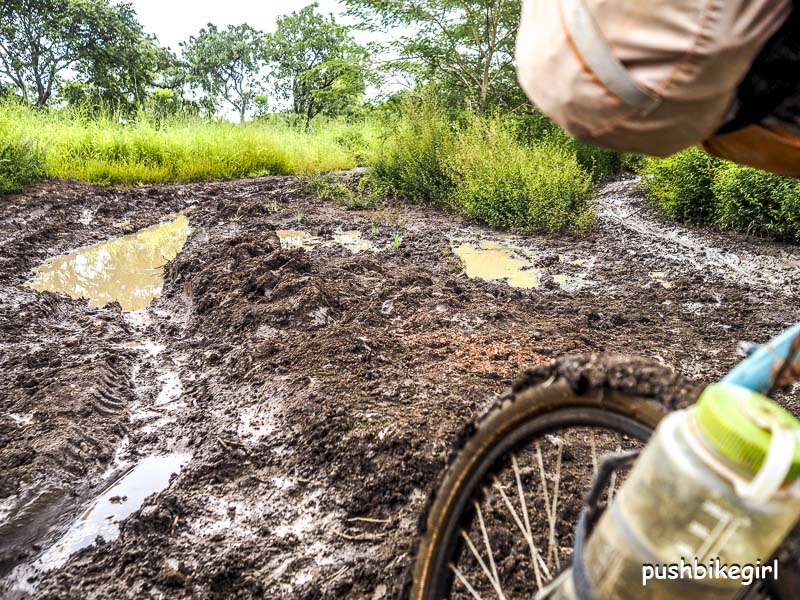
Completely tired and worn-out, I packed my tent in the pouring rain the next morning, because I needed water. I dragged myself to the main road and wanted to look for a school to get some more sleep, but so close to the border to Burkina Faso, the police stopped me and wouldn’t allow me to find shelter in the area, supposedly it was much too dangerous.
They wanted me to spend the night with them there, that was safe. But I didn’t want anything to do with this idea. No way was I going to spend the night in an open shelter with a palm roof and no room to set up my tent. And where I would have had to listen to the men’s conversation half the night, I was way too tired for that.
“Then at least cycle to the next town and spend the night there in the hotel,” said one of them to me.
“Thirty kilometers through the pouring rain, a sandy and catastrophic track and nothing in my stomach,” I replied and thought, well, whatever and bowed to the instructions.
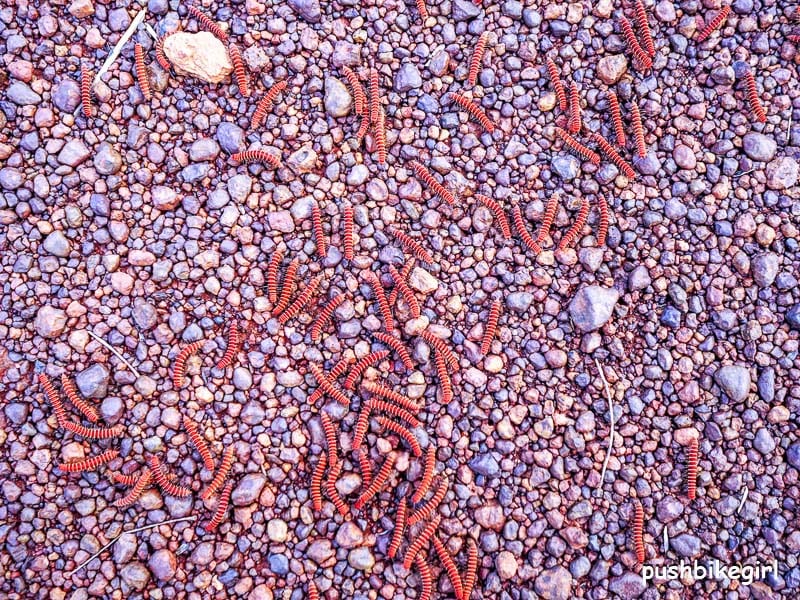
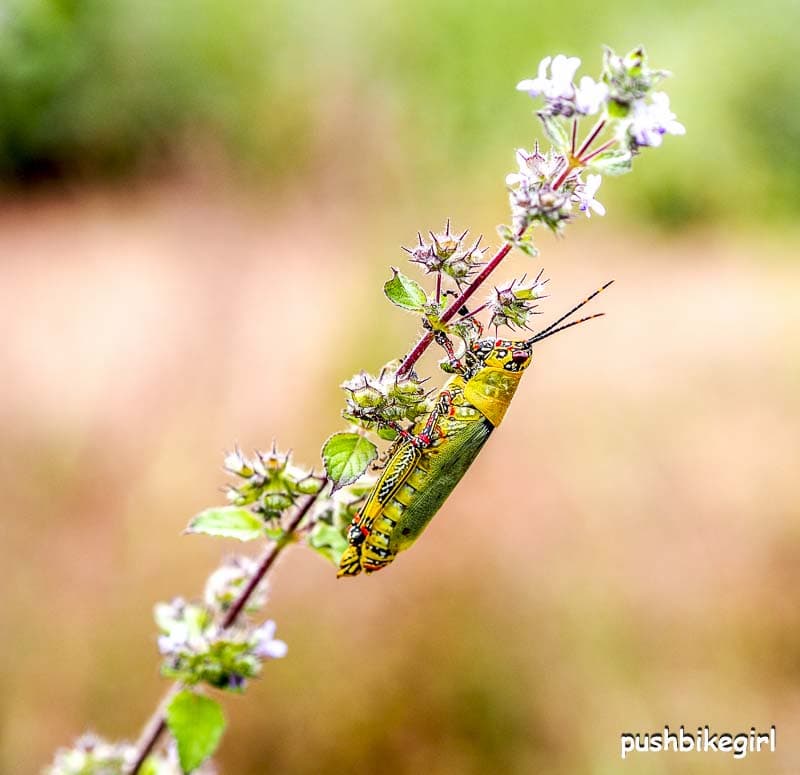
So, I kept going and even got an escort, who knows why. The hotel turned out to be a safari camp, which only had expensive rooms available. In the end, I slept in a school again, that was the place the village chief assigned me.
The next morning, I cycled on with new strength towards Ghana. The road was located all along the border of the Comoe National Park. The grass was so high that I knew that I wouldn’t see a single thing. But monkeys crossed my path several times.
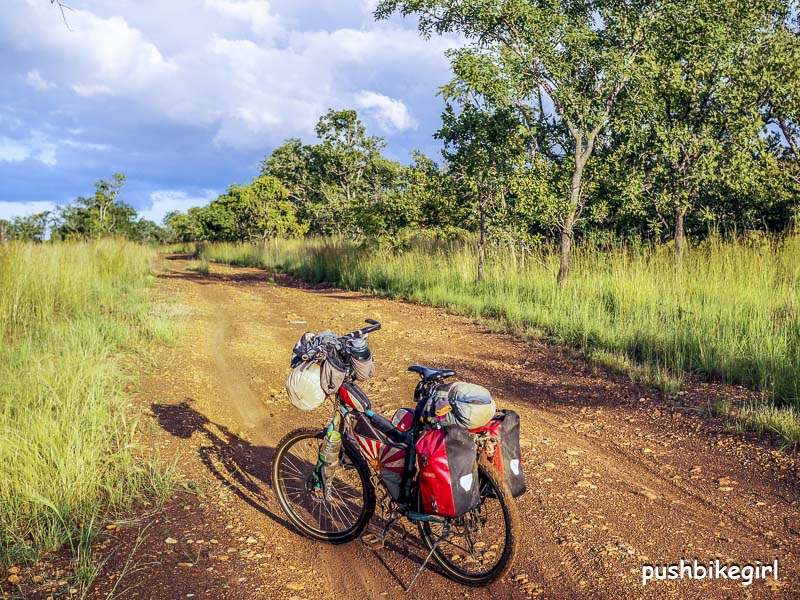
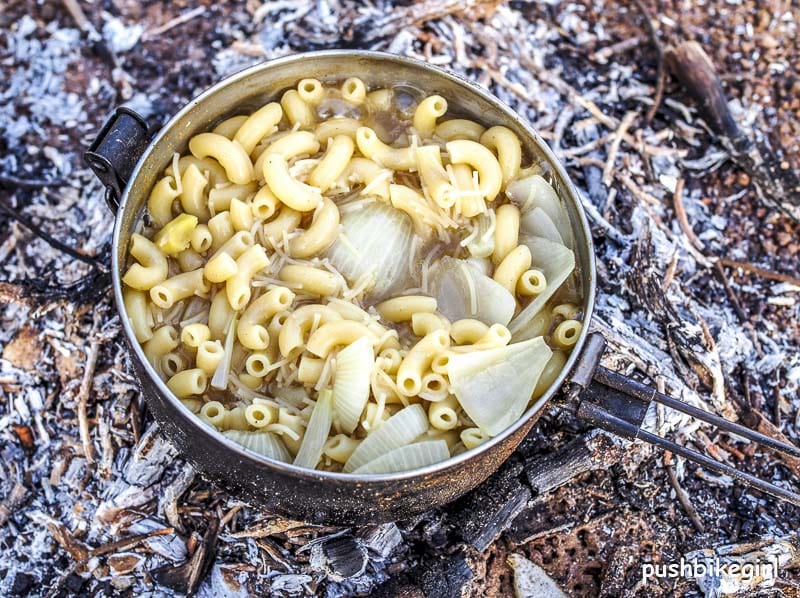
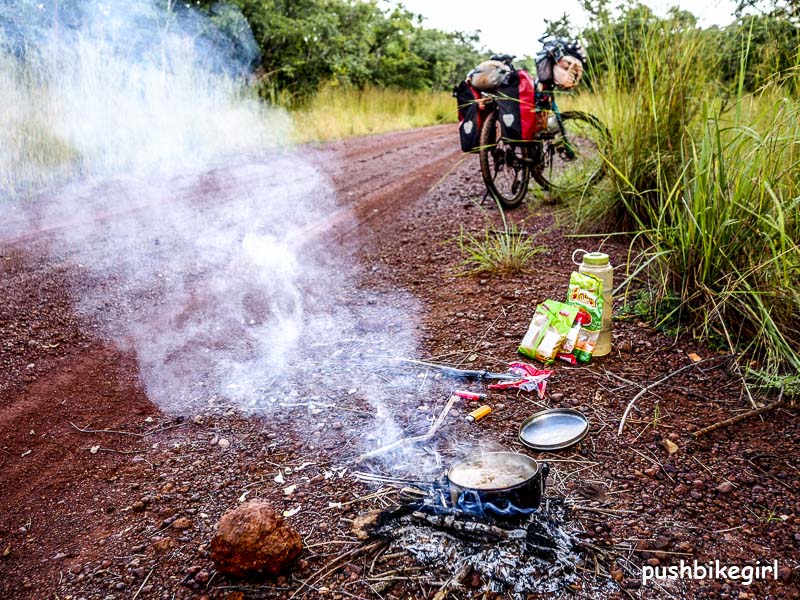
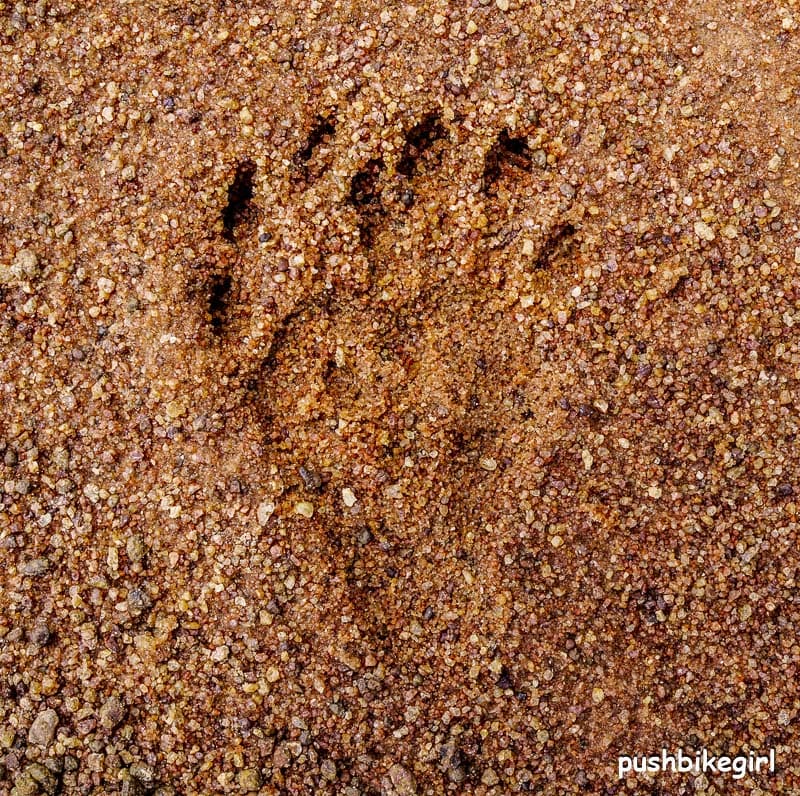
The road was in a terrible condition; I had to wade through knee-deep streams several times, which reminded me of the danger of bilharzia, which is known to exist in freshwater all over Africa. A serious illness.
No amount of worrying about it was going to help; I had to go on. In the evening a man persuaded me to stay in his village. After hearing gunshots of hunters, I thought it is wise to take him up on his offer.
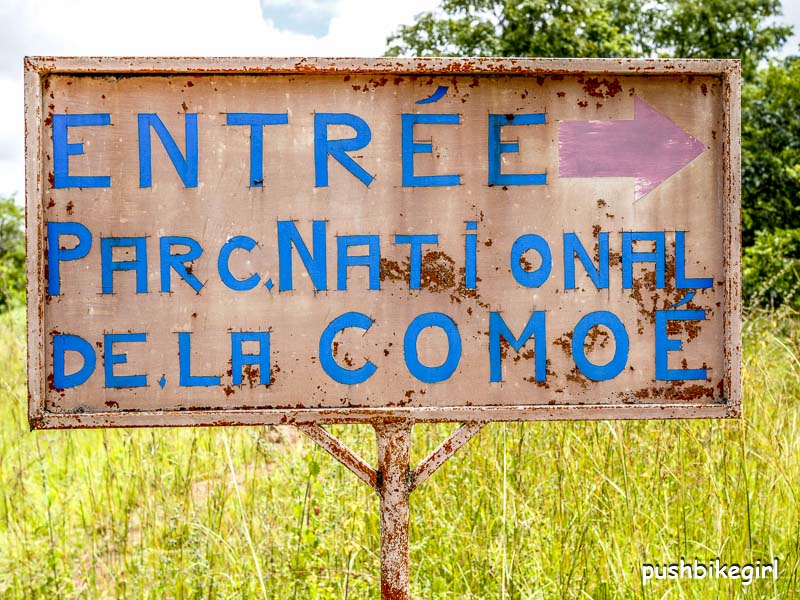
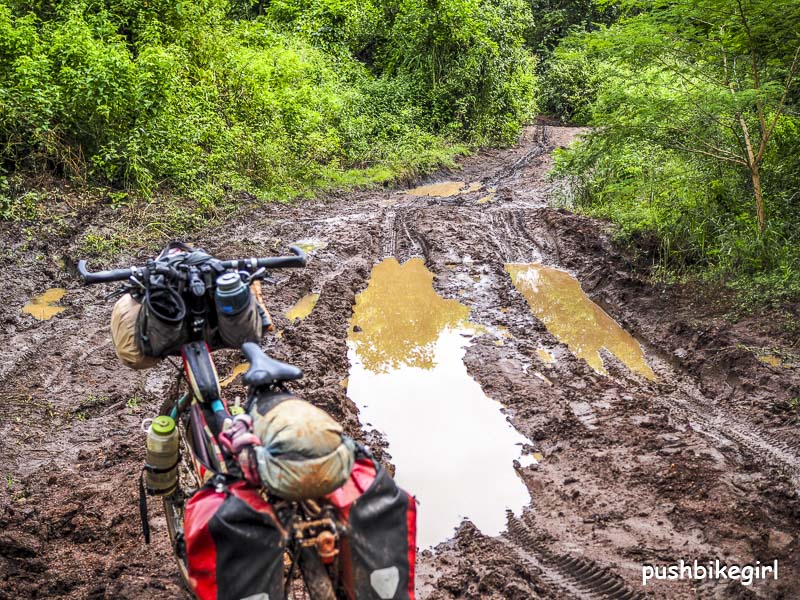
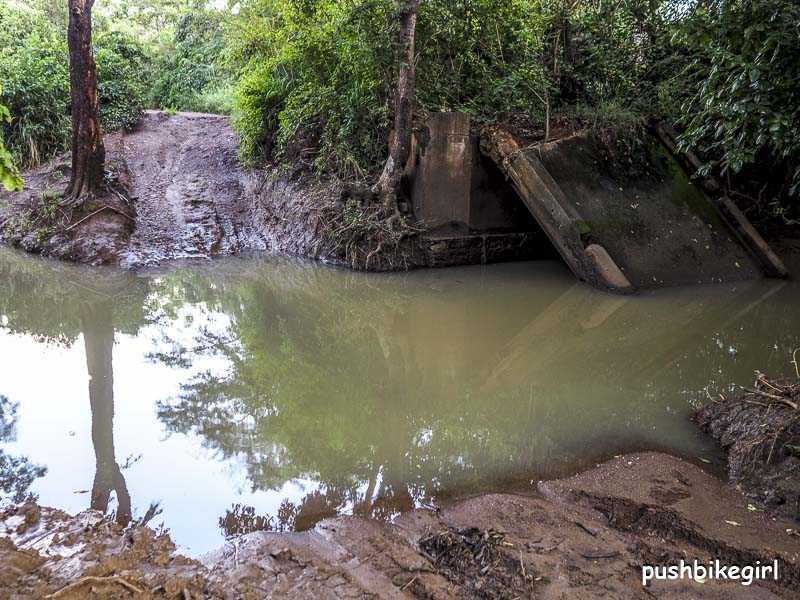
That night a very industrious flea found me; by morning, I was totally polka-dotted from his night’s work. Itching dreadfully without end, it was one of those moments where if I could have, I would have gladly tossed the bike in the ditch and ended my journey.
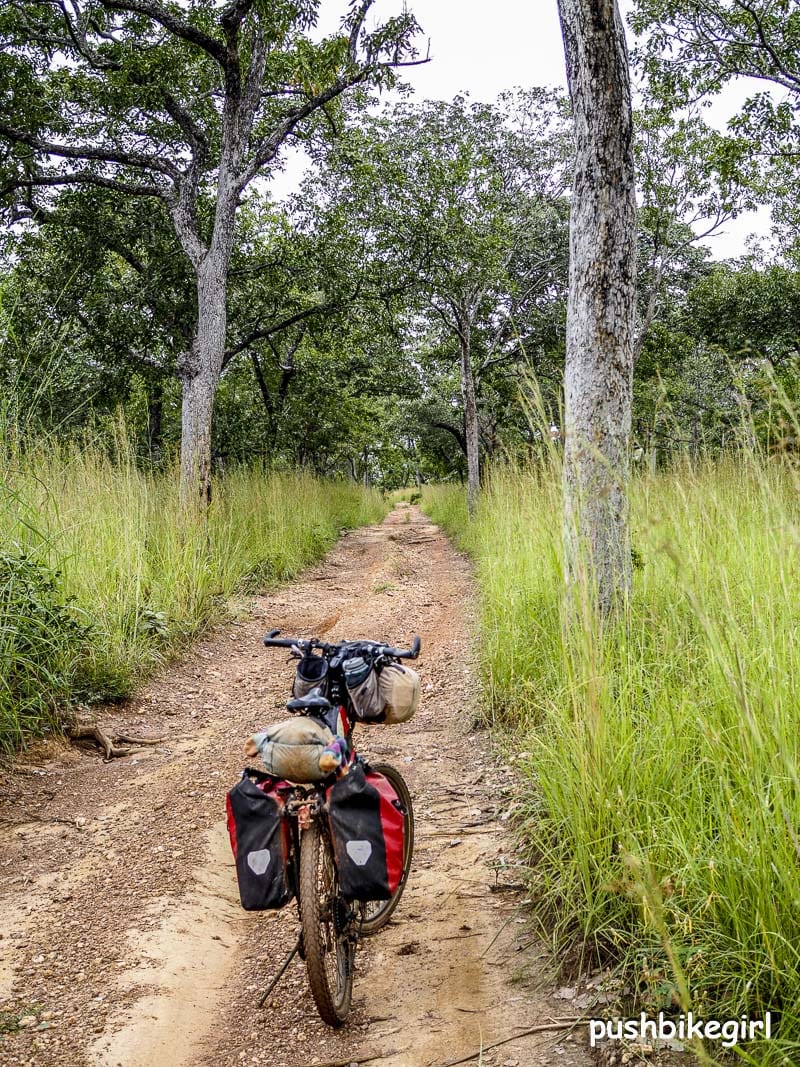
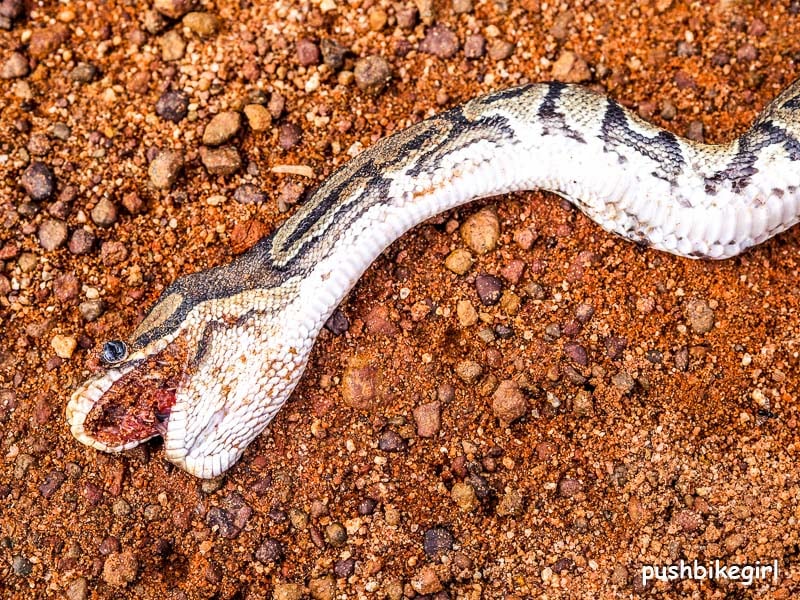
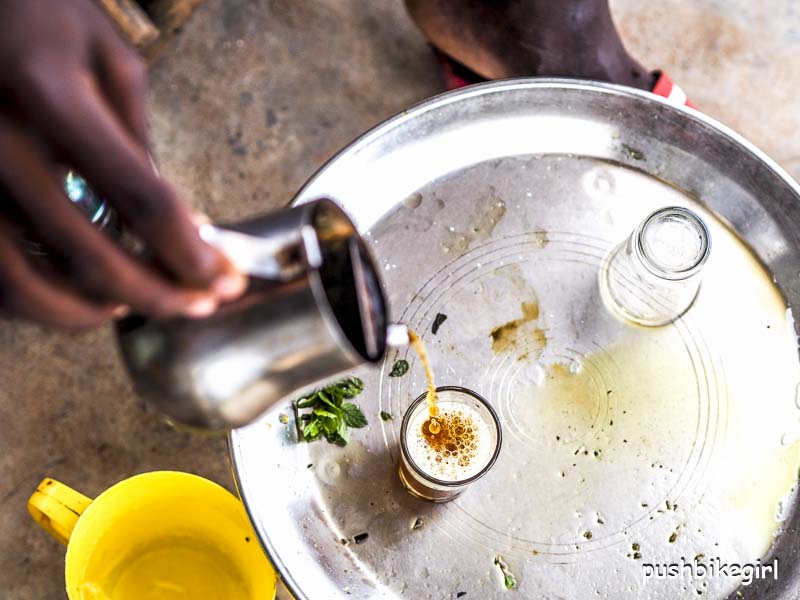
Rice and sauce seemed to be behind me for the moment as the only food available in this area was spaghetti at tea café/stalls. Spaghetti already cooked lay in the water for who knows how long, until a hungry customer showed up. Yesterday’s spaghetti or perhaps the day before yesterday’s, stuck to everything, not just to the pot but to the stove, workspace, floor everywhere it could stick it stuck. In between, there is bare chaos.
Sometimes the spaghetti is fried in a pan with lots of oil. Then either sardines in a tin or just tomato paste is added. But maybe there are only noodles that day, because everything else is just out of stock, although there is a shop on the other side of the road that sells at least onions and eggs.
Of course, this is then seasoned with Maggi, because Maggi comes to every meal in West Africa.
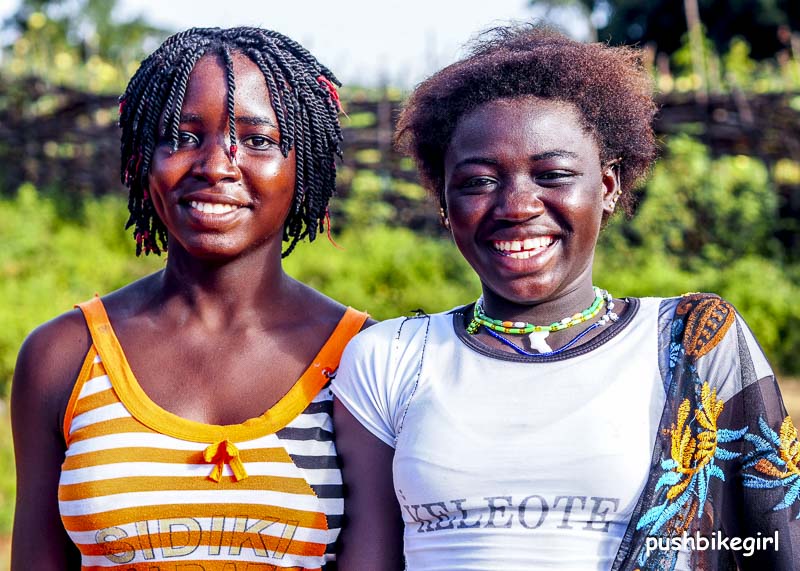
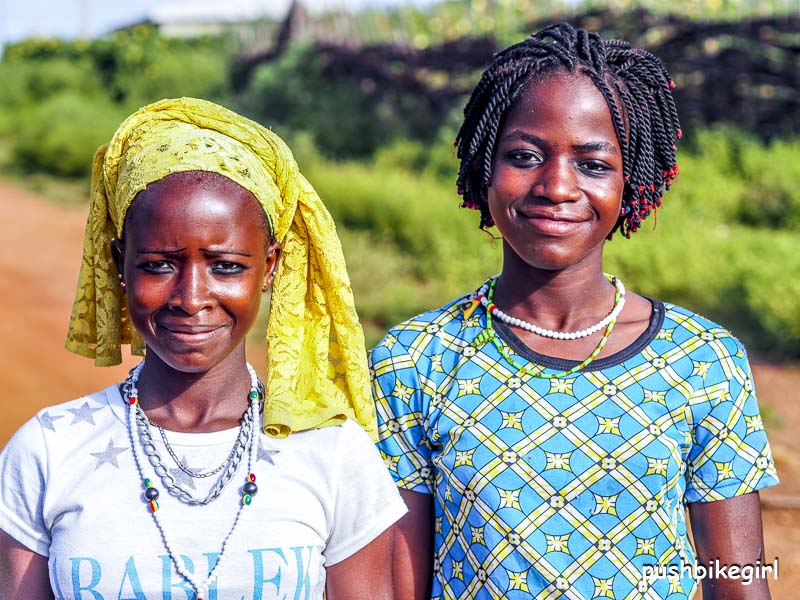
Enough of this! I asked the owner of a stall if I could use his gas stove to cook something for myself in my own pot. As always, no problem.
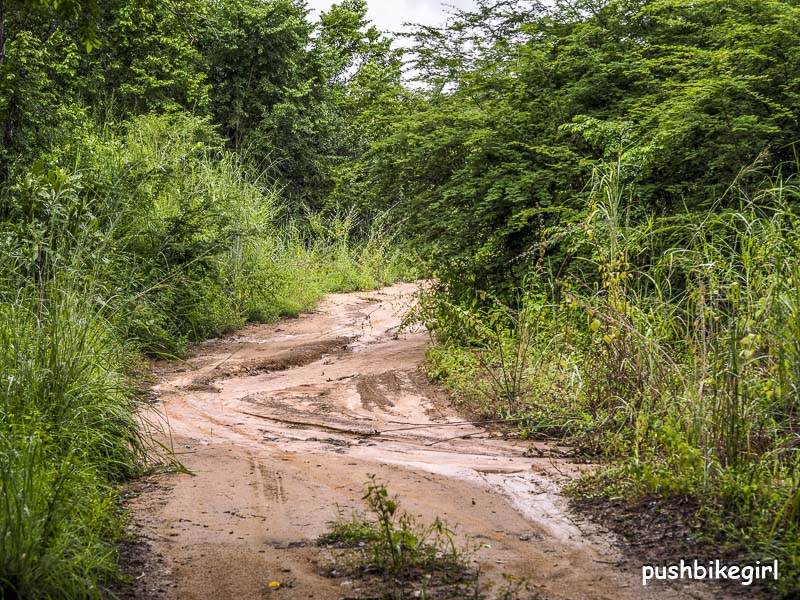
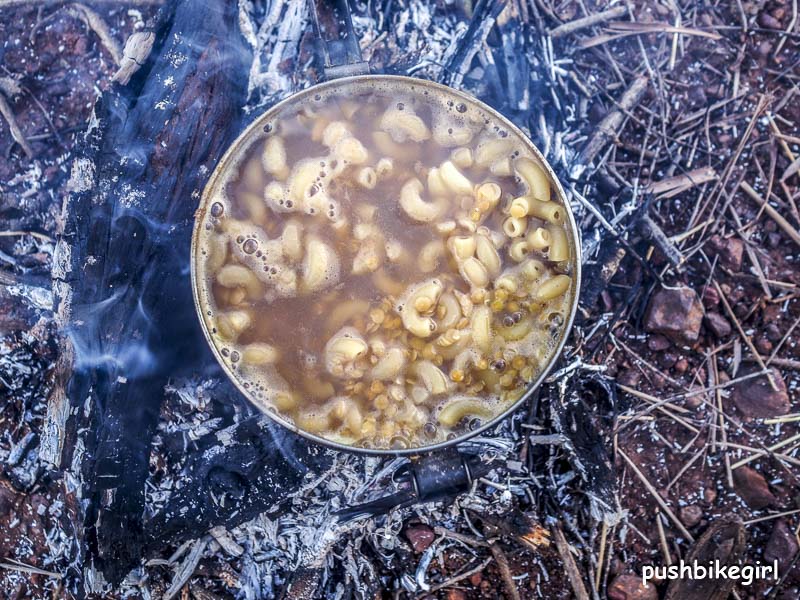
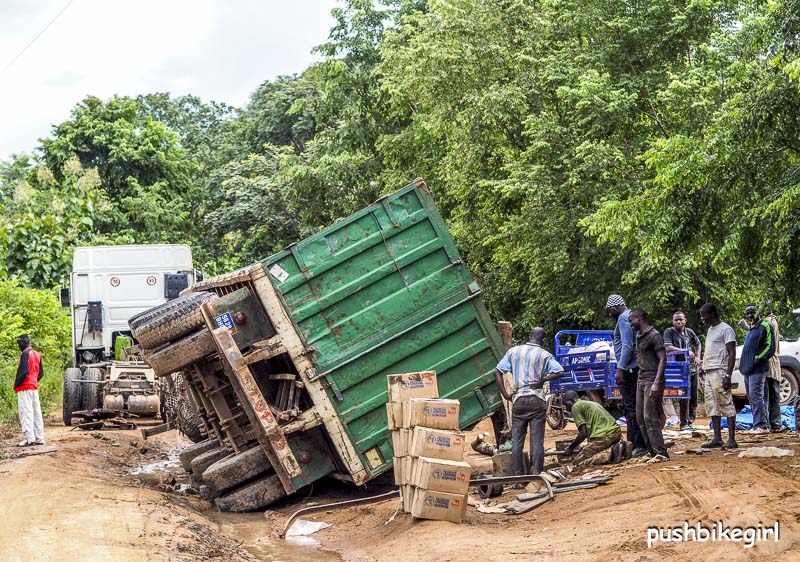
Park rangers showed up to tell me that I was already in the park, and they wanted to see my written permission to travel there. But of course, I don’t get involved in some nonsense like that. There was only this one road, and that was the border to the park.
I would never have believed that the track was so remote, and unfortunately, I couldn’t profit from the park because there was only one track leading in, and it was completely overgrown. Also, there was supposedly only drinking water at one location inside the park and who knows where the elephants would have really been in the end?
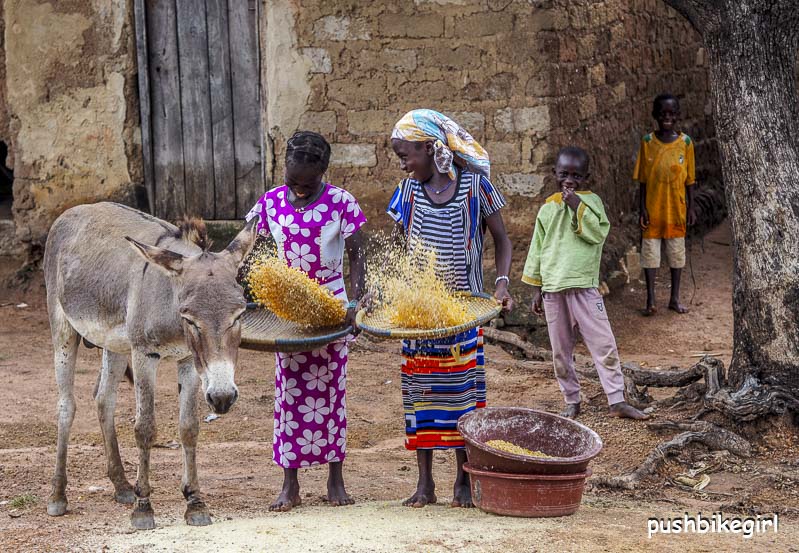
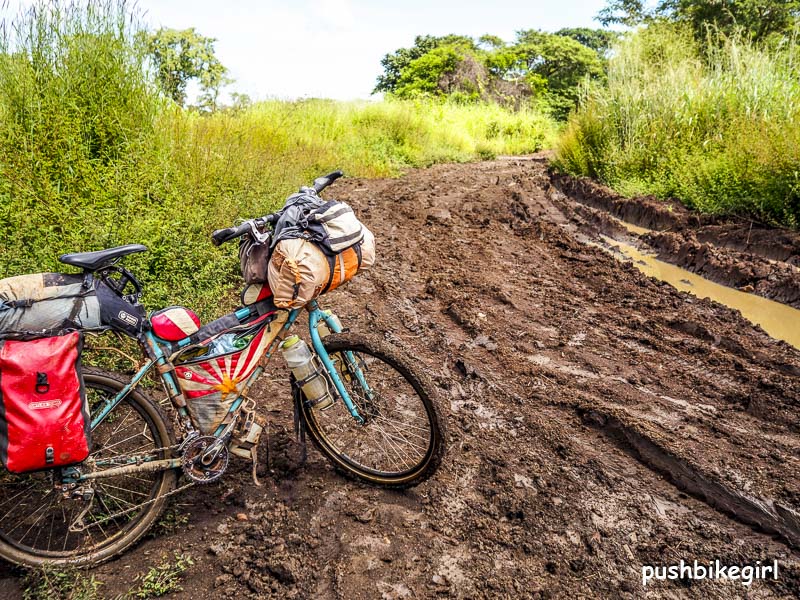
One evening I camped in the high grass, and once again, I heard hunters shooting their game relatively close by. No wonder you don’t see any animals here. On the other hand, it is also totally understandable, because people are hungry.
Hooray, it didn’t rain a drop the whole night, but I woke up the next morning and was surrounded by hundreds of bees, who must have looked at my orange tent as a treat.
Today tents have to look cool, especially for Instagram & Co, and don’t have to fulfill their original purpose anymore, namely to camouflage the traveler and to survive in nature. I hope that tent companies will understand again sometime that green would be the more sensible color.
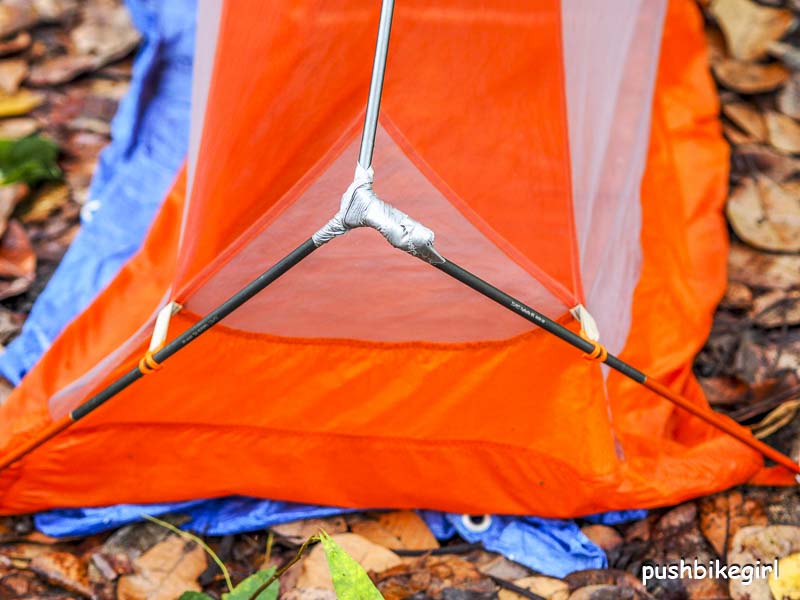
In the morning, I did my number 2 business in the grass; upon finishing, I panicked, having discovered white worms on my poop, but a second later, I saw that a fly was spreading them over my doo-doo in no time at all. One worm after the other. I always thought flies lay eggs, but these worms are born crawling.
Also, pretty crazy that the fly seemed to be there and able to wait for the right timing. The fly must have lurked in front of the tent, thinking pretty sure, Heike needs to do her morning business pretty soon. ?
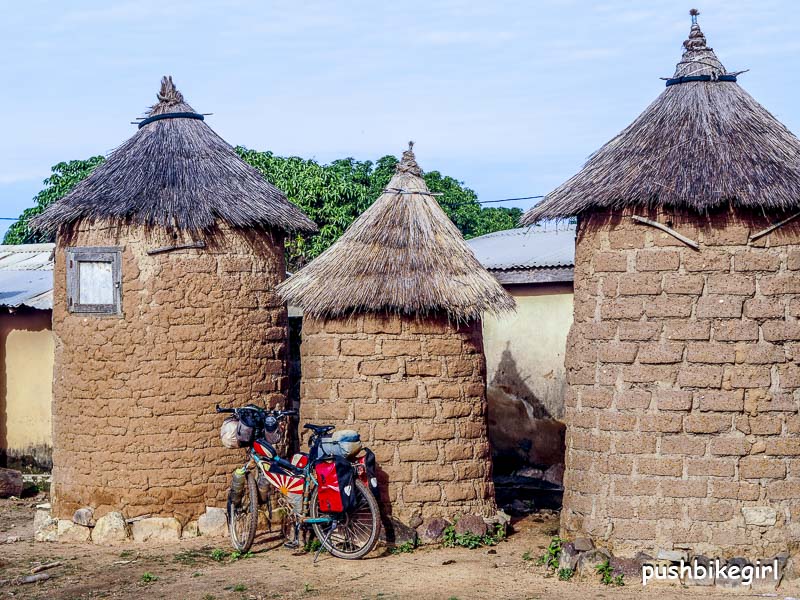
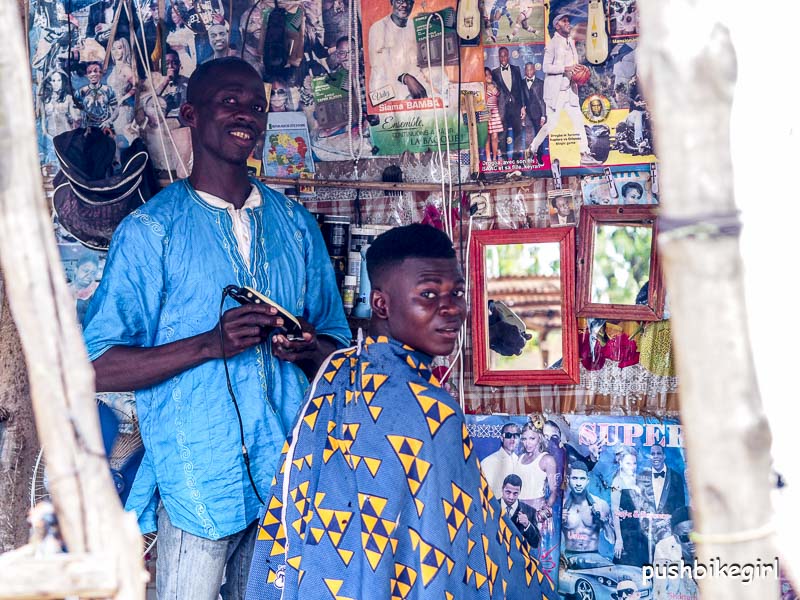
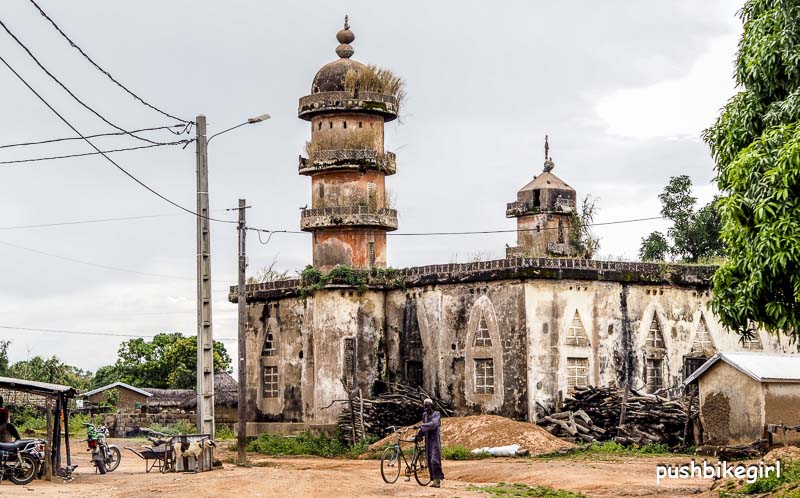
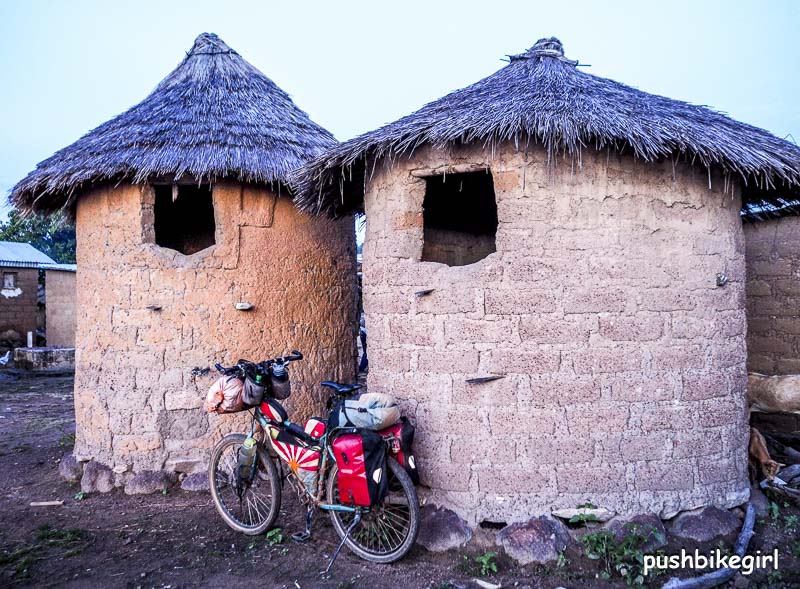
Ivory Coast ended with a night next to a loud disco in another brothel. A shower, tasty grilled fish with chips, and a possibility to wash my clothes and hopefully get rid of the damn flea.
The border police outpost was 30 km before the actual border, and I was glad Laurent, the Frenchman, whom I knew from Morocco, had informed me via WhatsApp that I needed to get the exit stamp in Bouna.
To my great surprise, the policeman at the station spoke a little German.
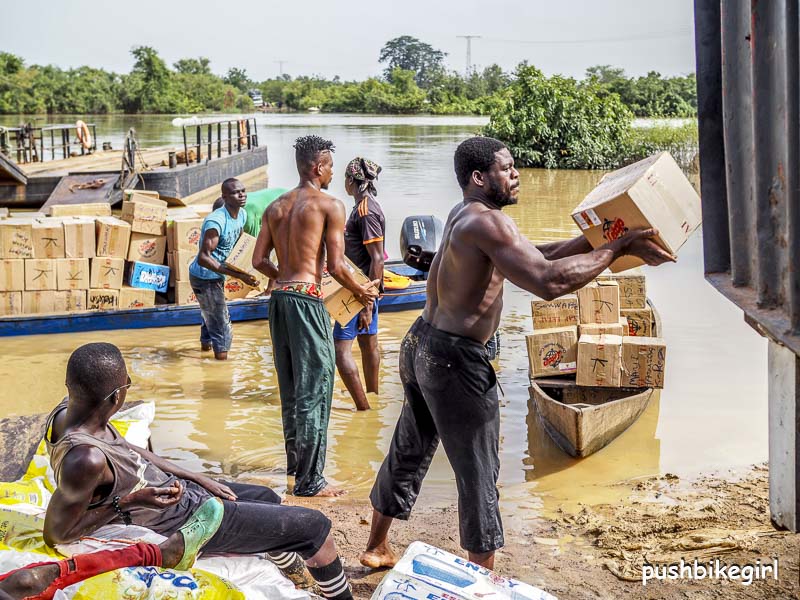
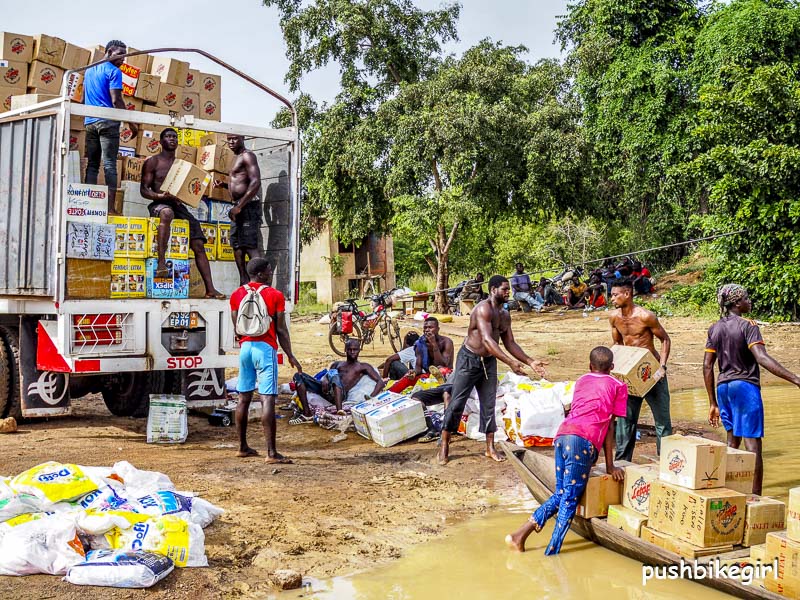
The actual border is a river. Trucks arriving here are unloaded then their cargo is transported across in canoes to be loaded into another truck on the other side.
Yes, all this is Africa.
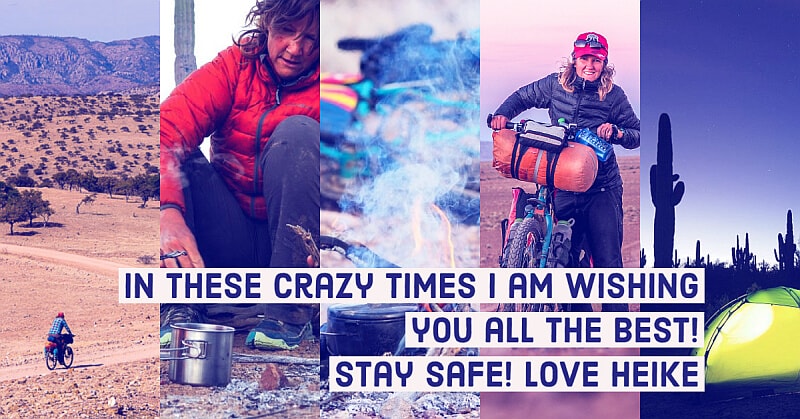
If you liked this article please share it among your friends! Thank you 🙂
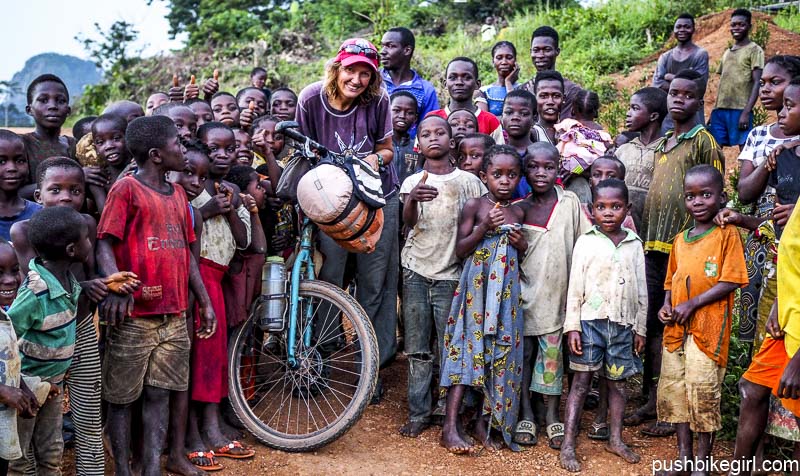
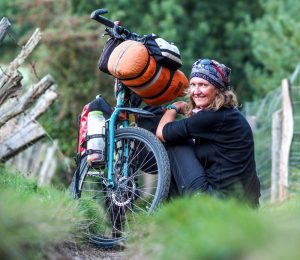

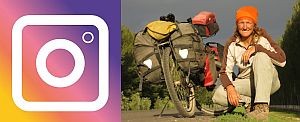
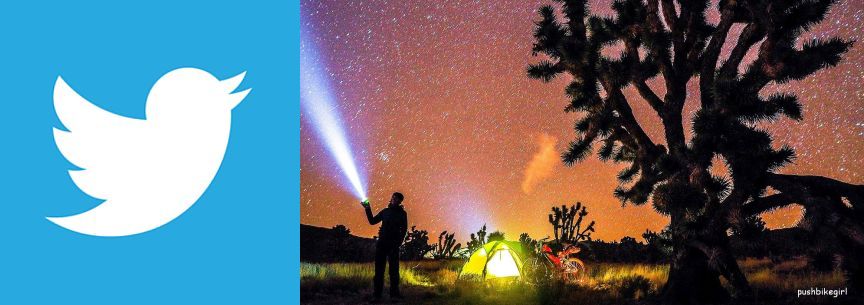

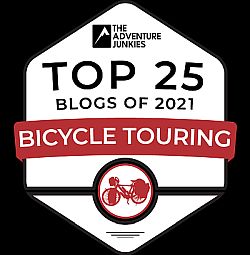
Hi Heike,
Glad you are doing allright. No fun having food poisoning and being attacked by a flea. Hope you left the flea behind you by now.
Wondering how the corona virus (covid 19) is affecting you and your travels. Here, Holland, bussinesses are mostly shut and people stay indoors as much as possible.
Anyways, stay safe and happy travels,
Inge
HI Inge,
thanks very much!
I left Africa – my articles are not up-to-date right now.
So I can not tell you how the situation is in Africa right now.
I am in quarantaine for another while …
Best greetings Heike
Hi Heike,
Ah, guess I missed something somewhere ?.
Hope you are okay and not getting bored out of your skull.
Stay safe, don’t get ill and hope you will be able to get back on the road reasonably soon again.
Inge
THank you Inge, and all the best for you too….
Best greetings Heike
A fantastic blog and photos – puts mine completely to shame. I hope to have a shorter ride in West Afica next year so very I teresting to read of your experiences.. Stay safe!
😉 THANK YOU DAVE 🙂
Thanks for the interesting post as ever, Heike. I hope you are surviving lockdown back home ok at the moment, and everyone is healthy. There’s nothing like being stuck in one place for a while to reignite the urge to get moving again. I imagine it will feel extra sweet when you’re on the move again, whenever that may come. Stay sane in the meantime 🙂
Big thank you for your great compliments Vinnie,
I am actually on the go again – but kept in quarantaine – like so many others.
I am in Colombia and just started out a new adventure……bad timing I guess.
BUt I am positive – it will all work out….
Stay safe, Heike
Oh wow! Exciting! In that case, I hope you have somewhere comfortable to wait this out, and that you are still managing to get something out of this. Luckily we know you are blessed with plenty of mental fortitude! I’ll look forward to your stories from a brand new continent once the world starts opening up again, as a sign of all our freedom being restored 🙂 Take care
Always great adventures you share with us Heike, many wish they can do what you do. But life has it’s own path for most and limited time to do such things.
Stay safe and healthy
If you ever contemplate less travel on two wheels you should consider Ted Talk, a short documentary or even chase your dream type of speech.
It would be inspiring I’m sure 🙂
Dave
Big thank you Dave!
All the best for you, Heike
You tell a charming tale Heiki,thank you for your candor and insight. Your photo are so beautiful and evocative, one can almost feel the breezes and the dirt underfoot.
Thanks again for sharing your travels
Big thank you Pete,
Cheers Heike
Not sure what to say, Ivory Coast, seemed to have been more than challenging, for you or anyone. At the same time your fabulous eye and talent as a photographer, seem to make where ever you are wonderful.
Stay safe, best wishes.
Hi Heike, so enjoyed this blog. Pictures and story were amazing, pictures beautiful!! You are an awesome woman dealing with all that inconveniece and dirt/mud, not to mention what you have to eat!!! Stay safe and healthy.
Thank you Suzanne, stay safe yourself…..best greetings Heike
Heike: it seems you are in Colombia? Did you take the same bike with you? Your blog, as always, is excellent, with the loveliest photos. Thank you. Ian
Once again Heike your photos and journals are just mind blowing.
Big thank you Dan, it means a lot to me that you are still following my travels.
Sending a big hug to both of you….
Best greetings and stay healthy, Heike
Thank you again Heike for a marvelous tale of adventure and your beautiful pictures. You seem to bring out the best of your subjects. Keep safe and healthy. Hope you will be out of quarantine soon to return to your passion.
Best regards,
Awesome photographs… I LOVE the colours in them – so rich and vibrant.. I want to go there!!!
Big thank you Debbie – cheers Heike
Heike,
With all the COVID scare and traveling restrictions I hope you’re back home in Germany now safe and healthy.
The world doesn’t know how this may change the globe for travel but worst case scenario, if travelling is to restricted, always remember you have accumulated a treasure chest worth more than gold and jewels through many miles of memories that know person can take from you.
Amazing stories and great photography to go with it. Your straight,honest and unflinching reflections on the humanitarian misery and the wider reasons and implication of it all are as refreshing as they are compelling. I am there with you in the rain and the mud and the rice food for the 100th time. Thank you!
Thank you Petter!!! Best greetings!
Heike